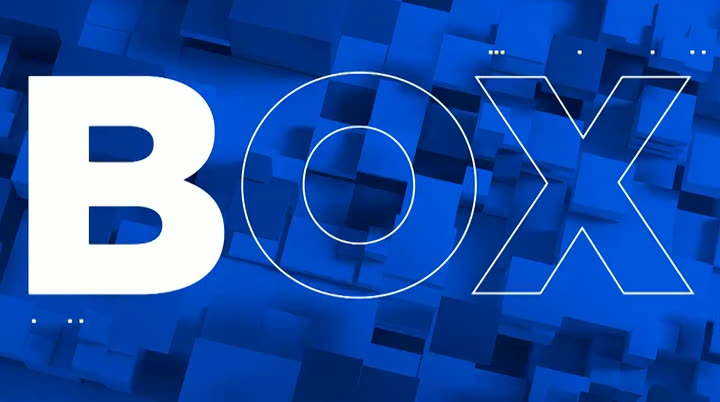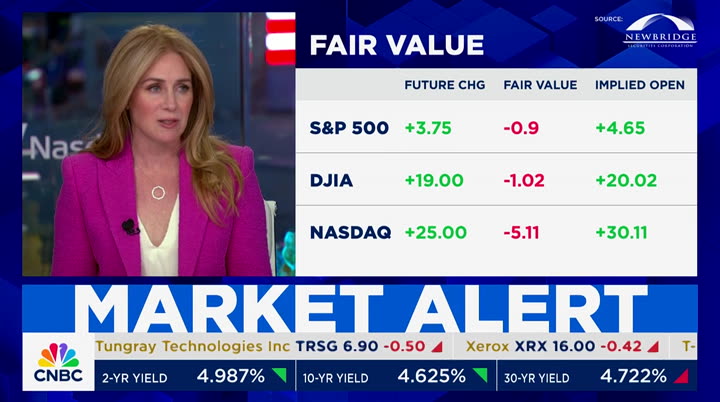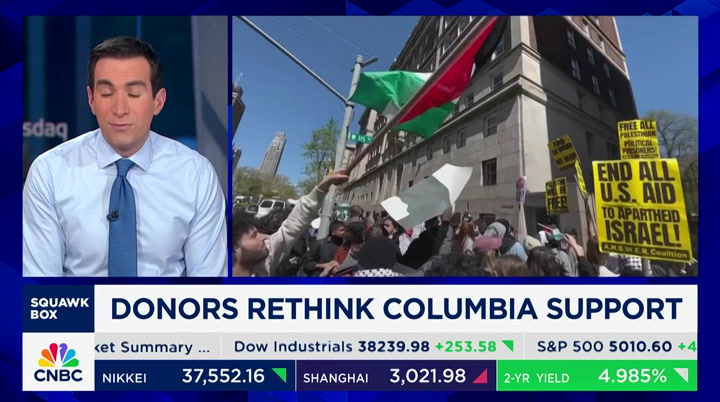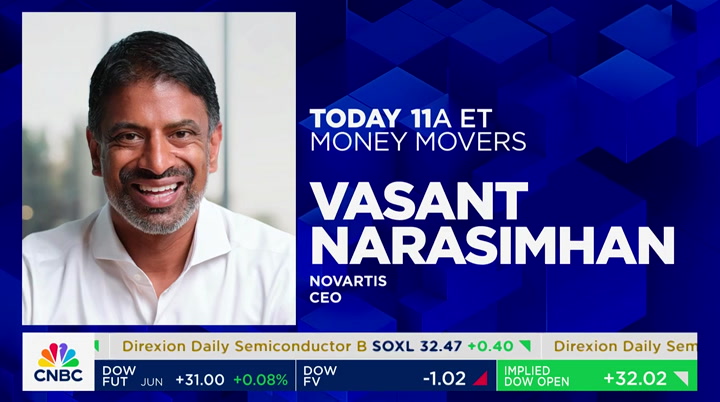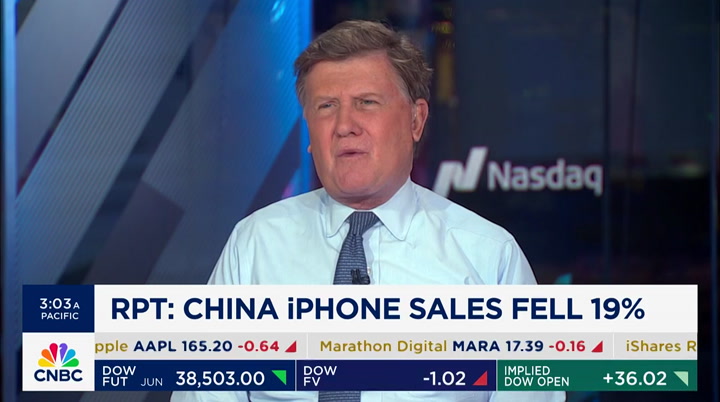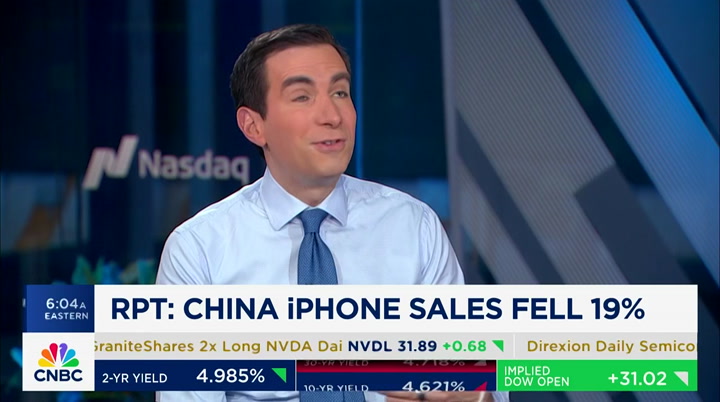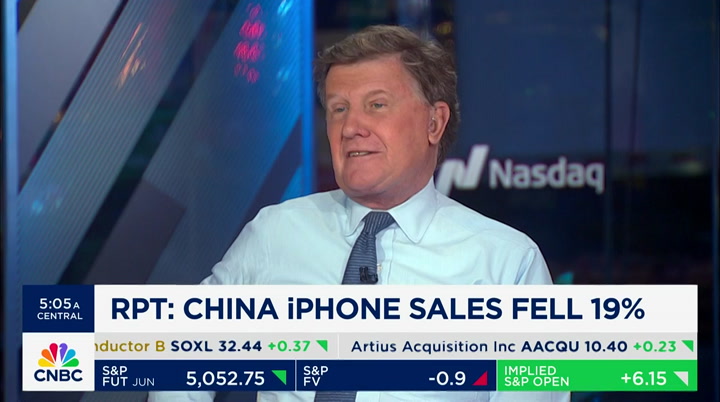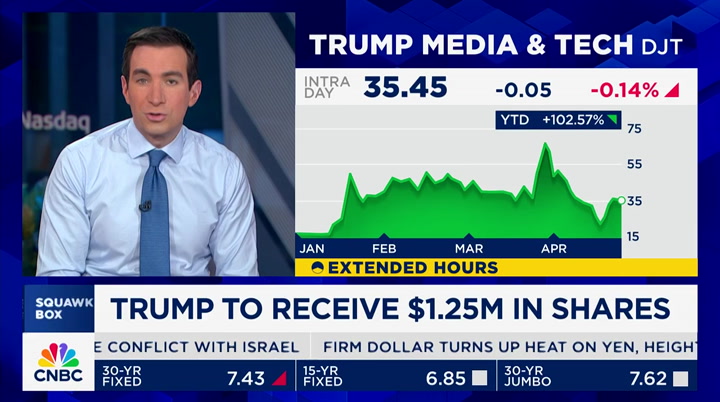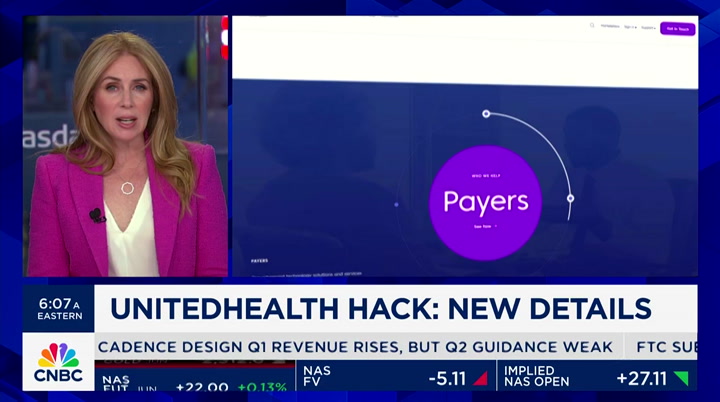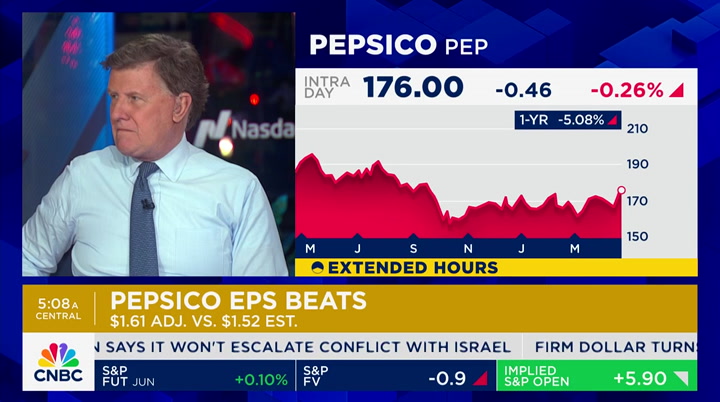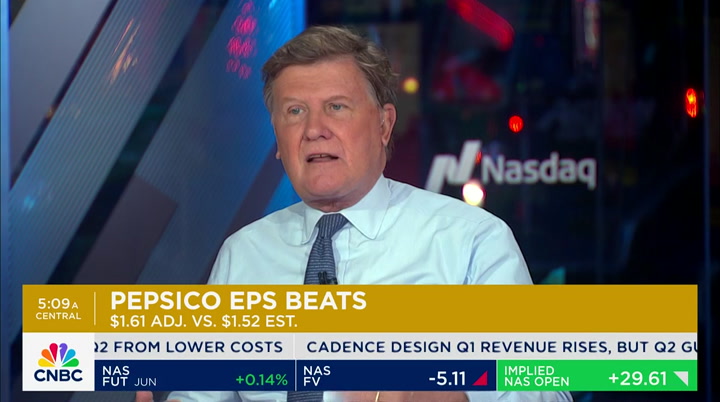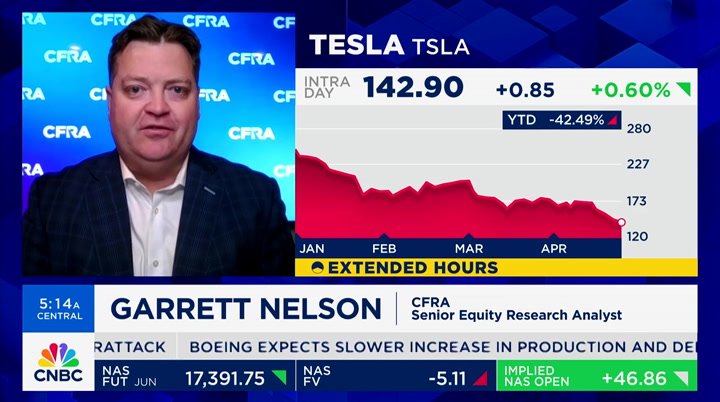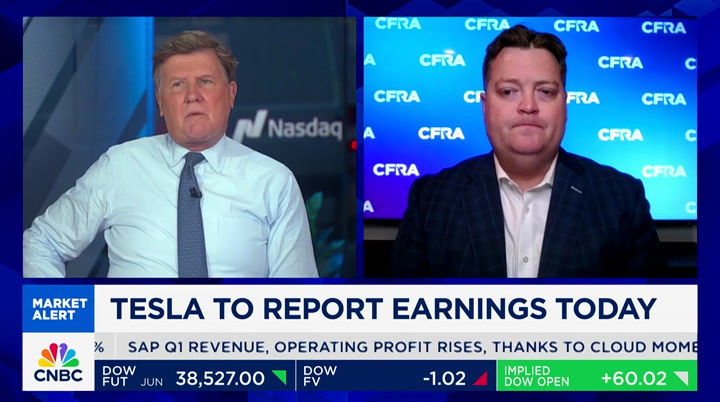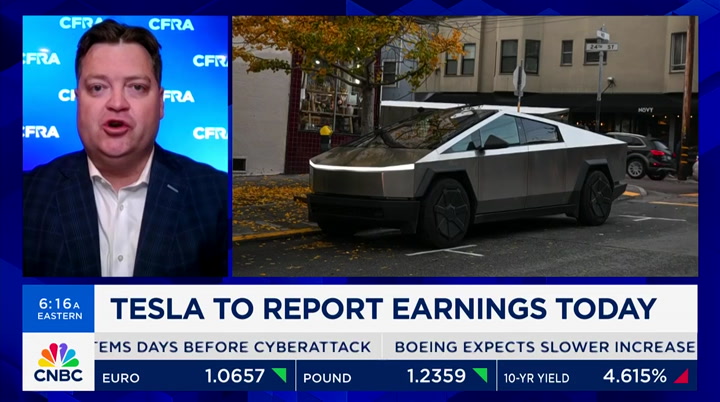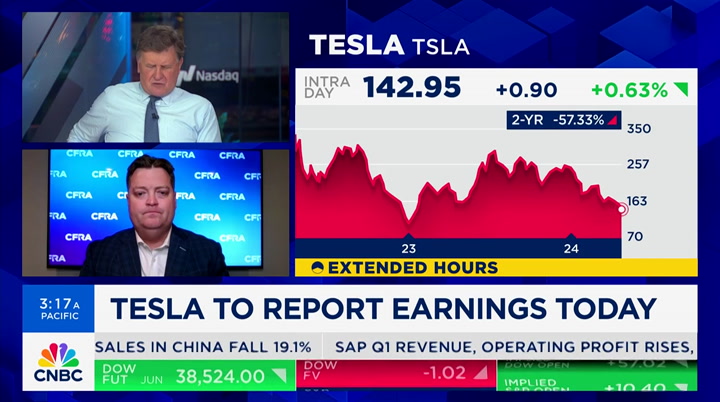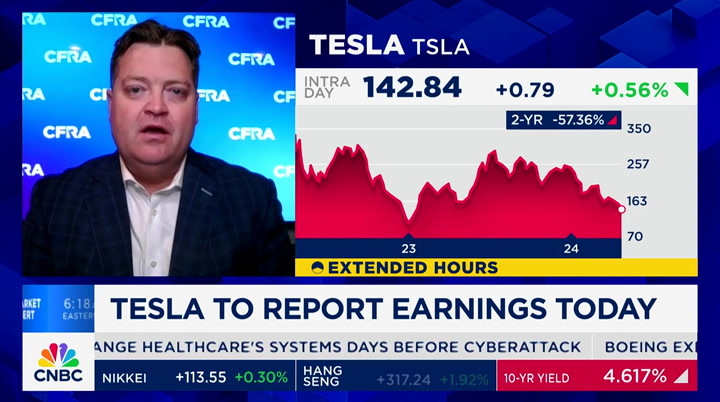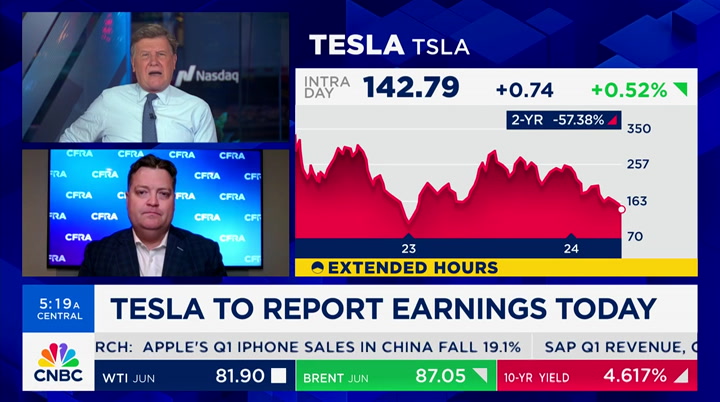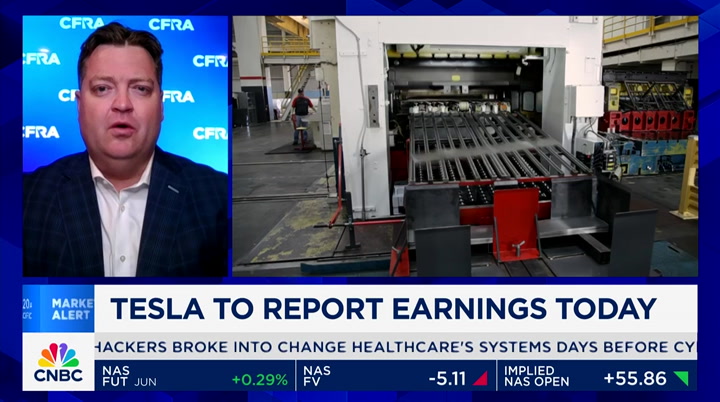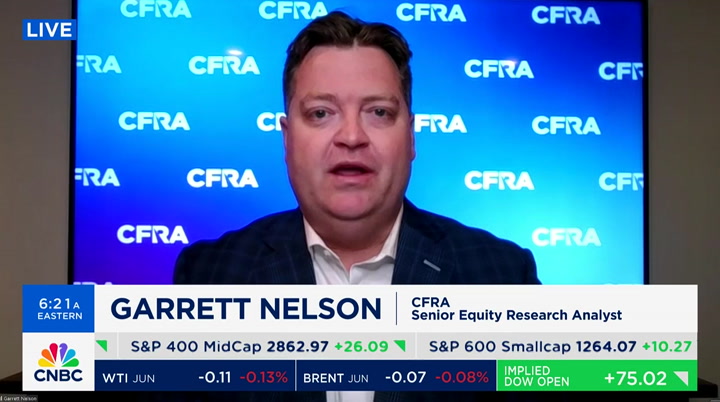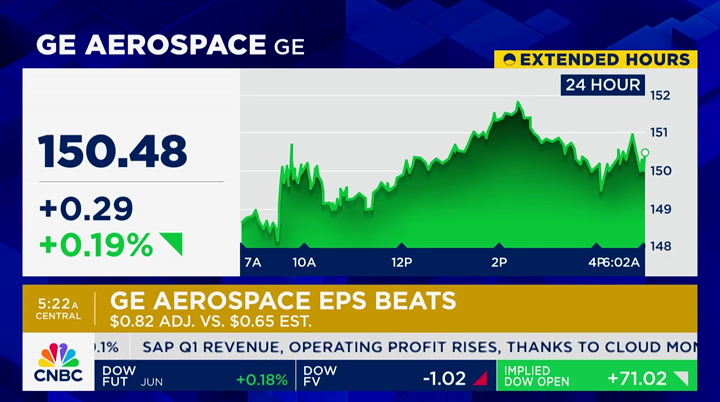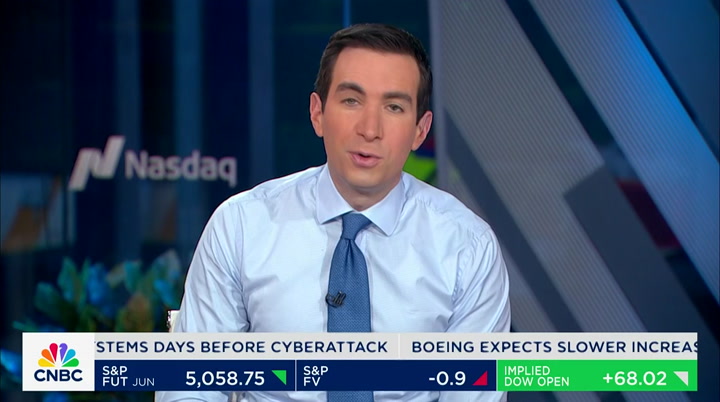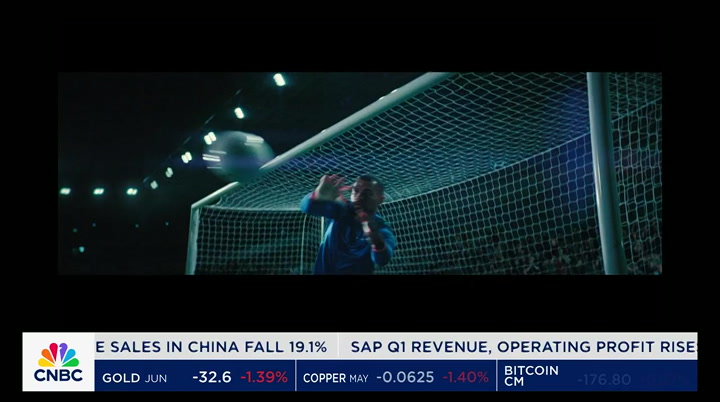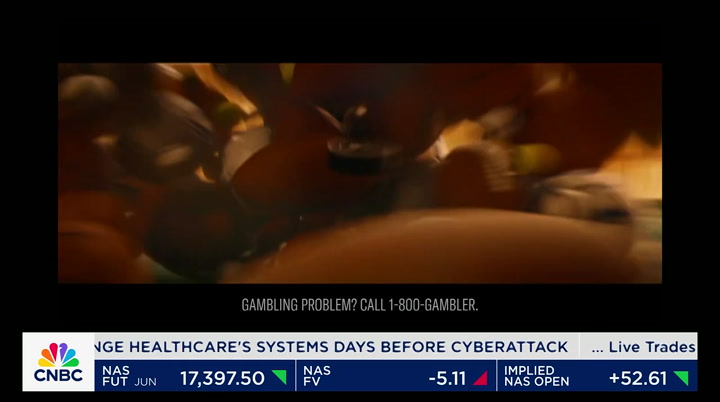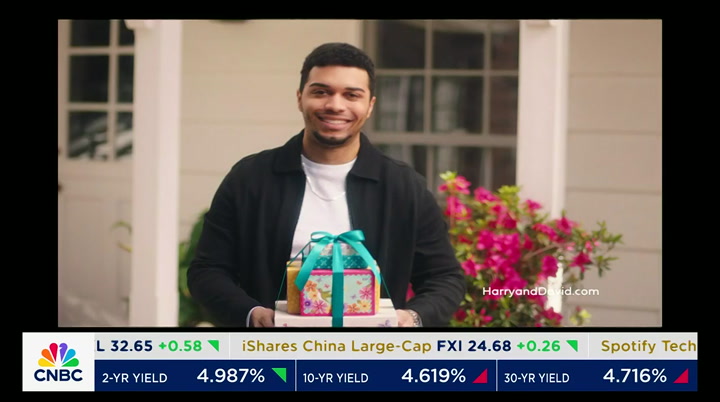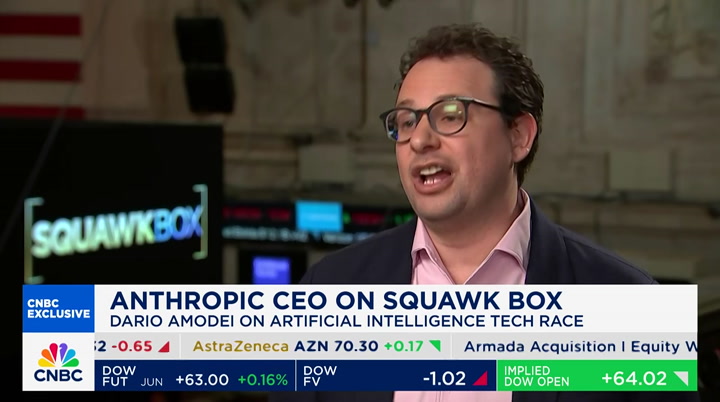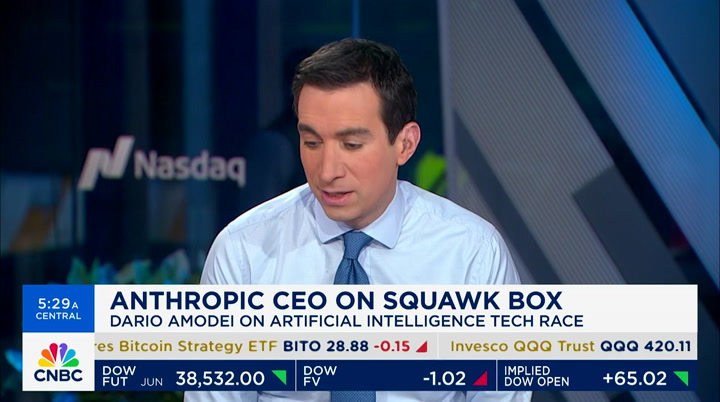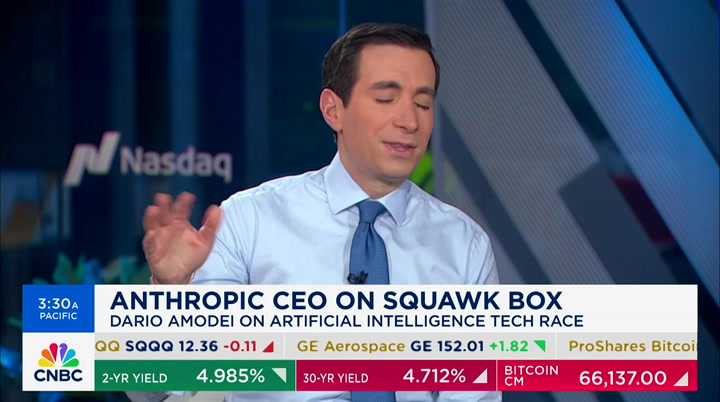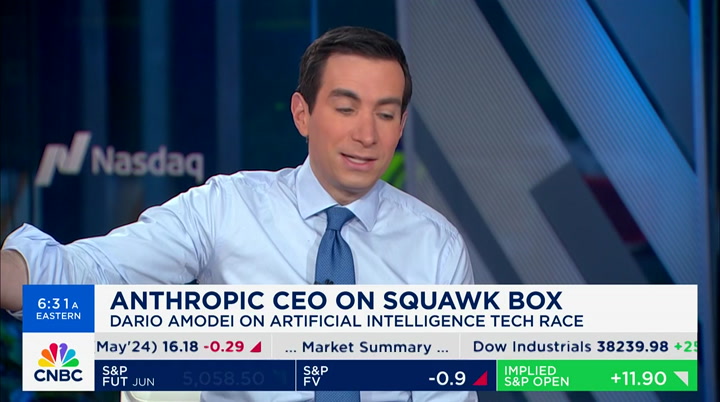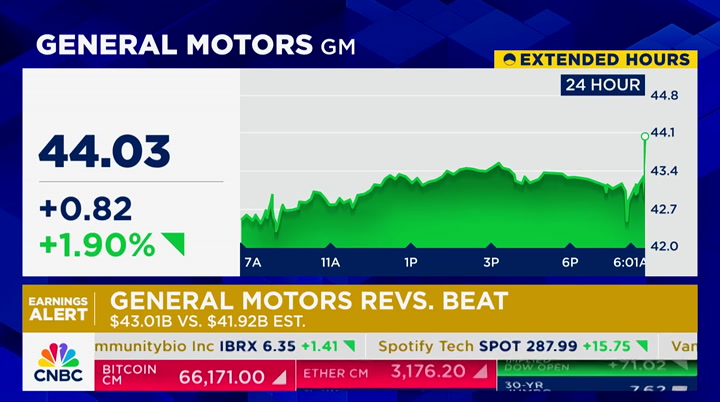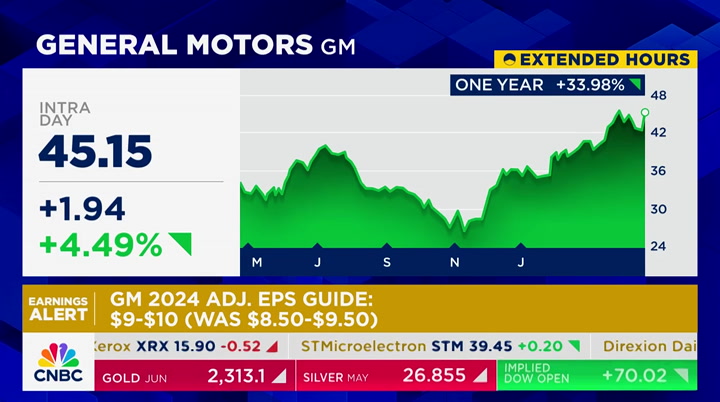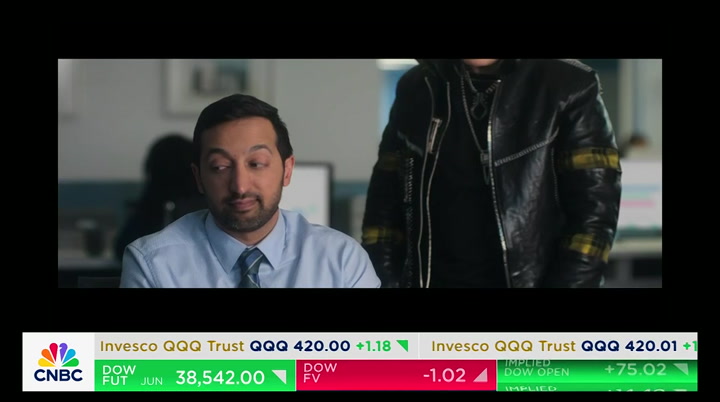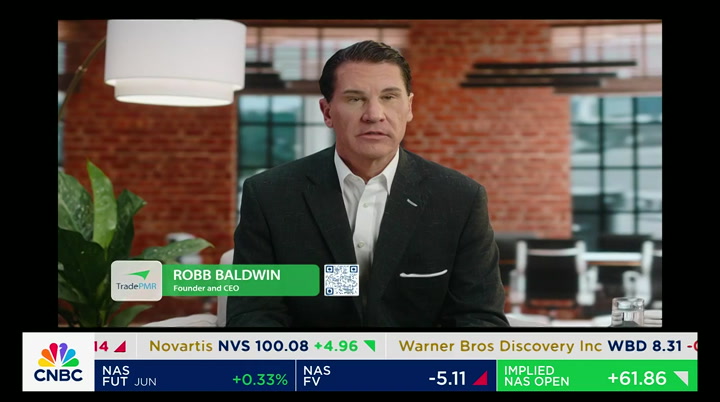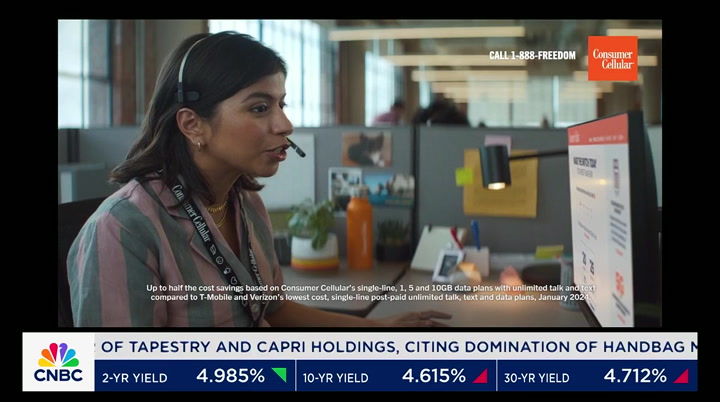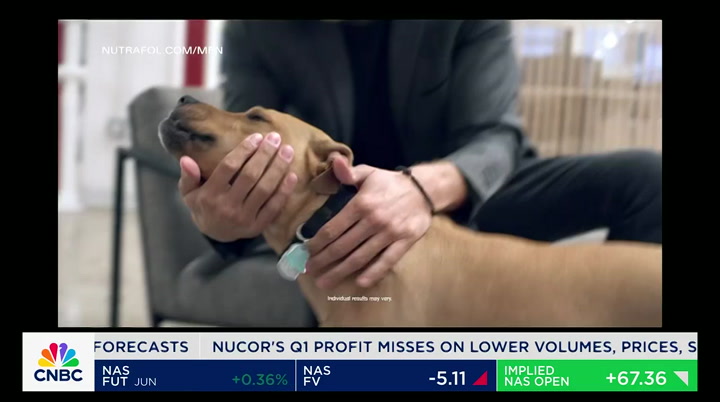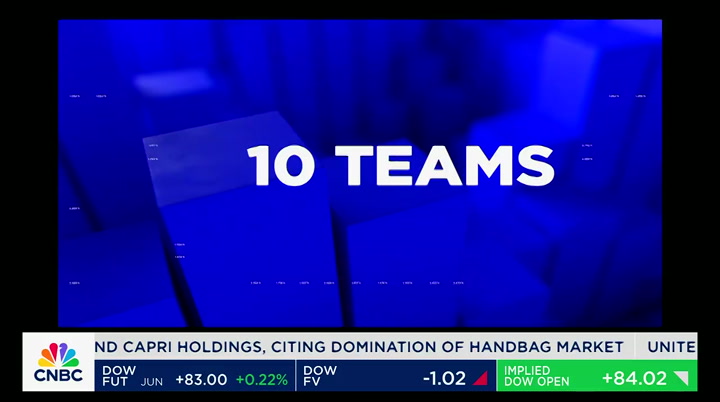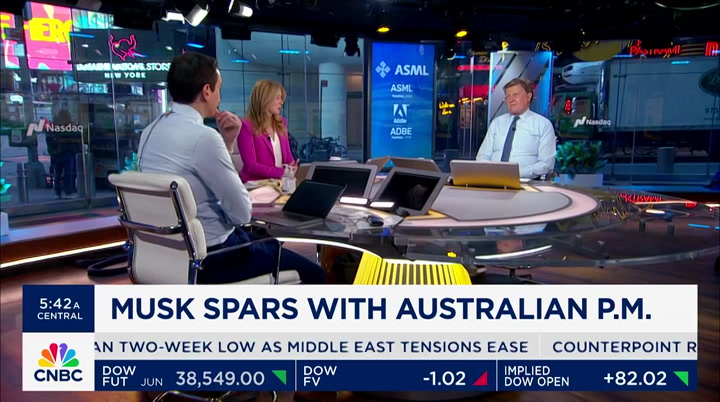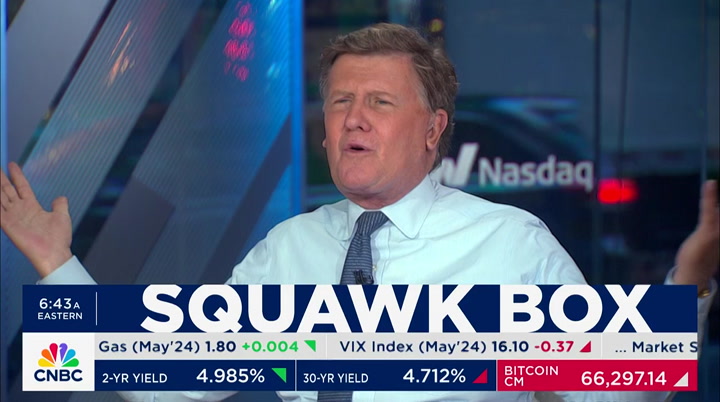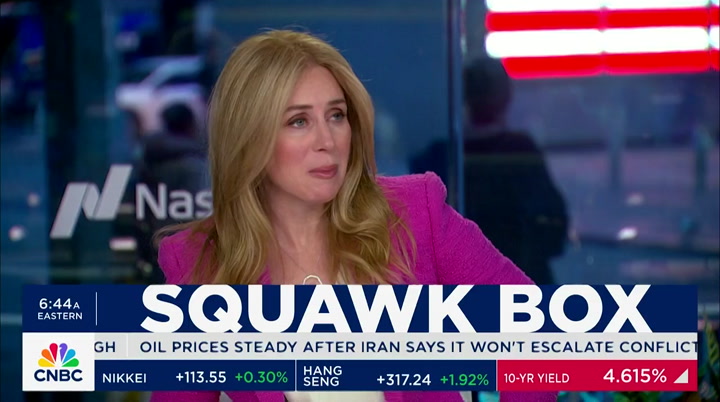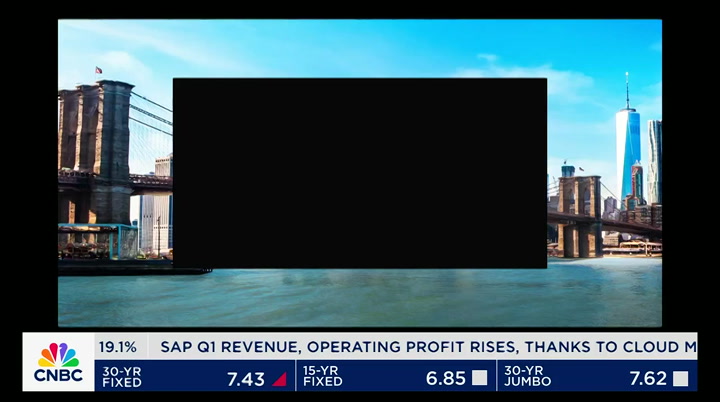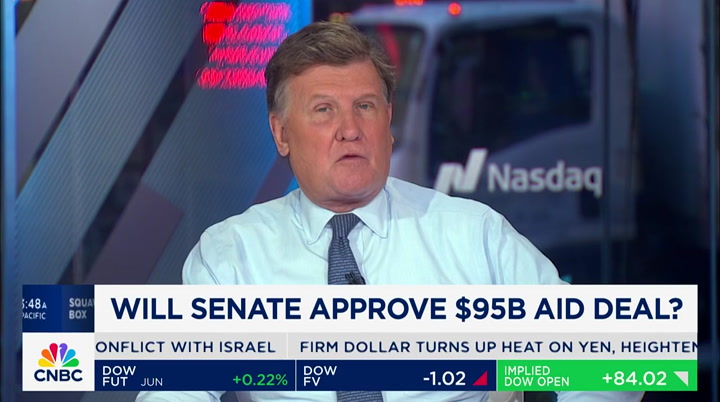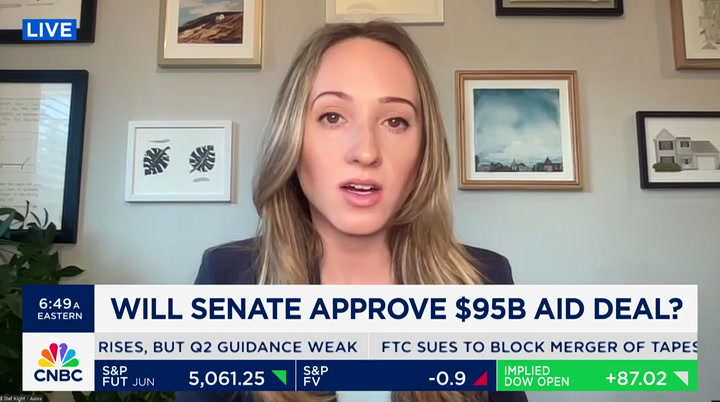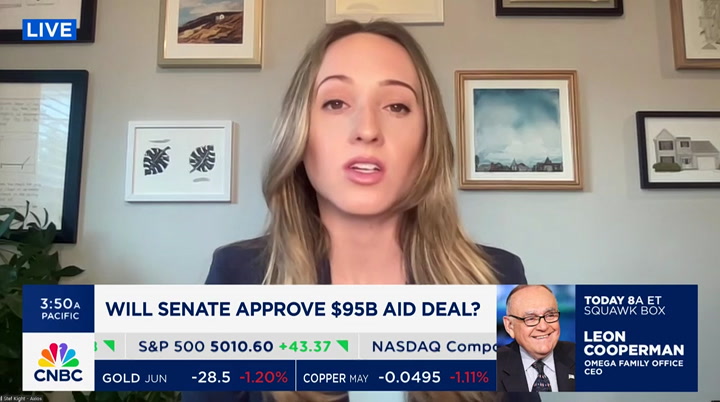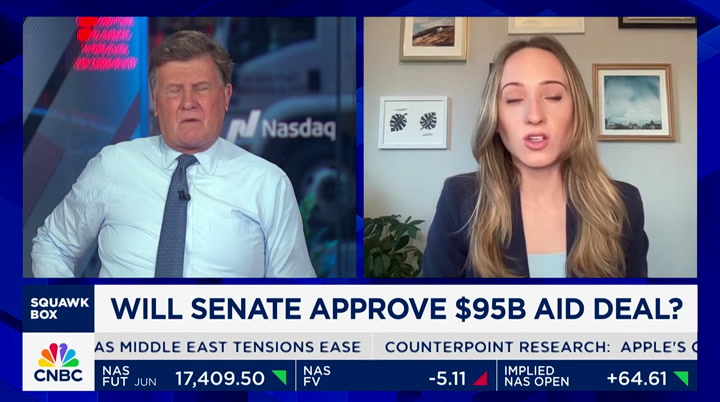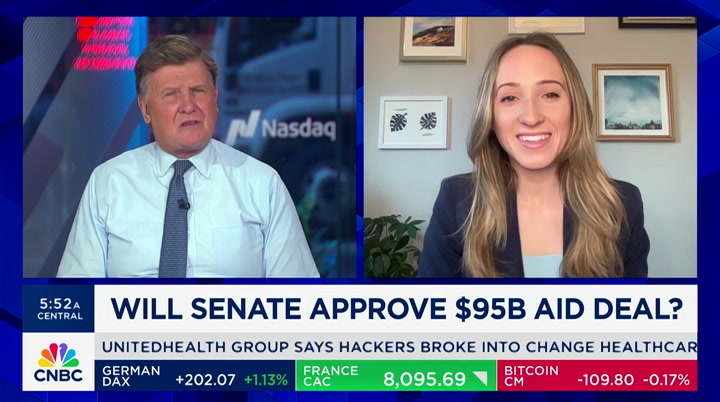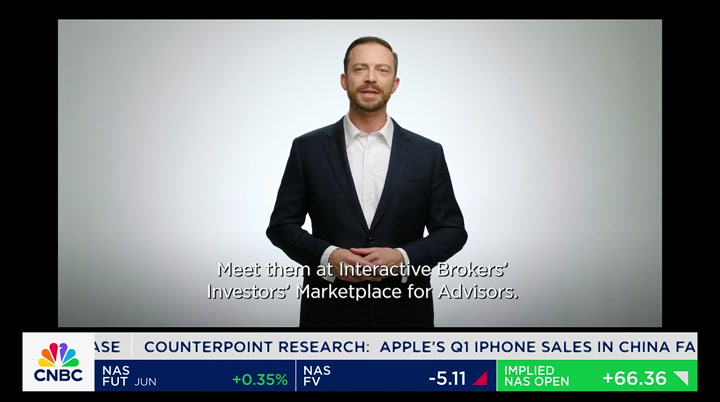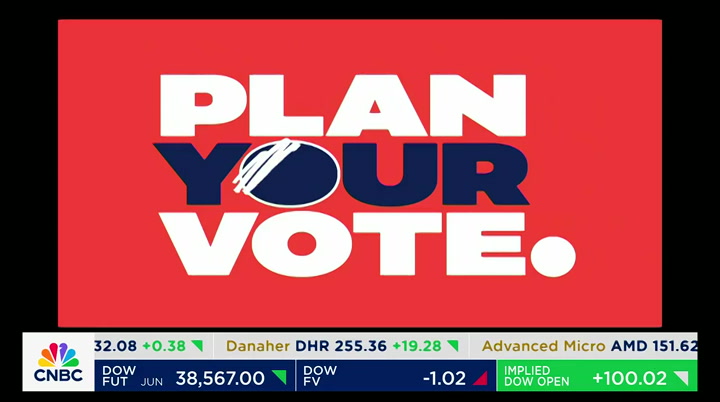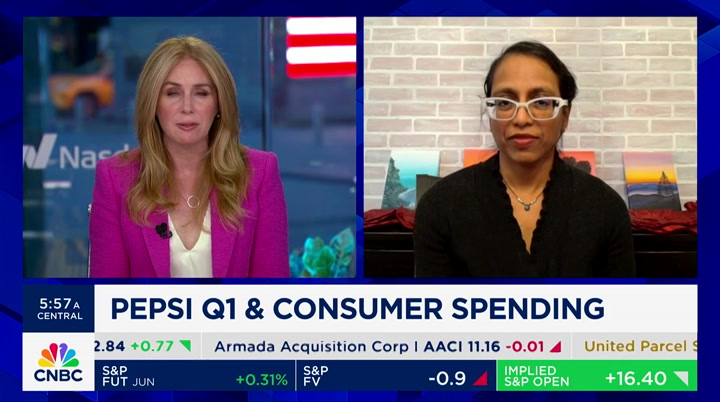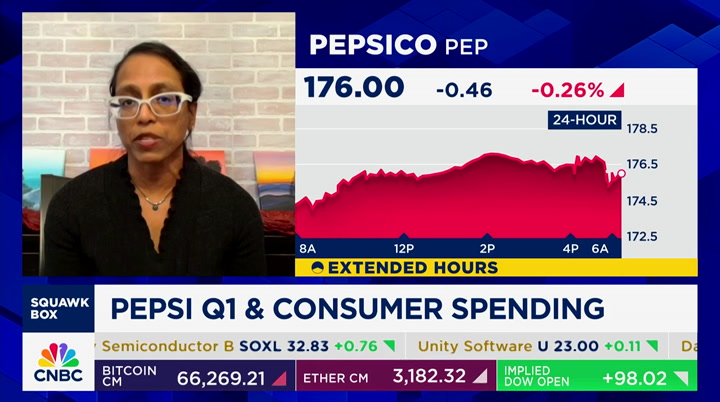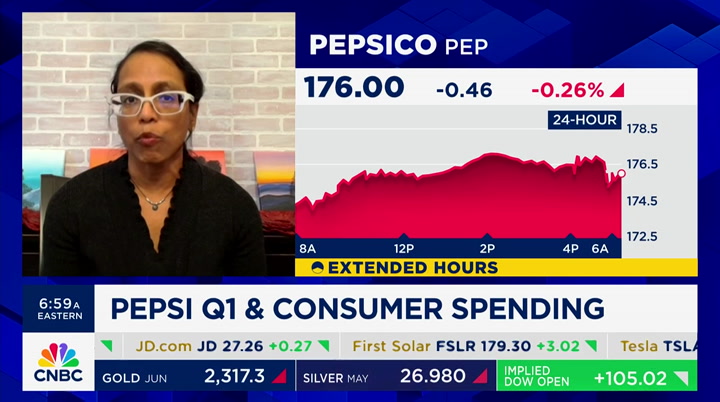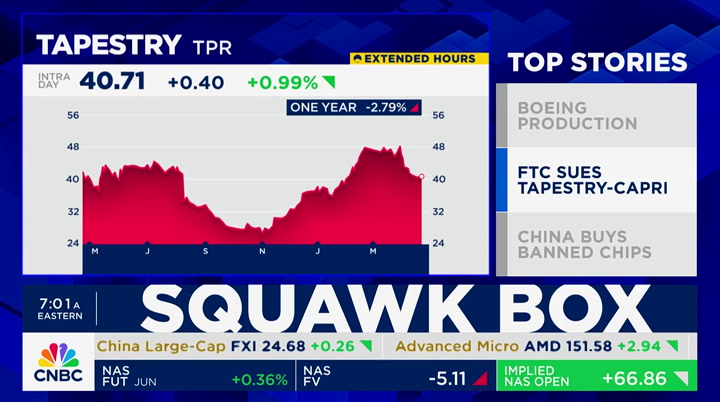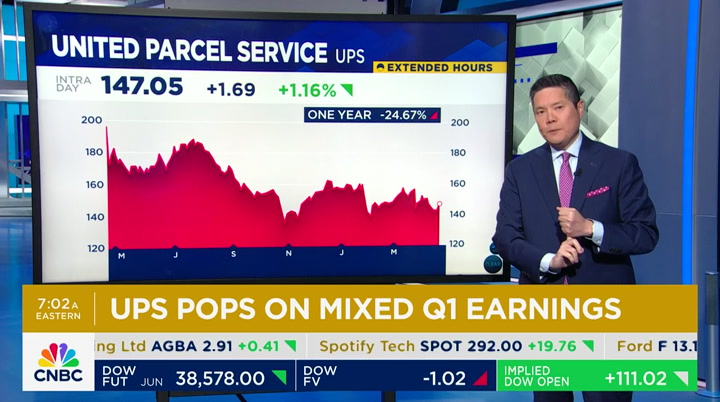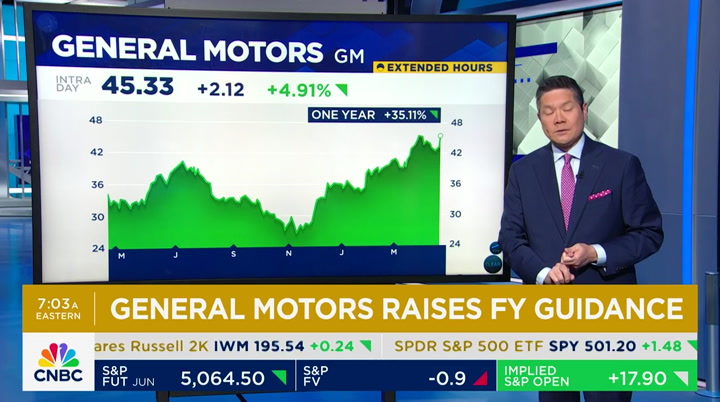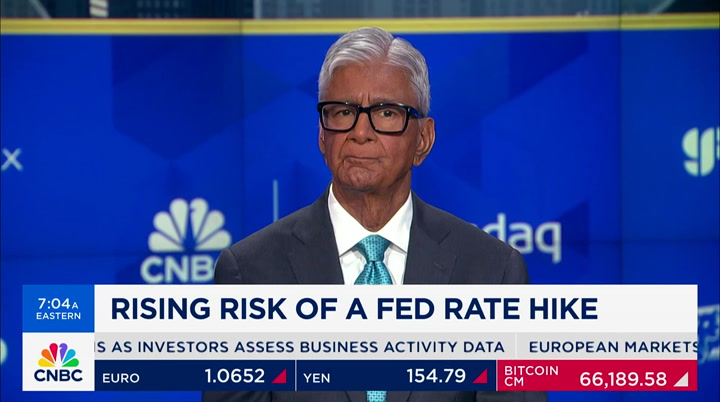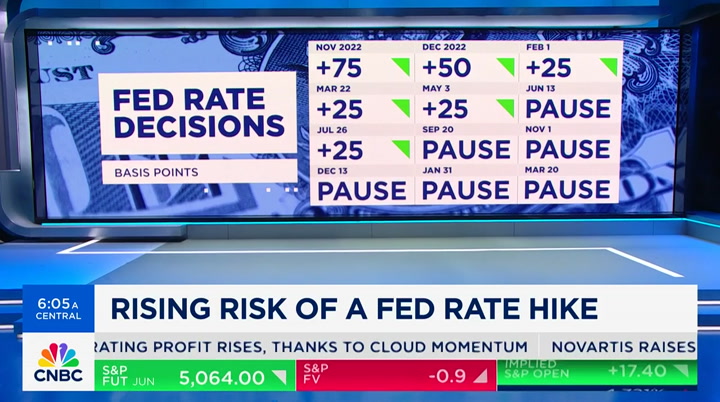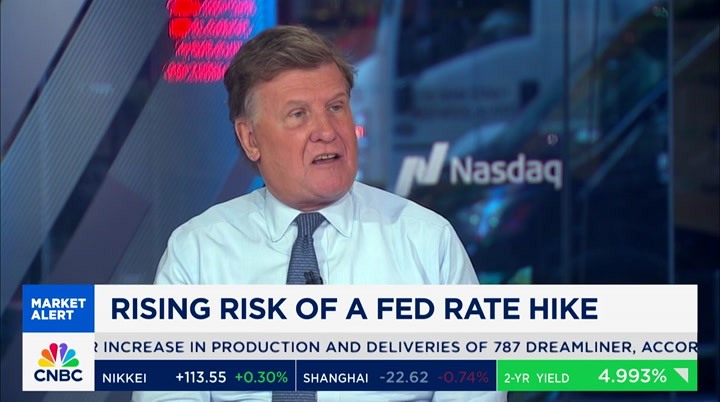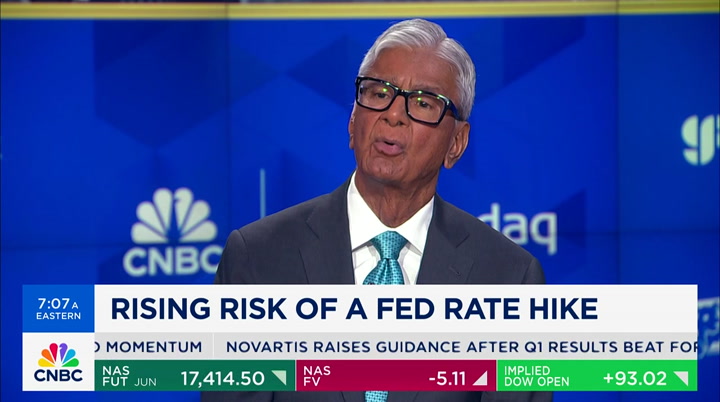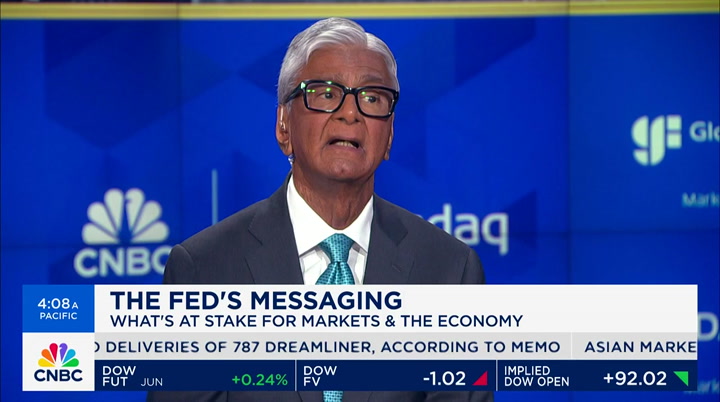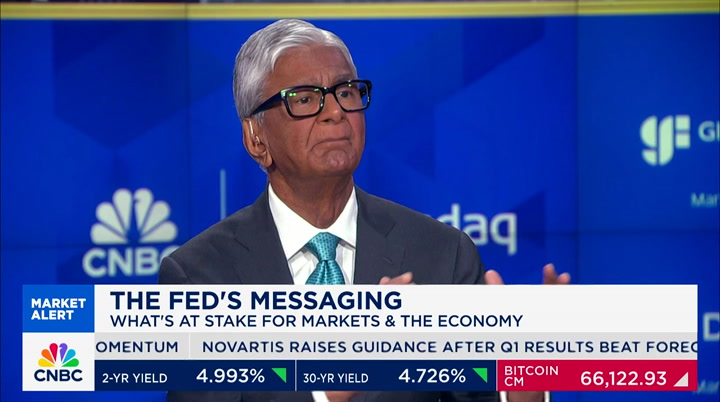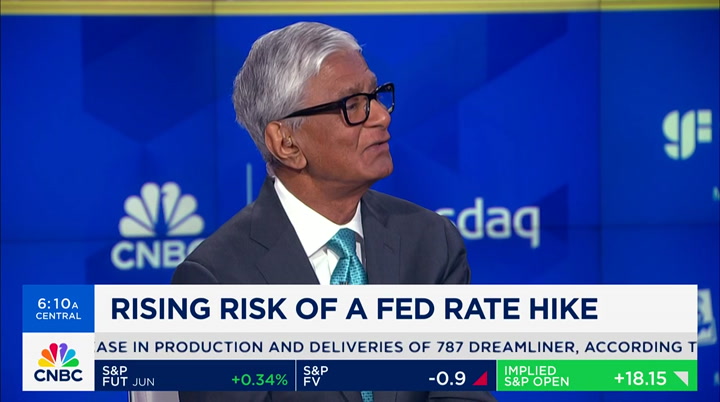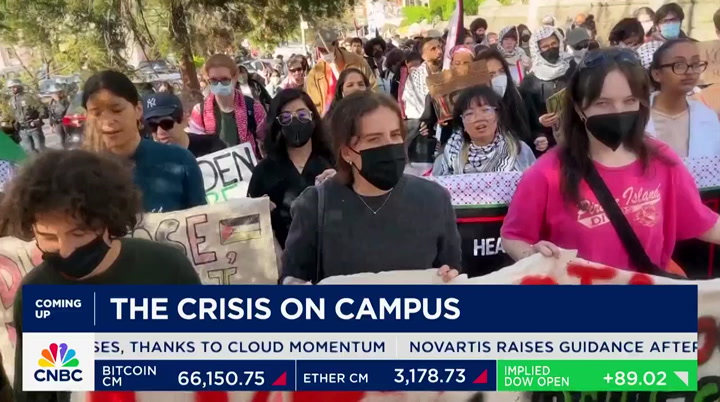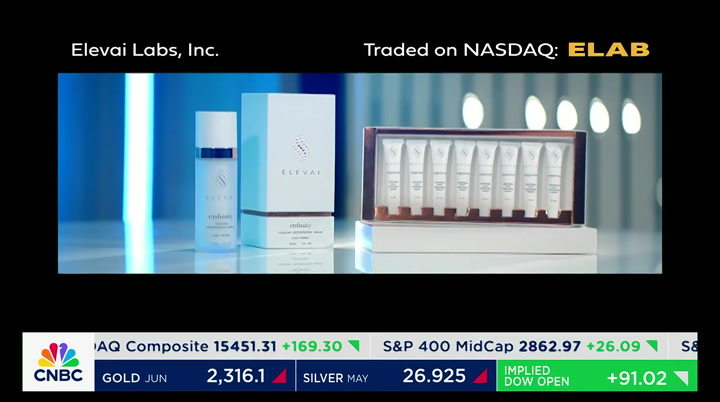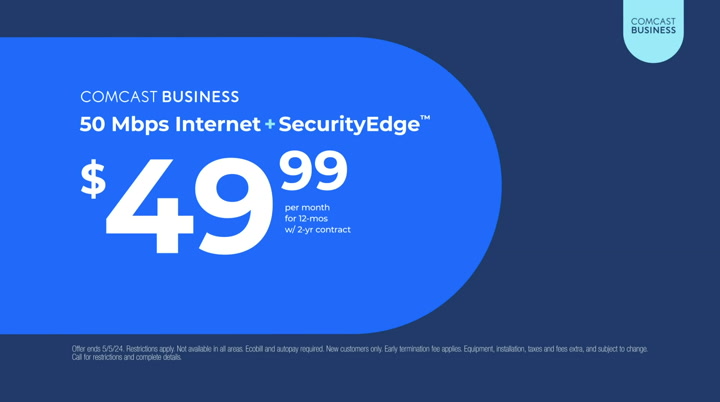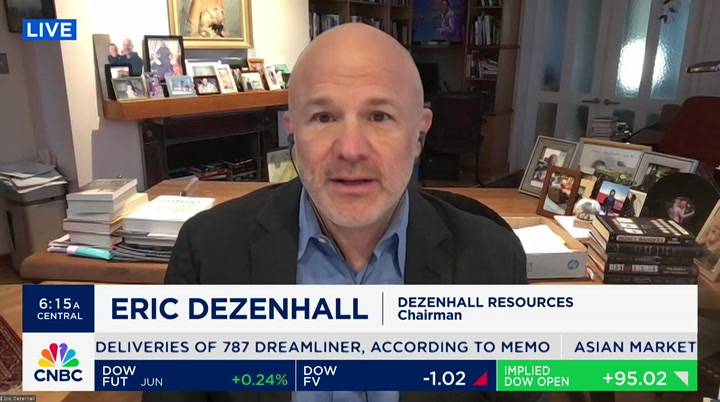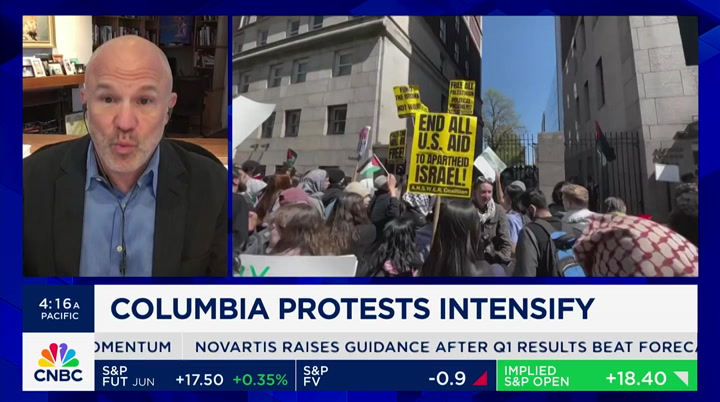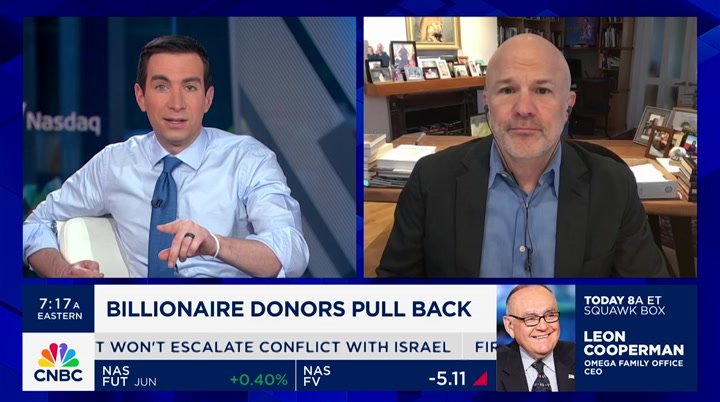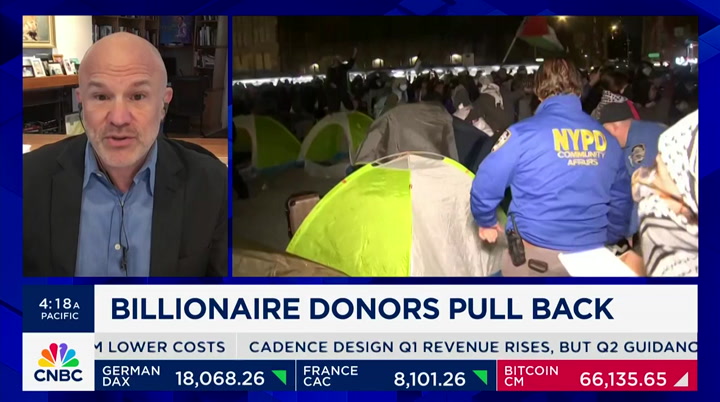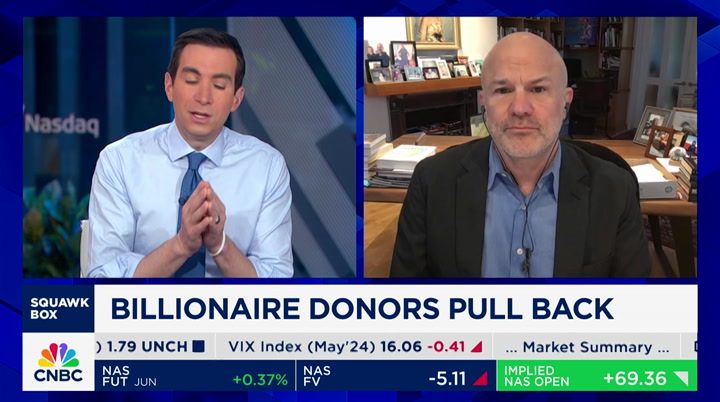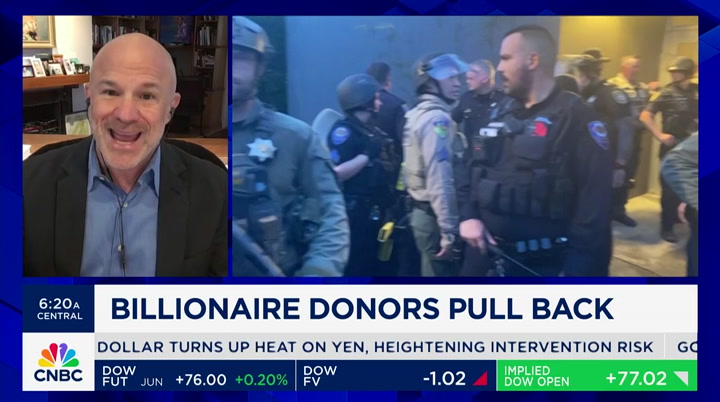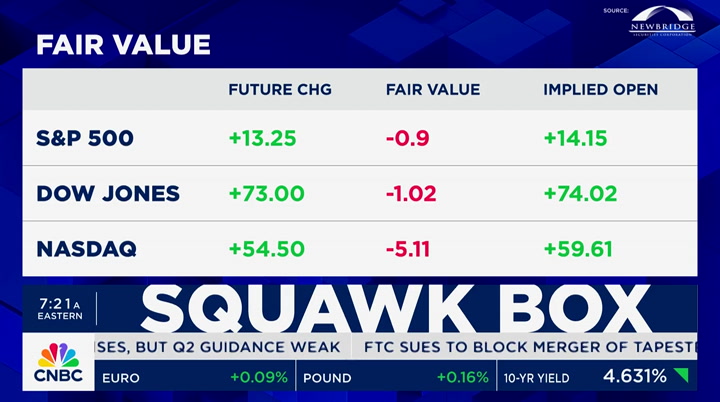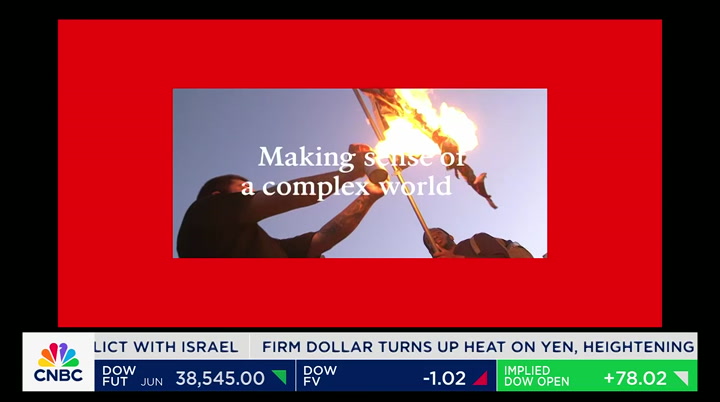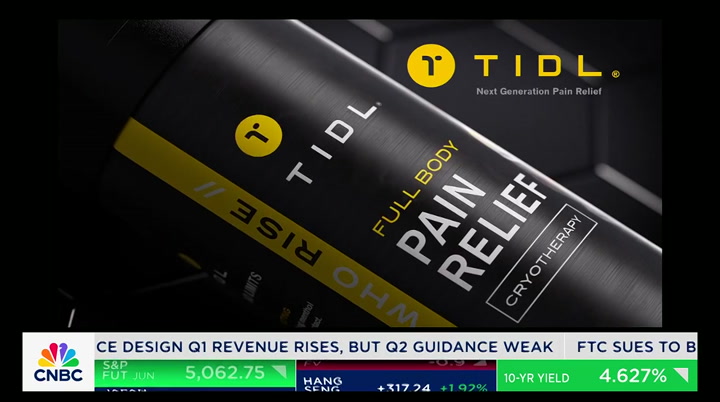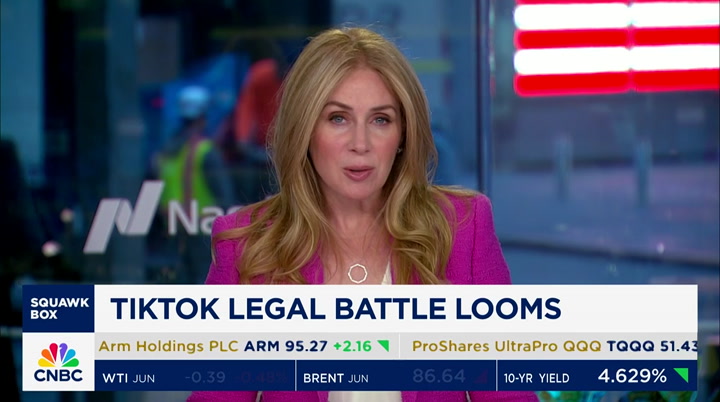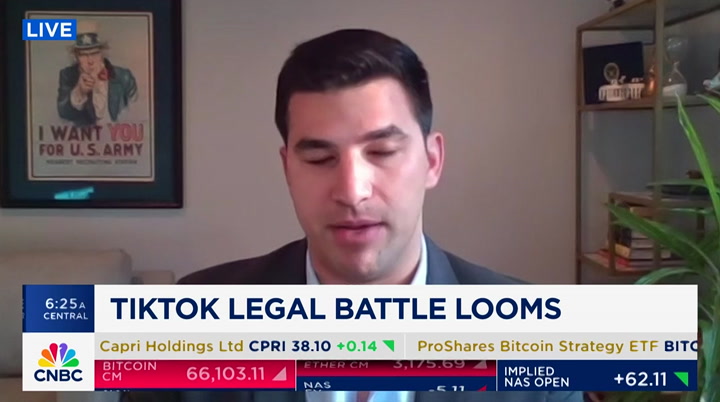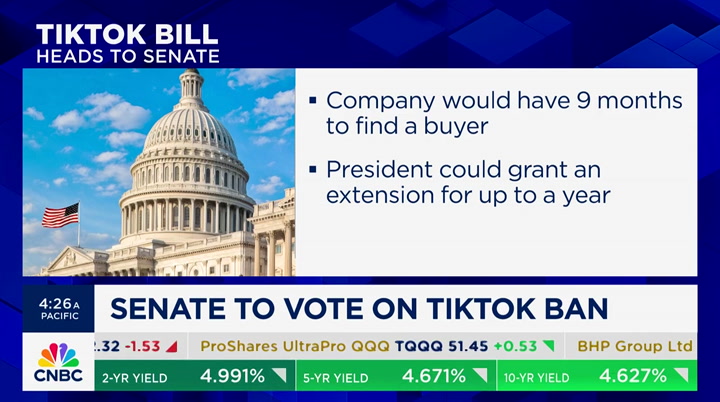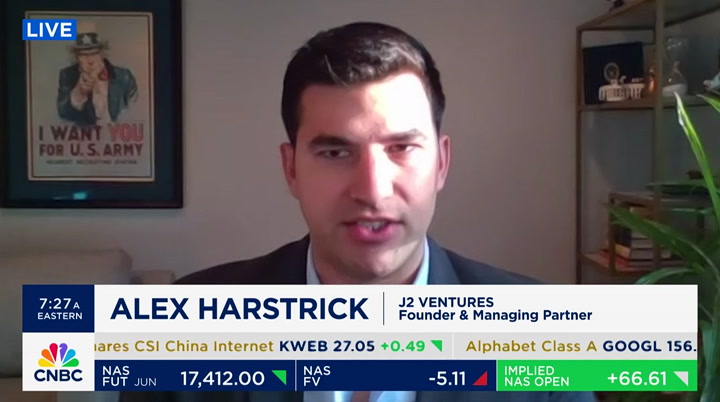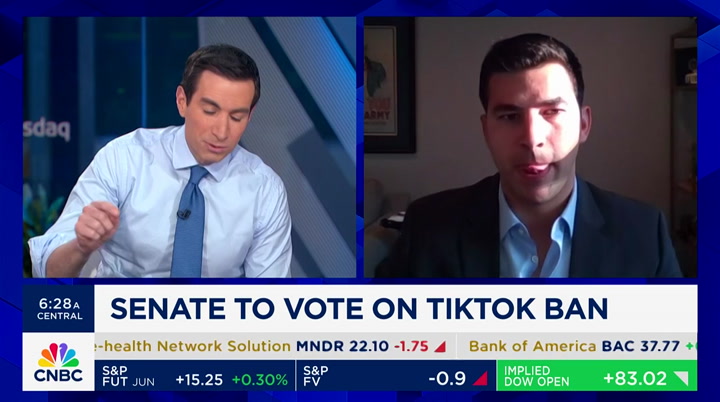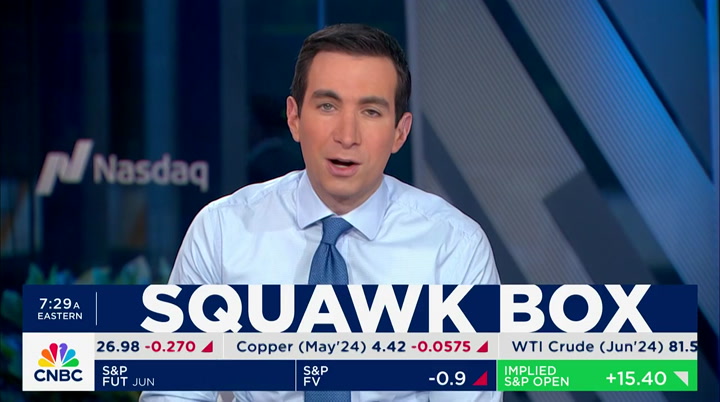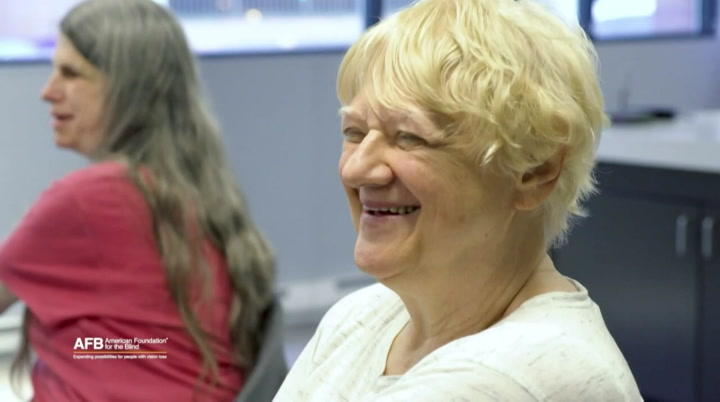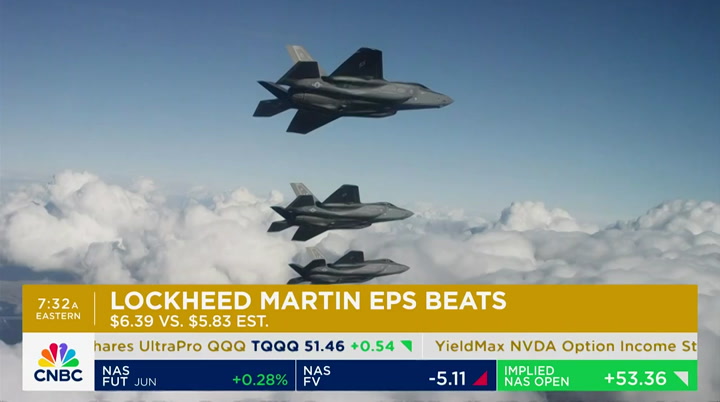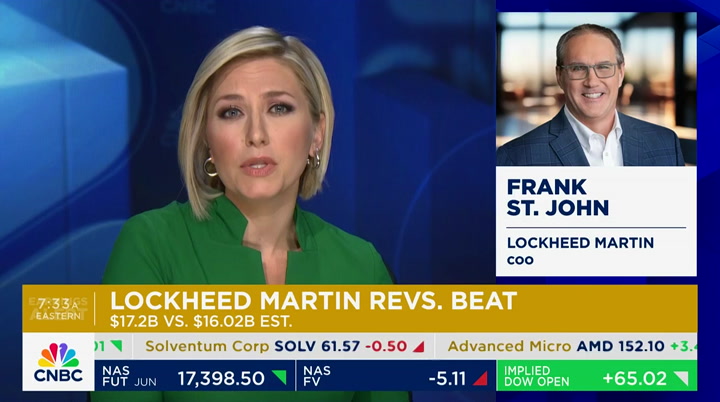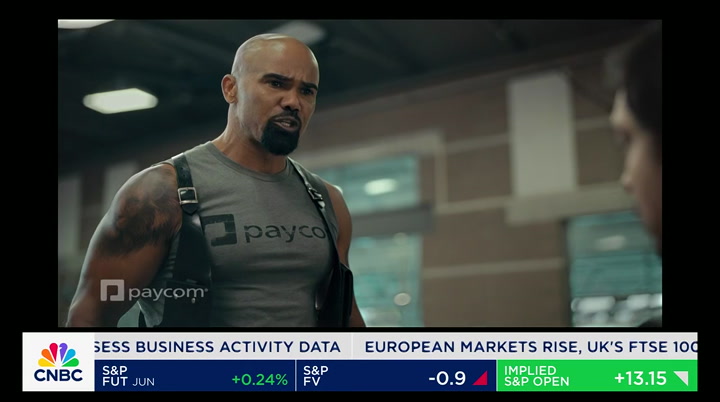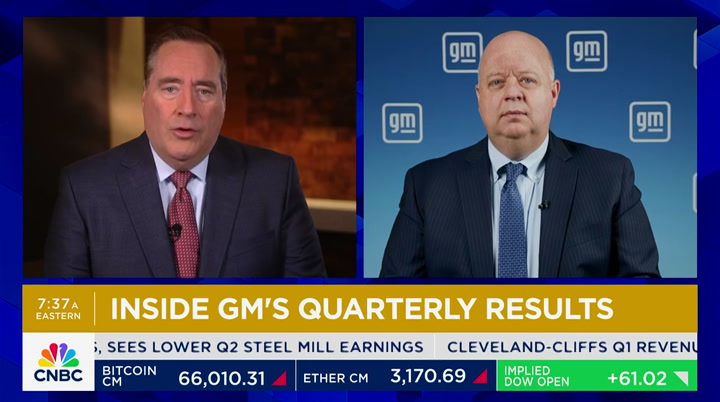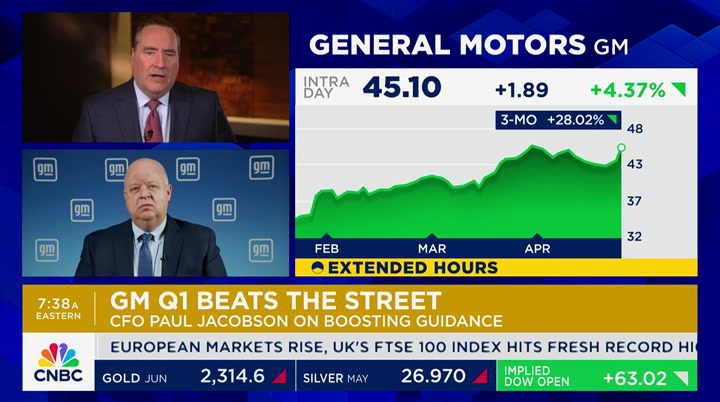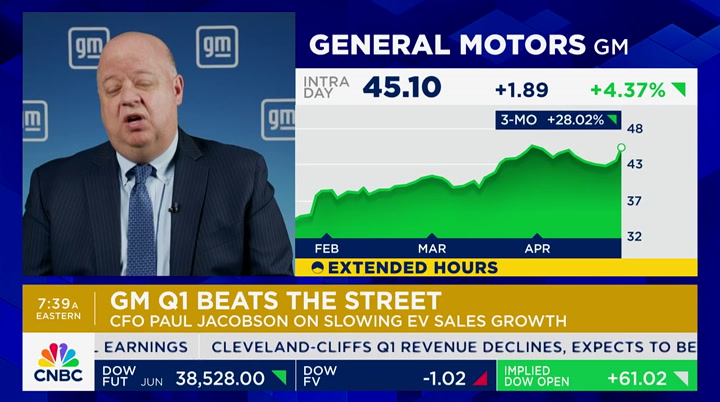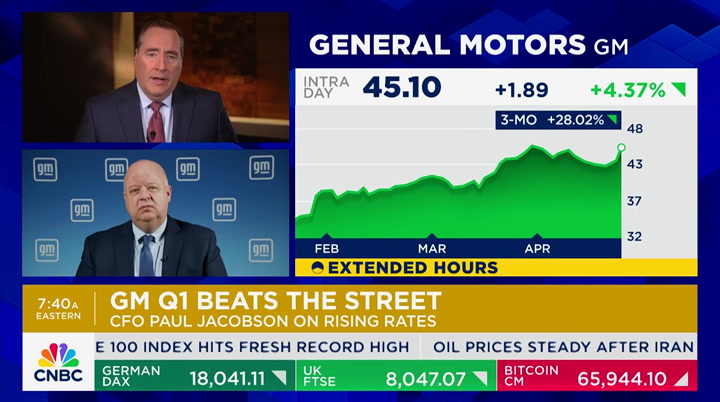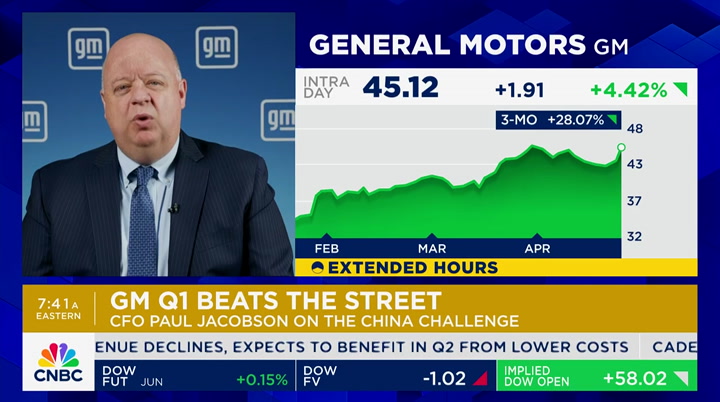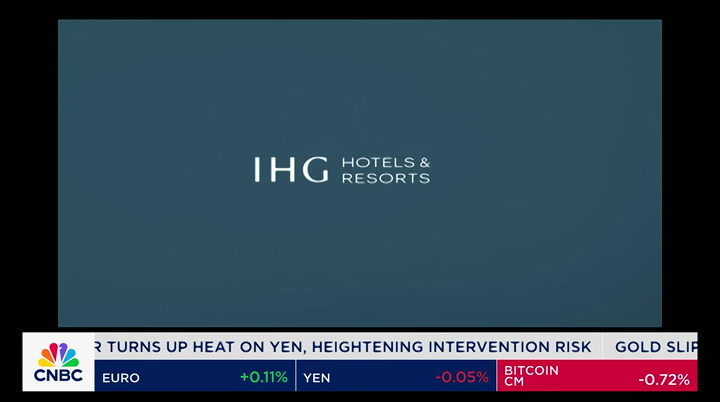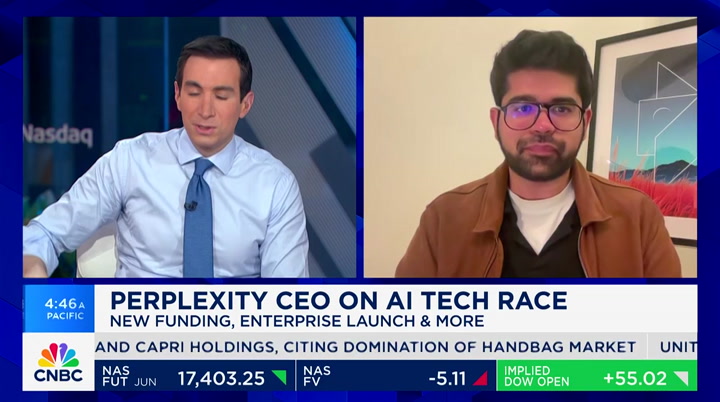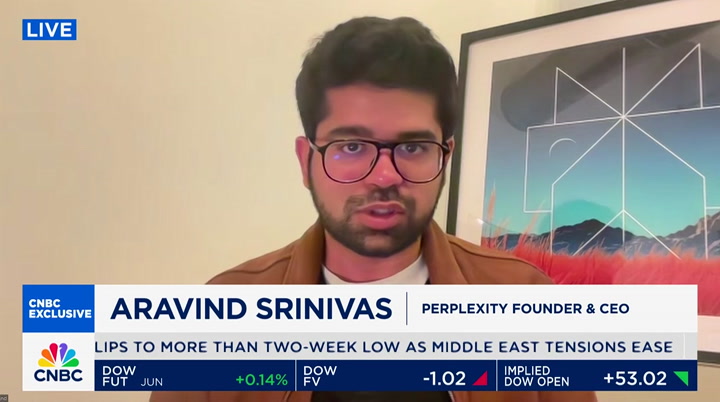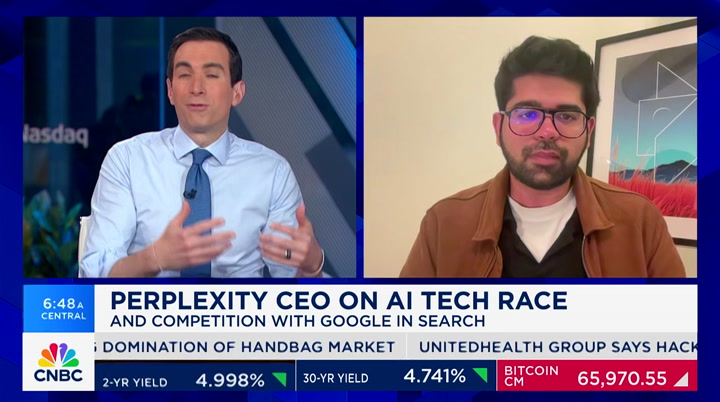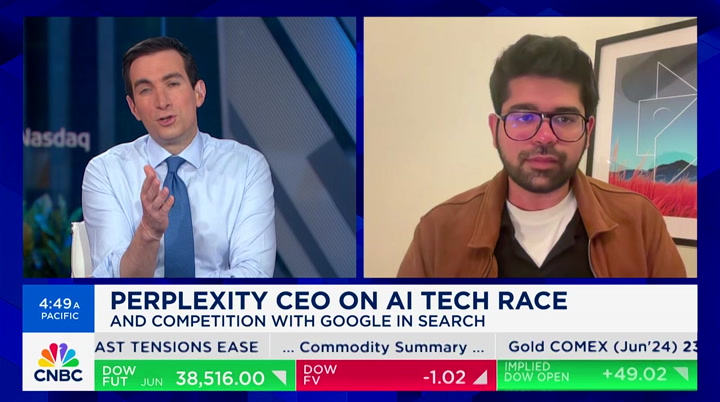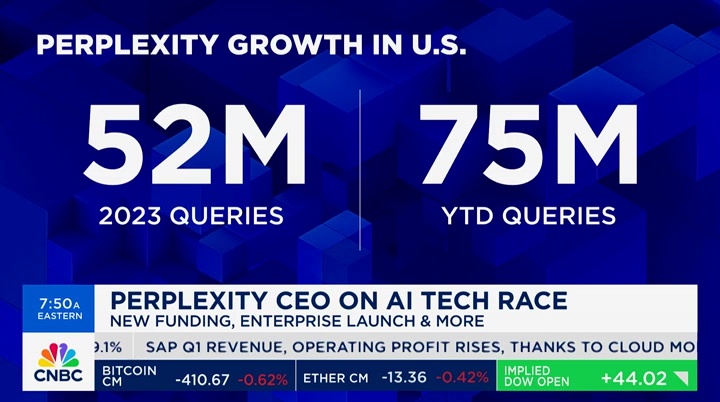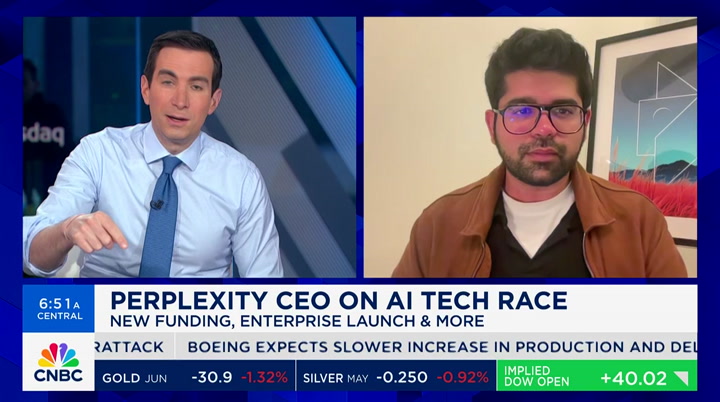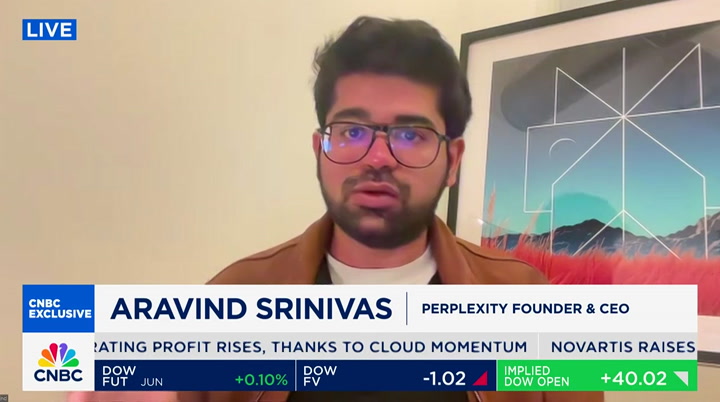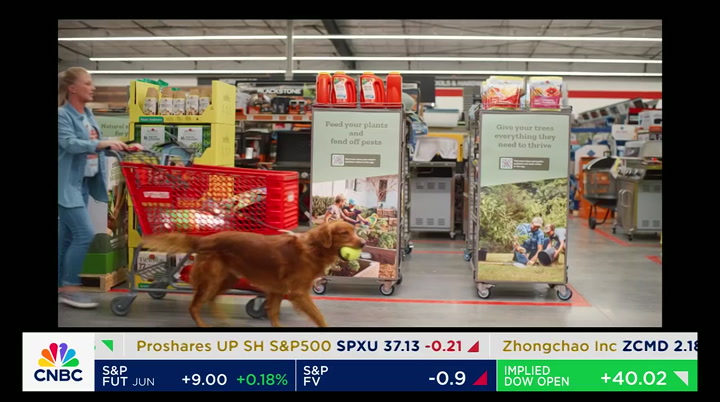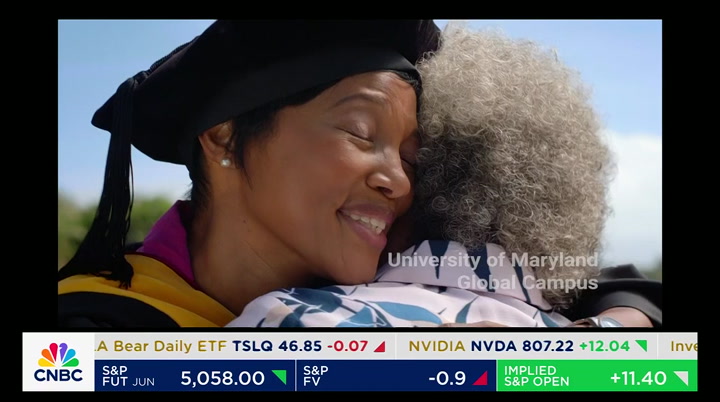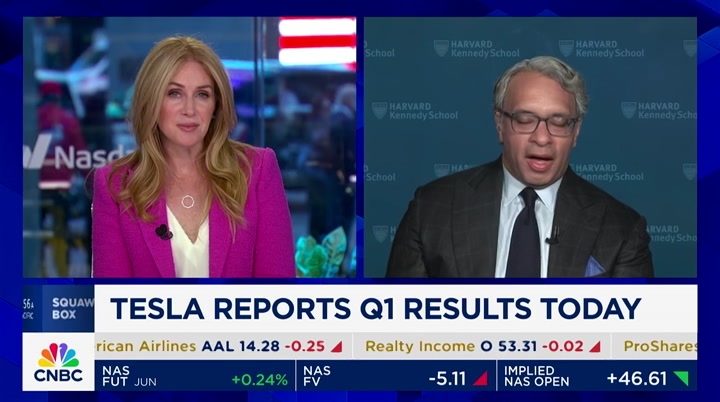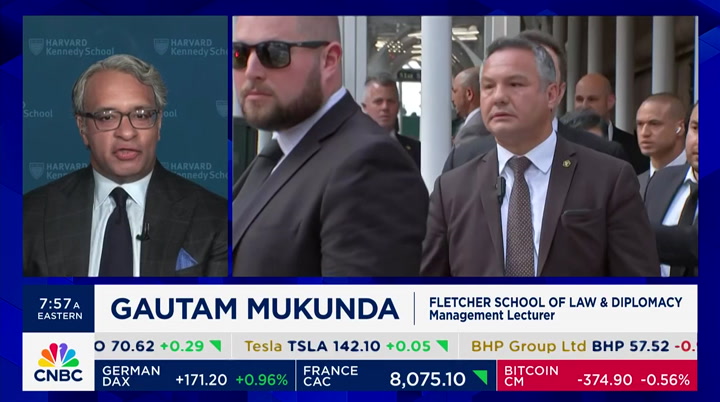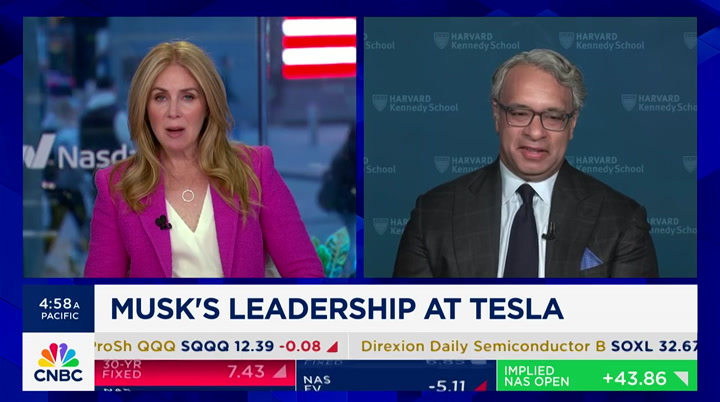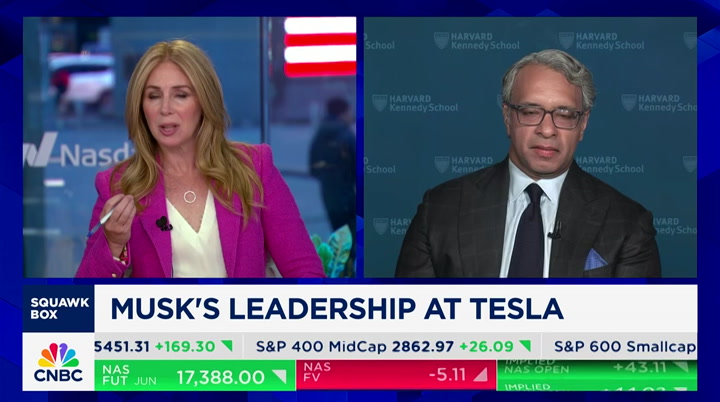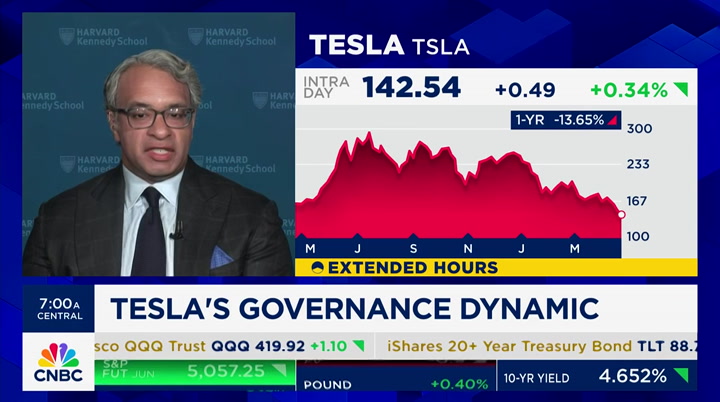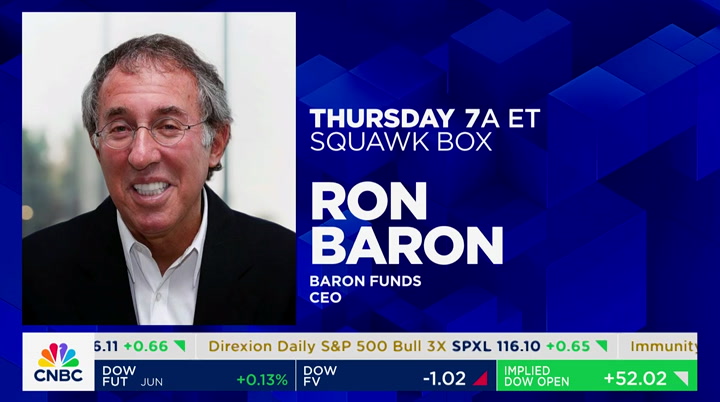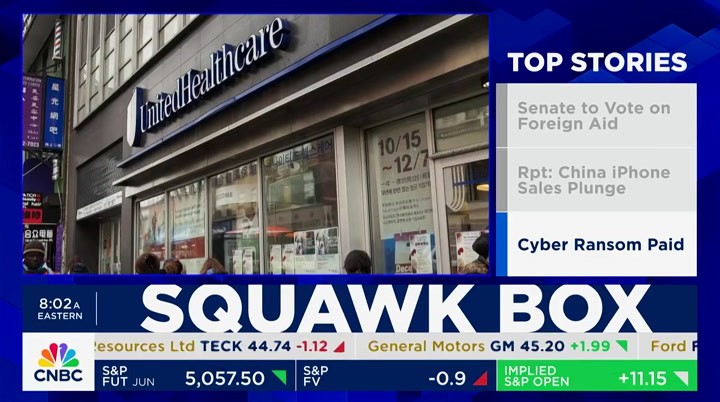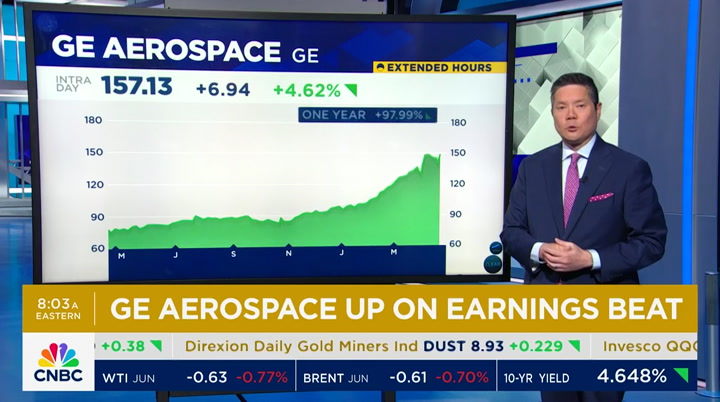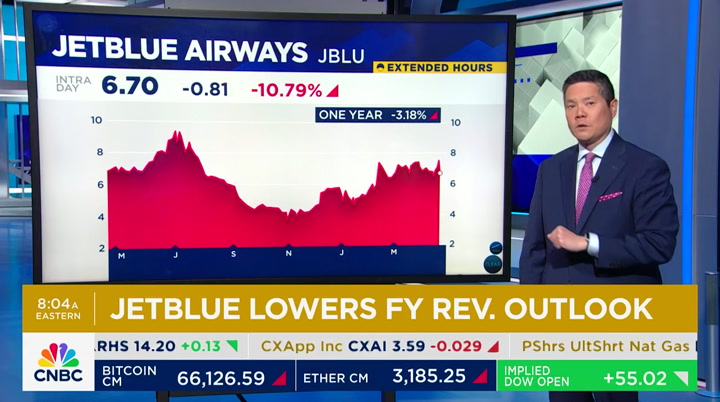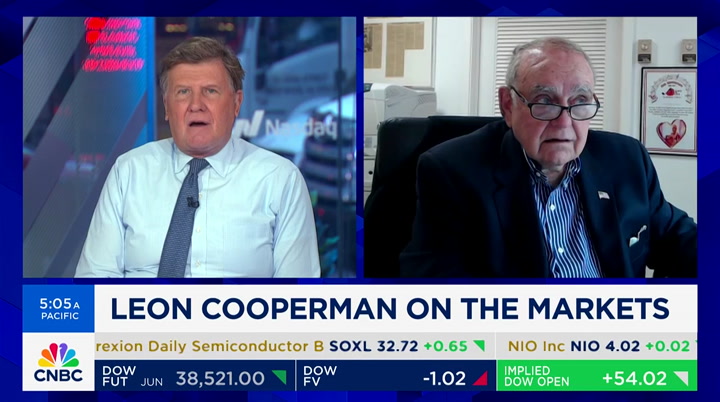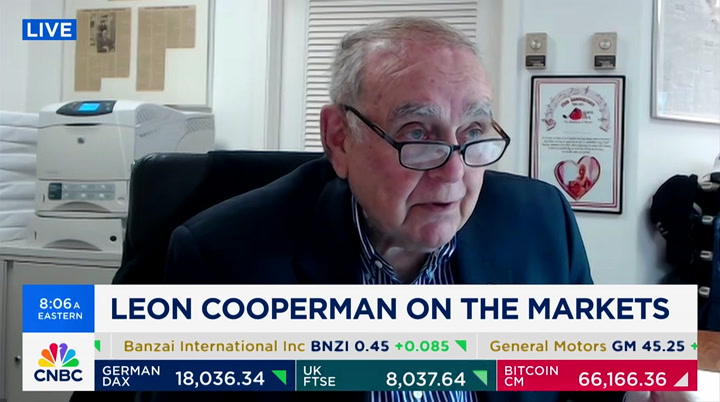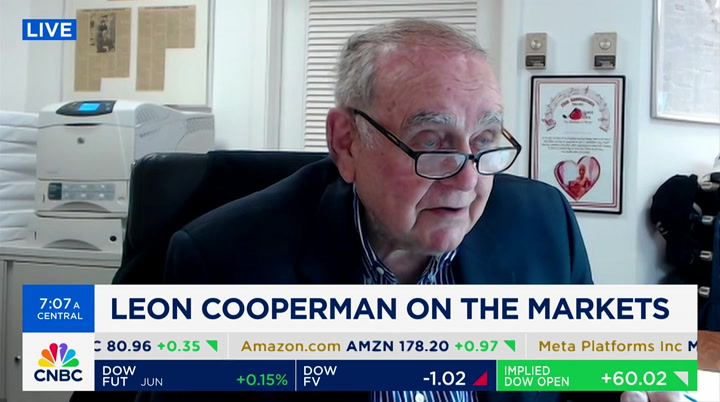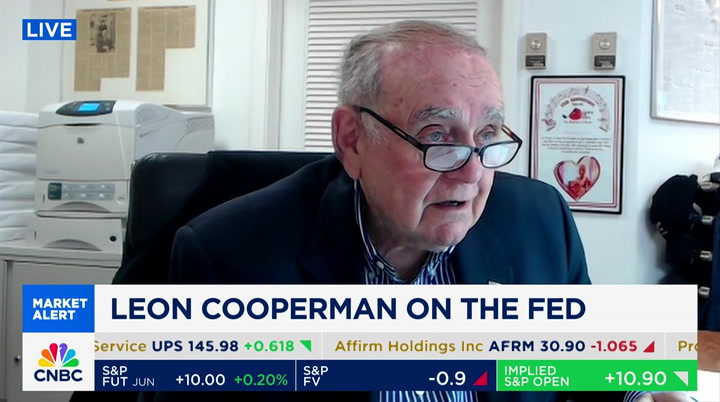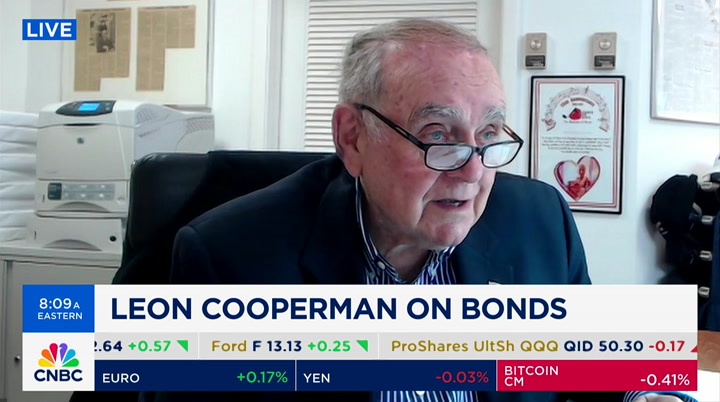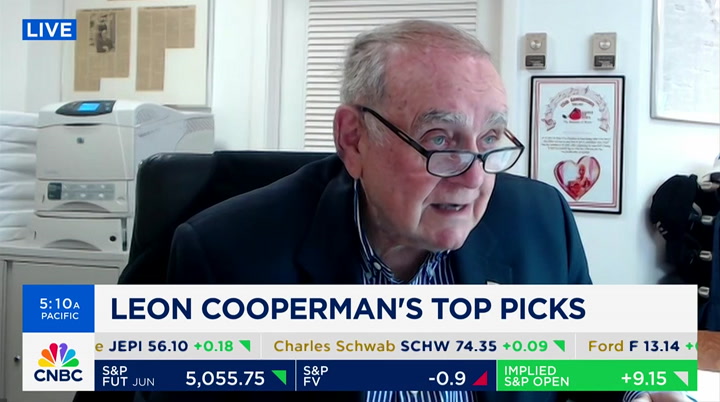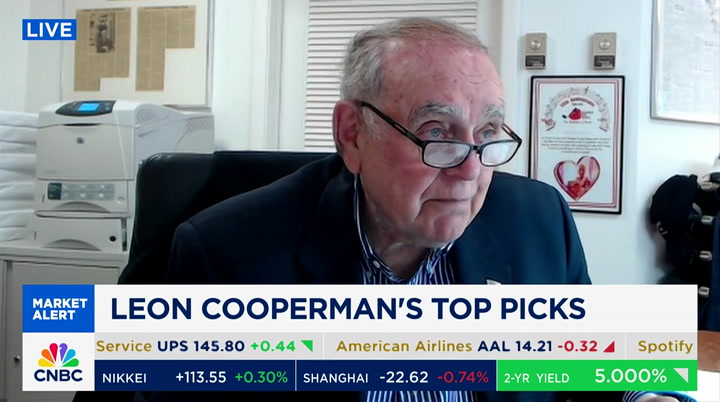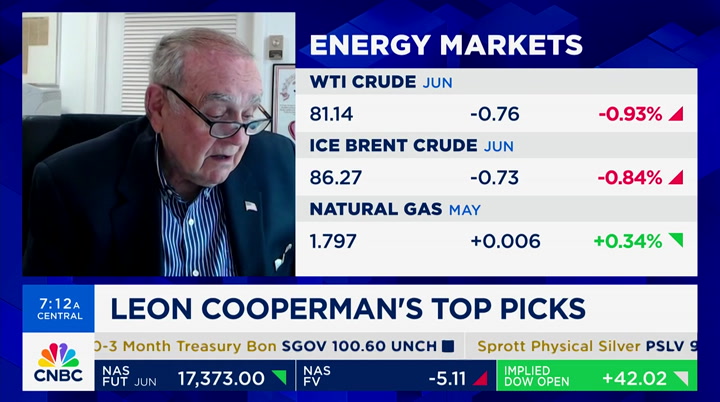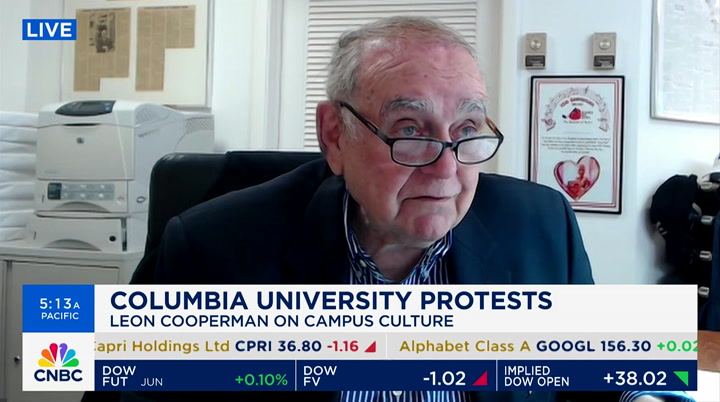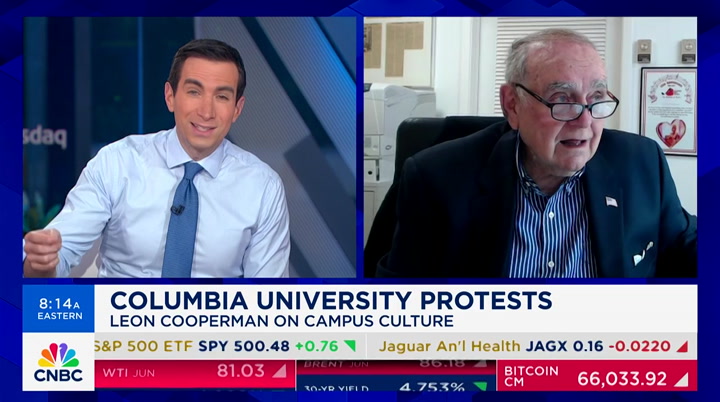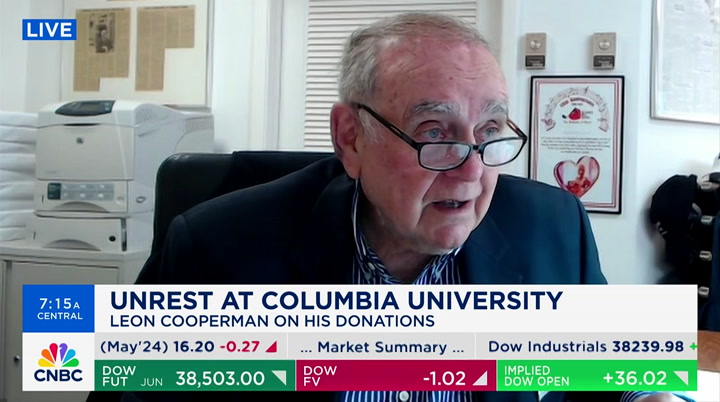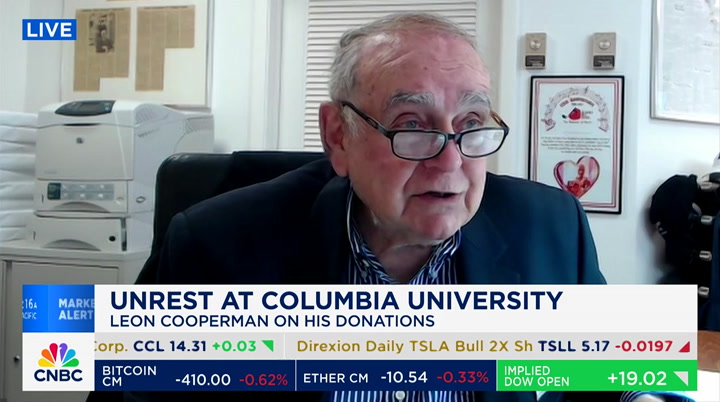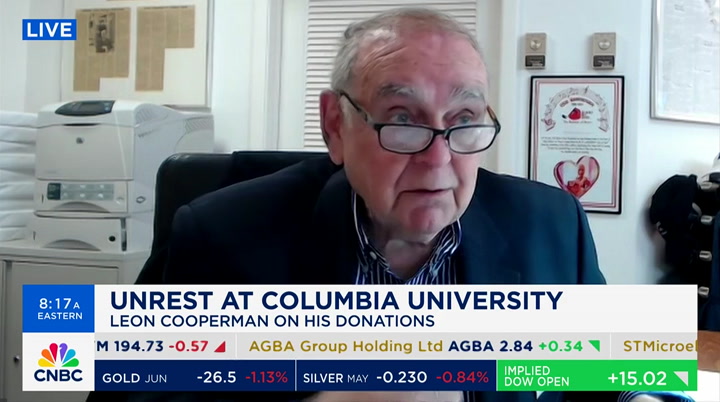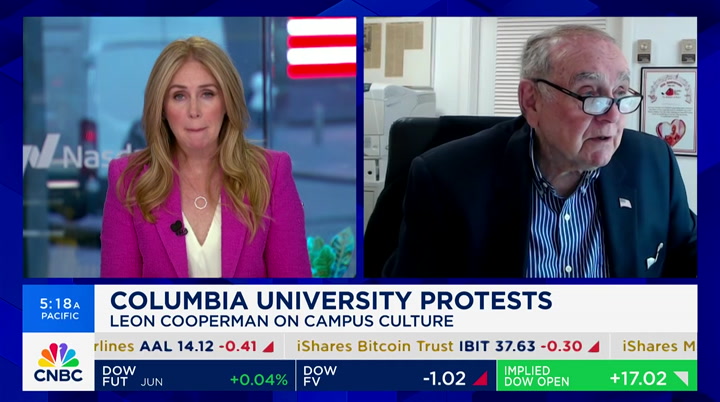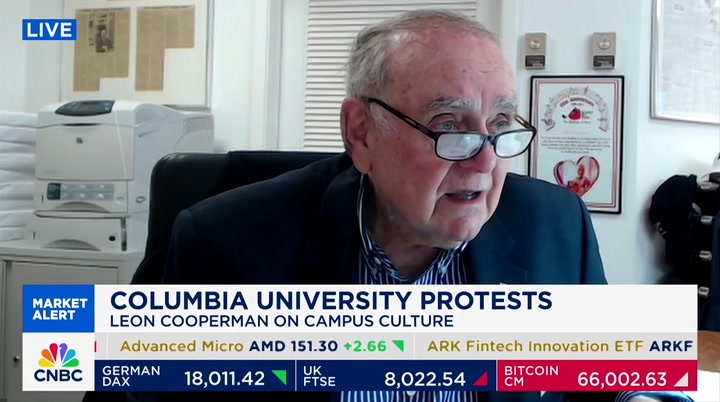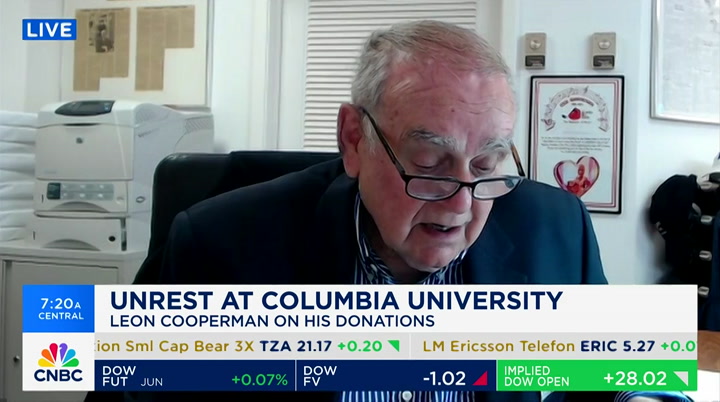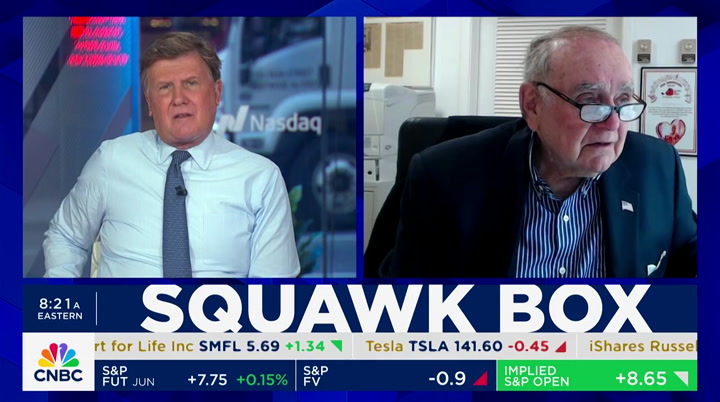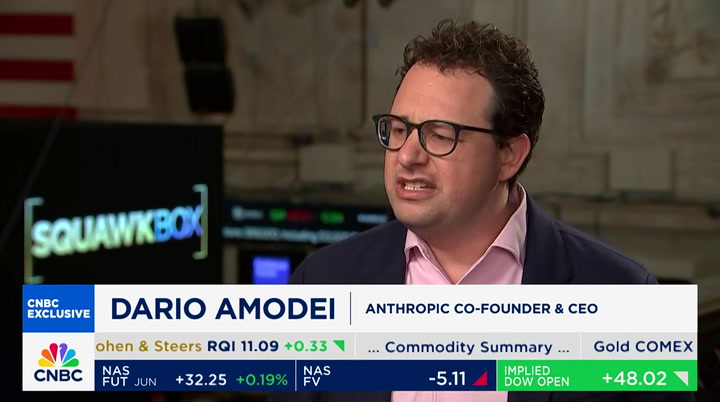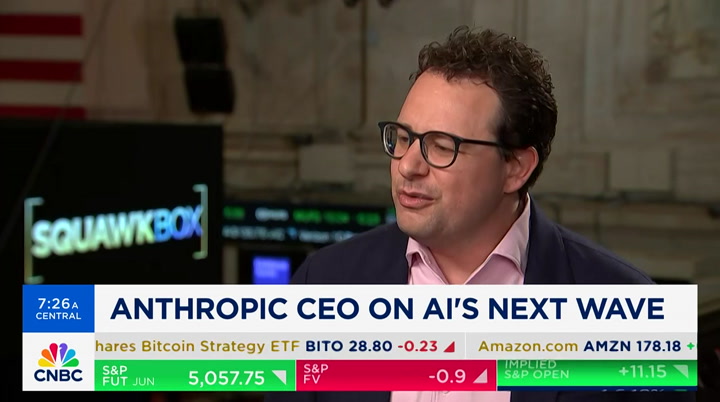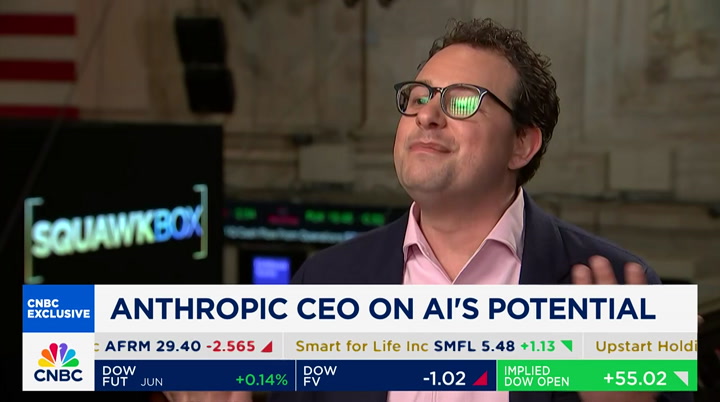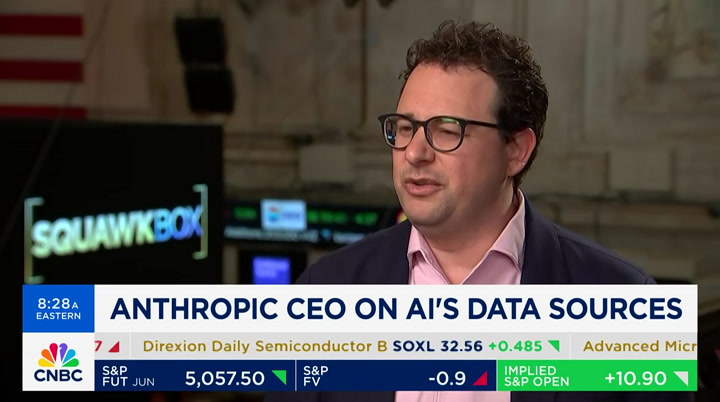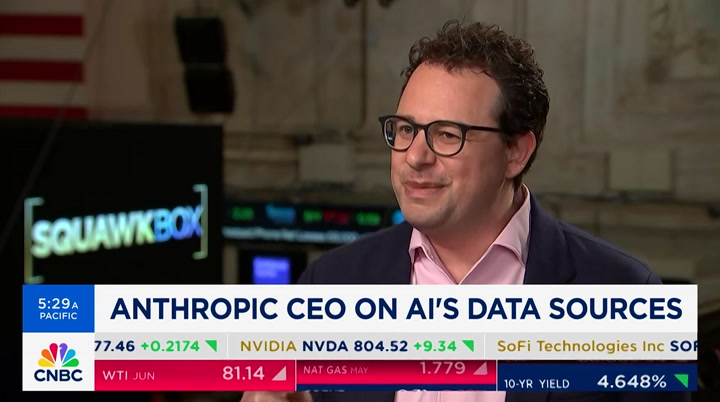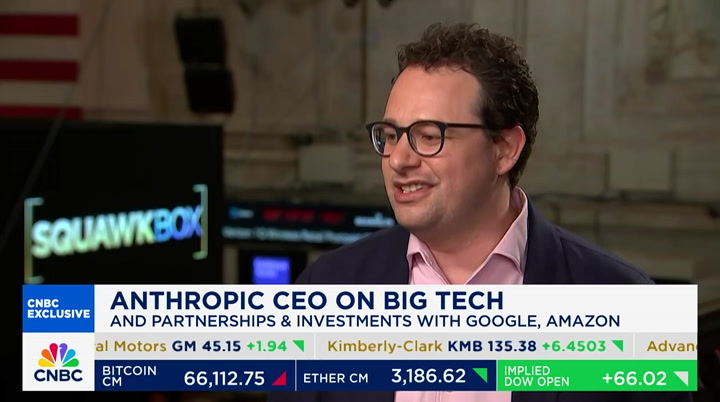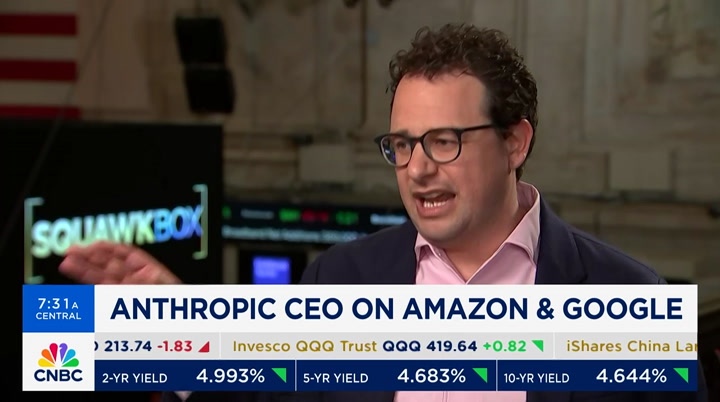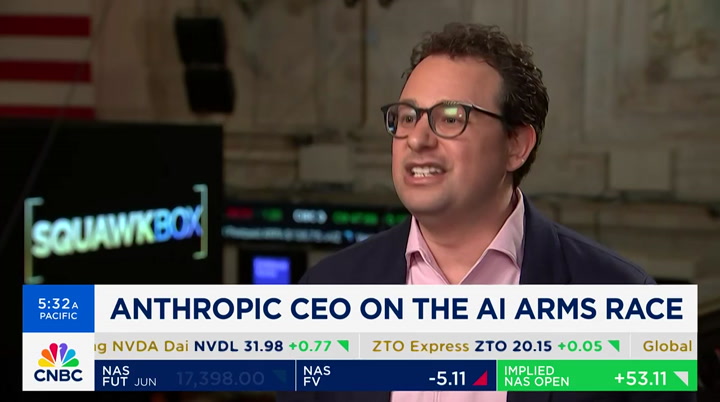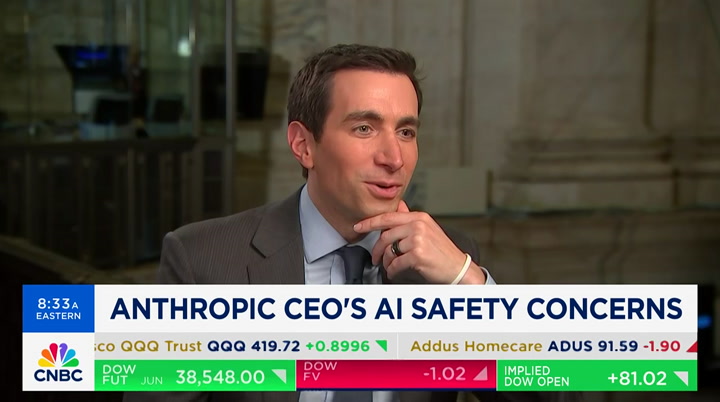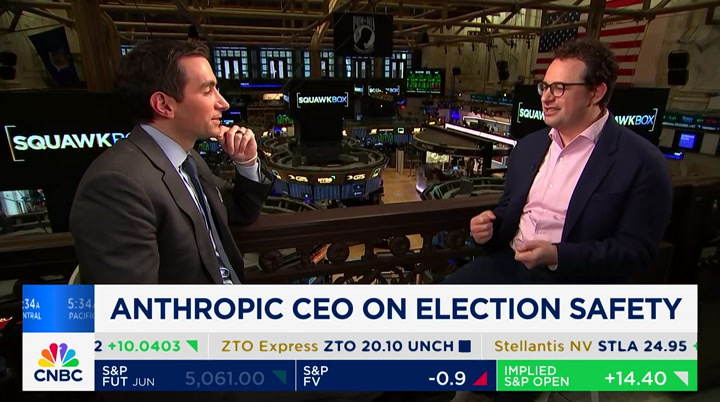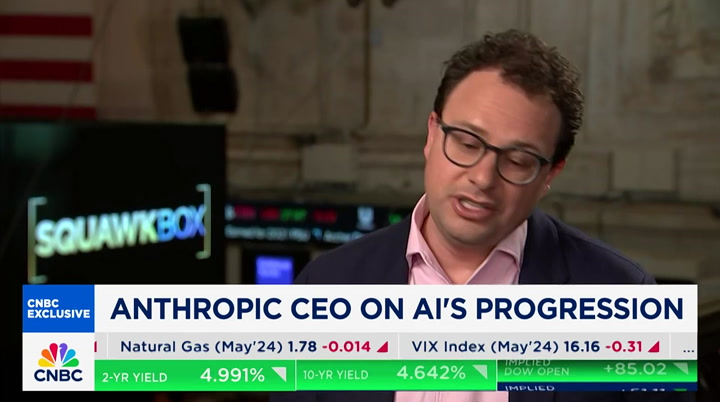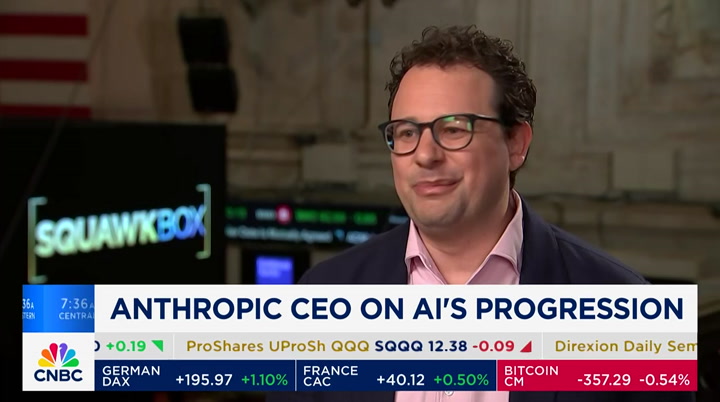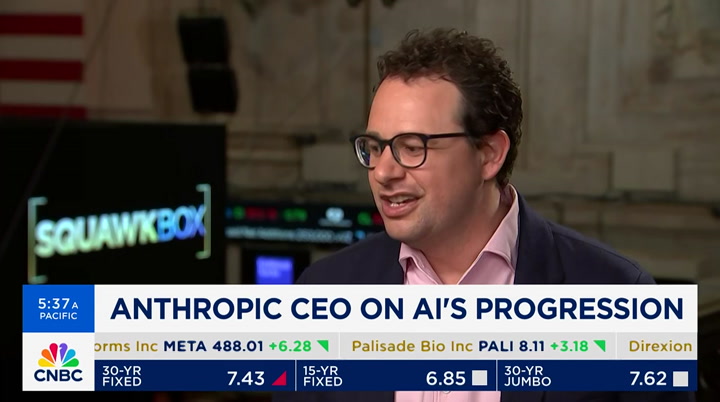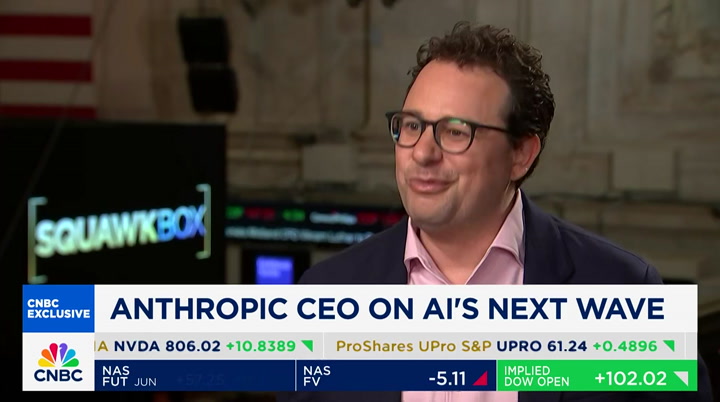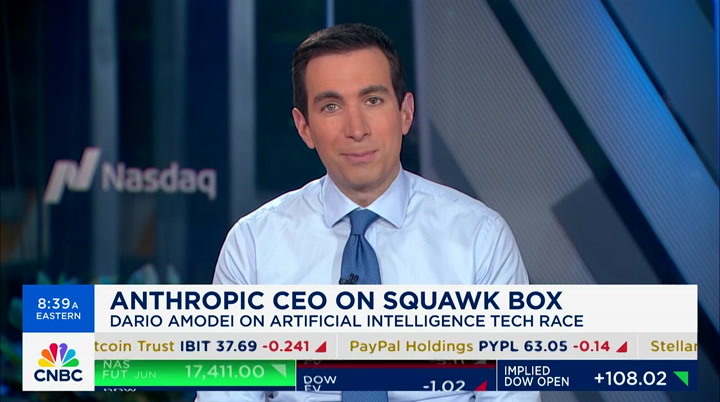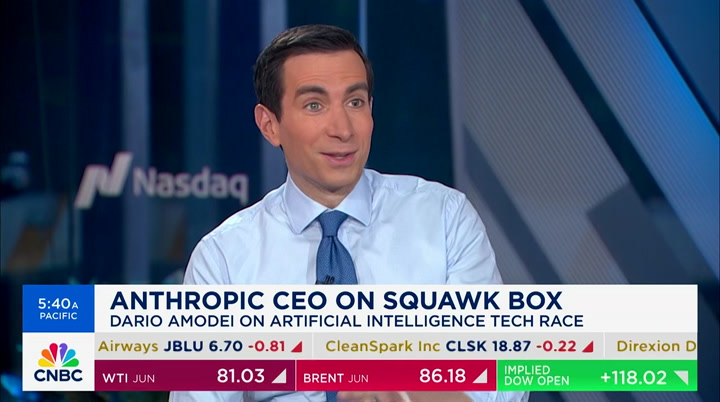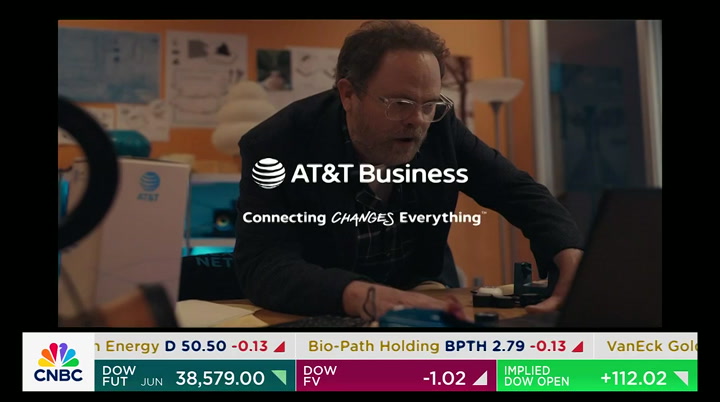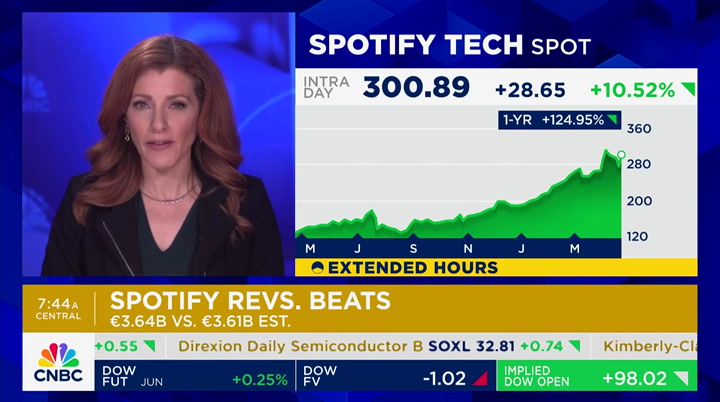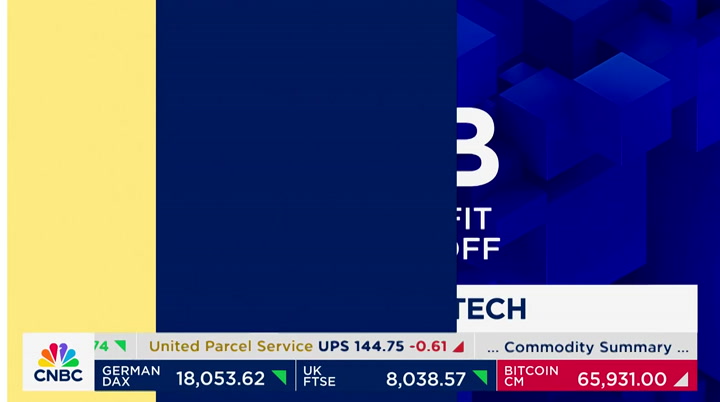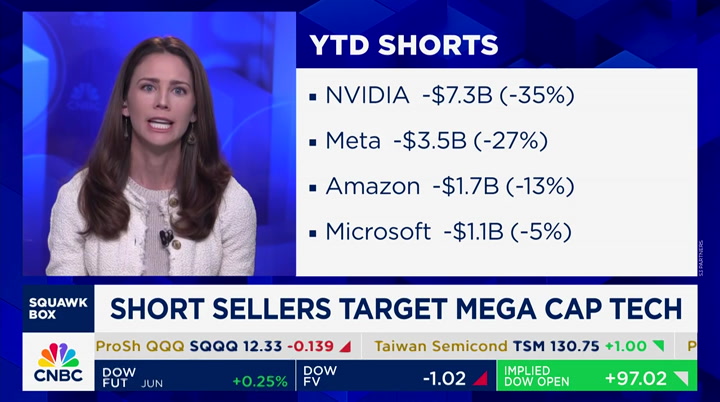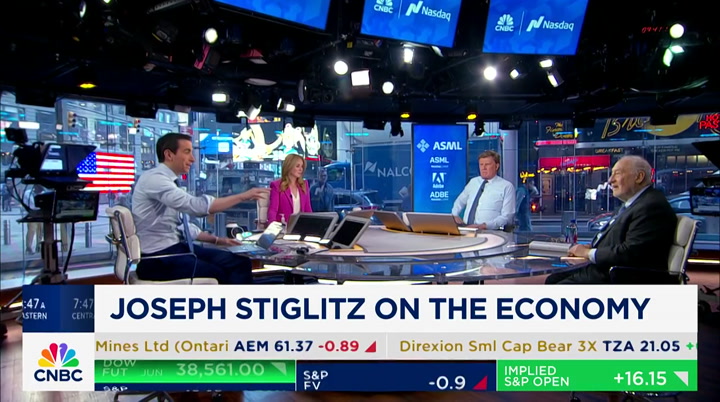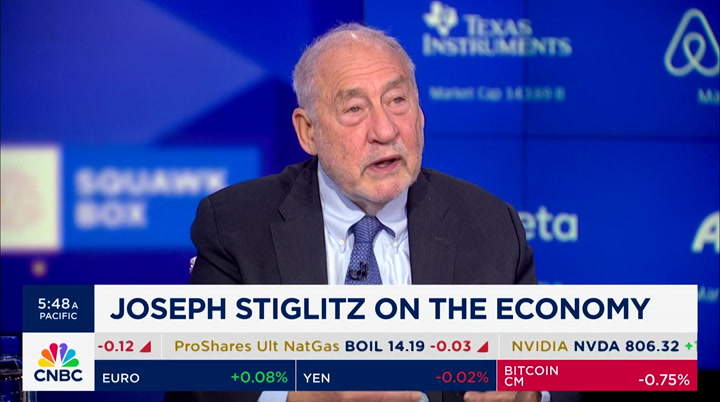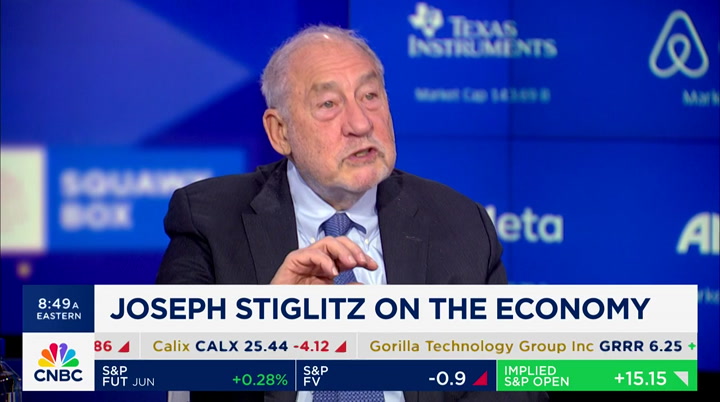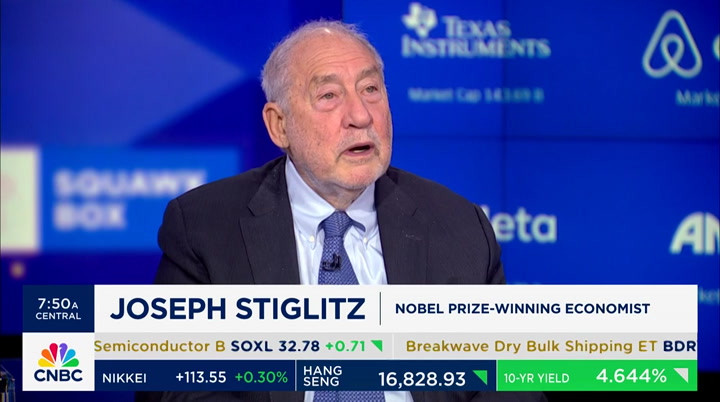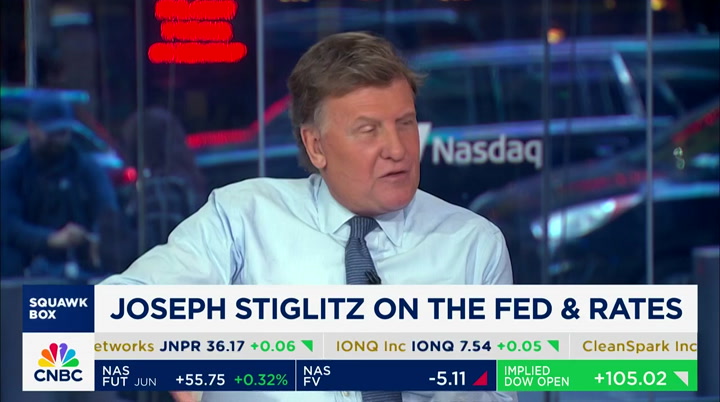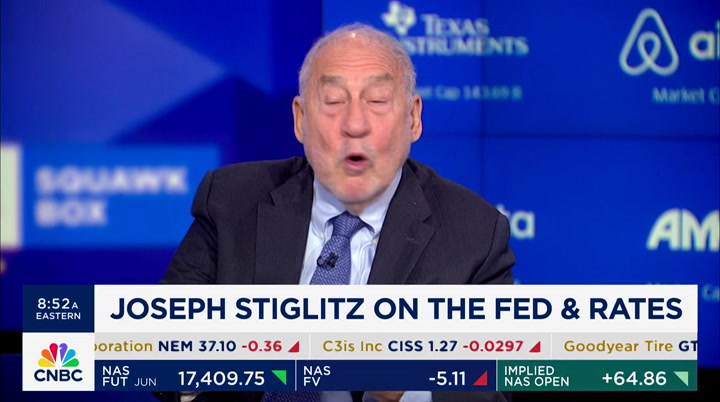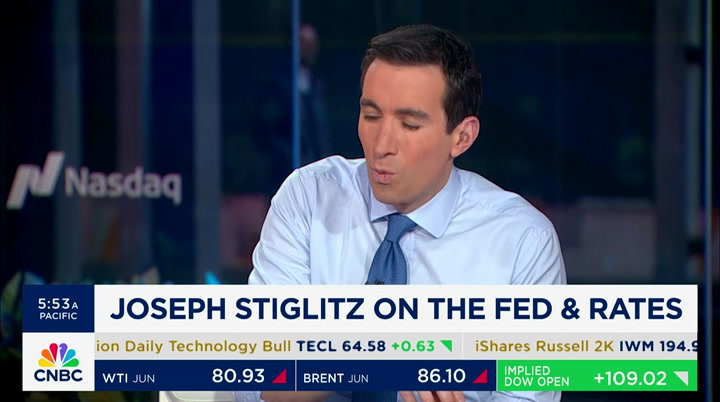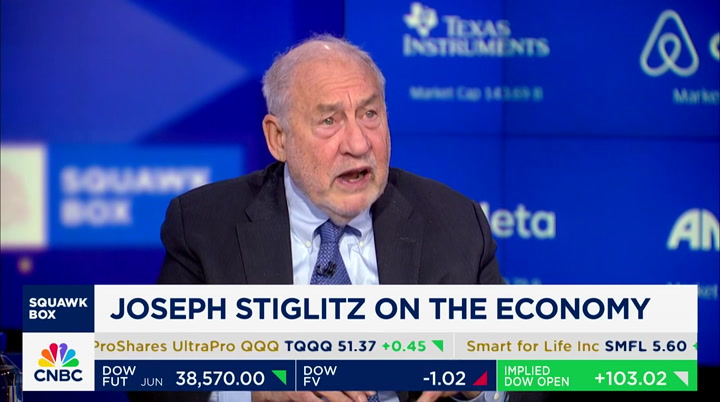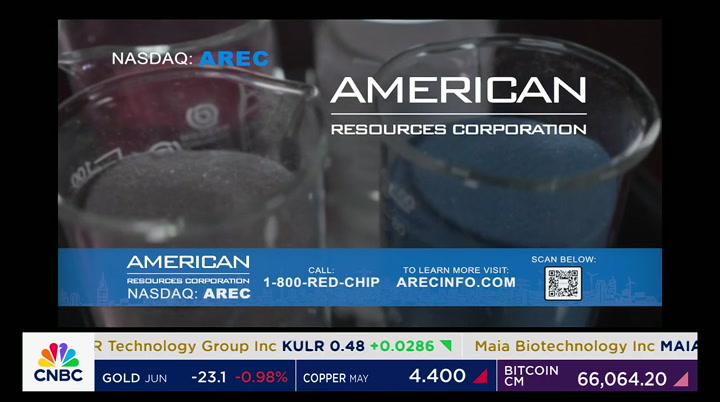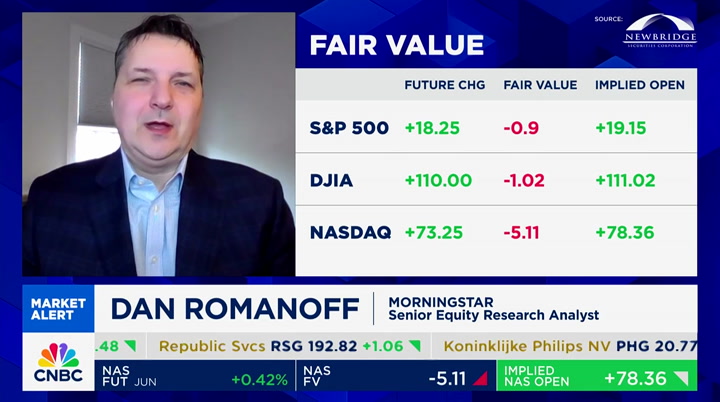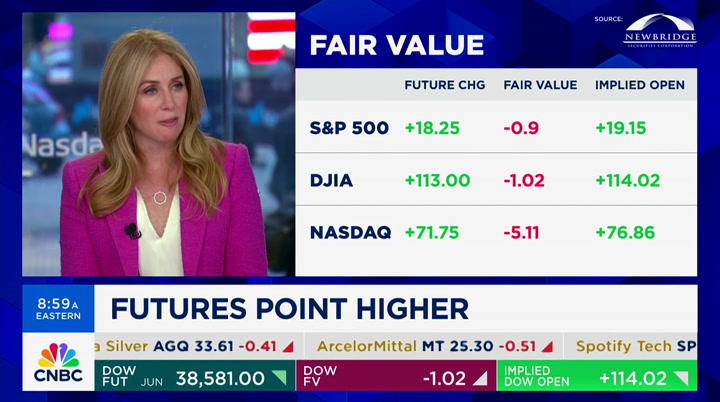tv Squawk Box CNBC April 23, 2024 6:00am-9:00am EDT
6:00 am
another palandrone. 4/23/24. "squawk box" starts right now. good morning. welcome to "squawk box" here on cnbc. we are live from the nasdaq market site in times square. i'm becky quick along with joe kernen and andrew ross sorkin. here we go. let's look at the equity futures. things are muted after big gains yesterday. the dow futures are up 20 points. s&p futures up 5. the nasdaq indicated up 30. then you have treasury yields which continue to hang in there at the higher levels. t two-year note is 4.98%. the ten-year yield aftet 4.62%. let's talk about the
6:01 am
tensions on college campuses. last night, officials at nyu asked the nypd to remove pr protesters from the campus. the palestinian protests had not been authorized and asked police to enforce trespassing violations. students and faculty among those arrested. and then at columbia university, classes for the semester would be hybrid and remote when possible as billionaire donors are rethink going support of columbia. in a statement, patriots owner robert kraft, is not comfortable supporting the university until corrective action is taken. when asked if he would pause support, leon cooperman said i cannot say that yet. he doesn't hold the administration possible for the demonstrations. he said the kids are out of control. cooperman will join us live this
6:02 am
morning at 8:00 a.m. to talk about the protests and donations and other plans as well as views, of course, of the market. back to corporate news. we are watching novartis. reporting better than expected first quarter results and raised full year guidance. strong growth in the sales of the entresto and the other treatments. the ceo of novartis will be on "money movers" which airs at 11:00 a.m. on cnbc. we are watching shares of apple. bloomberg reporting that iphone sales in china fell 19% in the march quarter. the worst performance in china since covid struck back in 2020. the report said that apple fell to third place in that market behind local brands of vivo and
6:03 am
huawei. business has been tougher for apple in china after beijing restricted state agencies from using apple in a retaliatory move. >> every social media company from the united states is banned in china and has been for ten years. >> when is tiktok, if it happens, go away? i hear it will never go away. >> it depends how you believe it well work. if you read the bill, it is possible it would sit on your phone and never been upgraded or updated. i think it would devolve in three-to-five months. >> that quick? >> instead of taking it off the phone, they can't update it.
6:04 am
at some point people will go to other platforms. >> it is listening to you and doesn't know if it likes you or not? >> i don't believe these things are happening. >> why? >> to the extent that tiktok is a national security threat, it is only a threat prospectively. i do not believe that they are actually using the data in some kind of nefarious way today. they have the not shown us any evidence. >> they said they will not cooperate with the chinese government. there is not a company. just ask jack ma. >> it is only a national security threat if you think they are trying to participate -- >> there is no reason to believe our college kids are -- influence in some nefarious way. they are all acting well.
6:05 am
it is not just tiktok. >> it may be a function of tiktok, but not because tiktok built the algorithm to do this. >> there are people who argue the other side of that. >> none of whom have shown any evidence whatsoever that it is actually the case. >> we have a guest who has the stuff on this. he may come on. >> all the tents look like they were bought by the same people. who bought the tents? can we find out who bought the tents? let's talk about boeing. it expects a increase in production because supplier shortages of the few key parts. they have been trying to boost the output after quality problems and suspending deliveries for two years. boeing was producing five dreamliners per month as of late last year and said it samaimed
6:06 am
get up to ten per month next year. we will have more from boeing tomorrow before the opening bell when the company reports the quarterly numbers. we will talk about those and the state of the company. former president trump set to receive 36 million shares of trump media today as long as the stock price remains above $35.50 share price. the receive of shares is based on the benchmark within the 30-day trading period. it would bring the stake in the company for trump at $4 billion. the question is when he will access that $4 billion. as of now, he would have to wait until september. in the meantime, united health saying private information on americans may have been come promised in the february data attack.
6:07 am
this comes as they are dealing with the repercussions from the attack. the company paid a ran zosom ine attack to protect patient data. the hackers breached the company systems a week before they were detected gaining access through compromised credentials without authentication. checks that were enabled. wired reported that a hacking group received a $22 million bitcoin payment on march first. united health has deliclined to comment on that report. and ftc is filing a suit over the tapestry and capri deal. the ftc said the combined company would harm shoppers and employees as the companies currently compete on everything from clothing and eye wear to shoes.
6:08 am
in a statement, tapestry said the federal agency misunderstood the marketplace and the way that consumers shop. pepsi out with quarterly earnings of the beat by 9 cents with the adjusted earnings. he may be gone, partly because of his blockbuster appearances on "squawk box." i still get the bag. do you get the baggi? >> i did get the bag yesterday. >> i don't know. >> the big bag. >> it shifts around. they were still delivering to my old address before. >> the young, youthful ads for bubbly. bubbly will replace soda. i tried it. they sent me one. >> bubbly is a pepsi product. >> do you like it?
6:09 am
>> i like it. i'm looking for a case. >> what flavor? >> i had a weird fruity pine pineapple. five or ten calories. it tasted just like soda. no sugar. >> no calories. >> i drink carbonated water with no calories. that's fine. >> bubbly has had no calories. >> one had five and the other had ten in it. a 17-ounce bottle. i can handle five or ten. i can't handle 180. >> you have to get it shipped. >> no. segue. story about u.p.s. here. you have to have it shipped. i'm trying. u.p.s. with results this morning. delivery service earning $1.4a share for the first quarter. compares to $1.29.
6:10 am
revenue is below the consensus, joe. >> past 6:08. coming up, shares of tesla trading at the 15-month low ahead of the quarterly results. we will tell you what to expect from the automaker for the quarter. a programming note, on thursday, long-time tesla investor, ron baron will talk about the results and the slide in the stock. "squawk box" will be right back. >> announcer: this cnbc program is sponsored by baird. visit bairddifference.com. giving traders even more ways to sharpen their skills with tailored education. get an expanding library filled with new online videos, webcasts, articles, courses, and more - all crafted just for traders. and with guided learning paths stacked with content curated to fit your unique goals, you can spend less time searching and more time learning.
6:11 am
trade brilliantly with schwab. when it comes to investing, we live in uncertain times. some assets can evaporate at the click of a button. others can deflate with a single policy change. savvy investors know that gold has stood the test of time as a reliable real asset. so how do you invest in gold? sandstorm gold royalties is a publicly traded company offering a diversified portfolio of mining royalties in one simple investment. learn more about a brighter way to invest in gold at sandstormgold.com.
6:12 am
6:14 am
tesla is set to report earnings after the bell. the ev maker cut prices over the weekend amid the slump in sales. we have garrett nelson with us. garrett, you never got negative on the stock. i don't think you are negative now. in summary, you think most of what we're seeing is in the price already as far as discounted. you think this is an attractive level to take a position? >> thanks for having me. that's exactly right. the stakes could not be higher heading into the afternoon's earnings release. as you mentioned, the stock down 40% year to date after which
6:15 am
shares more than doubled. they missed each of the last two quarters on the bottom line. there's a lot of pressure, much more than normal, on tesla heading into the earnings release. we think the company, no question, they face the fair share of challenges here. the ev market is oversaturated. the rproduction ramp up of the cyber truck has been slow. you had a recall recently. you had cuts and more price cuts. there is unscertainty with the lower priced mass ev. these challenges are well understood by investors at these levels. we like the stock's risk/reward here. >> just the classic fundamental fundamentals you watch like sales is an out
6:16 am
l outlier. what about the conjecture about elon musk? he's in demon mode? he is now a war-time ceo. that tweet. now a fundamental shift in the strategy. a low-cost vehicle may be on the back burner in favor of who knows how robotaxis come about? are those bigger discounts? >> there is a lot of news flow over the next gen ev and robotaxis. tesla has a more immediate problem with the cyber truck. reportedly they have a reservation count of up to 2
6:17 am
million customers waiting for the cyber truck. we think it is more about execution and working out the issues with the cyber truck which is not unusual to have production issues with the new model. we are looking at production numbers of the cyber sttruck an we are looking at 2025 event potentially. we will hear more this summer with the a.i. event in august. estimates have come down significantly for the company. we think the bar has really been lowered significantly. you know, we like the shares at these levels. >> the ev problems in general for the industry as a back drop, too. it is not like you're unaware of
6:18 am
those. you point out strong sales on the competitors with tesla. you acknowledge the overall industry is tough especially with price cuts in china and some of those makers. it is a very difficult business right now. you have a strong buy on tesla? >> we have a buy on tesla. $220 price target. we are updating that following the release. we have been bearish on many of the pure play ev manufacturers for a long time. strong sell on lucid. sell on rivian. we had one on fisker before dropping that coverage. tesla has more going for it than those companies. investment grade balance sheet. sitting on $29 billion of cash. industry leading margins. still generating a significant
6:19 am
amount of free cash flow after the price cuts. we think they have an attractive development pipeline looking out the next few years. the other thing is other auto manufacturers are dialing back ev investment and growth laplan. we think that means less c competition for tesla in the long term. many governments have put ev mandates in place. the market opportunity is there for the company longer term. we view this as a good opportunity and thaentry point the stock. s>> an analyst said there is no doubt the stock will undergo a painful transition in ownership base as investors that used to be all about ev volume and cost advantage and everything else's, they give up. those will be gone. it will have to have a new share
6:20 am
owner base that is buying tesla for a different reason. that could create near-term volatility in the stock. do you think that will happen? do they need to attract new investors after the old ones throw in the towel? >> really, what they need to do is prove they are worthy of the valuation premium that they receive in the market relative to other automakers. that means proving they are more of a technology company than auto manufacturer. this is a company trading at eight-to-ten times of other manufacturers. they invest billions and billions of dollars in a.i. and in developing the new battery technologies. what they need to show is breakthrough investments they have been making internally will have a return in terms of
6:21 am
earnings growth over the long term for investors. you know, musk really needs to layout that vision. the stock has hit a speed bump. the story has hit a speed bum hebump here. >> if you were investing in the company for the robotaxi, when does that become a real product? when do you see the company making money in that business? when would i get in a robotaxi? >> the opportunity is the sale of that software. full self-driving auto pilot. each update continues to improve. where does it get to the point where it is level four or level five technology where it is a true self-driving car? they have been promising it for
6:22 am
years and it is still years away. that's the reality. you know, when that software has real value in the marketplace, that's really going to drive the significant long-term margin opportunity for the company. they are not an auto manufacturer, but software seller. >> i'm waiting for the flying robotaxi. push that out farther. that may be my children. garrett, thank you. ge aerospace just coming out with numbers. lephil lebeau has the numbers. >> reporter: becky, this is the first quarter. the final quarter where it will be a combination of aerospace and the split which happened on april 2nd. ge reporting the beat. 82 cents a share. the street expecting 65 cents a
6:23 am
share. the first quarter orders up 34% for ge aerospace. as you look at the strength of what they are seeing in demand and execution, the company is raising guidance for 2024 in terms of profit and free cash flow. profit now expected to be 6.2 to $6.6 billion . eps for the full year at 380 and 405 a share. this is the beat on ge reporting82 cents a share for the first quarter. the street expecting 65 cents a share. guys, back to you. >> phil, thank you. checking out that stock right now -- we took the stock away. okay. it was up 29 cents right now. we will see phil in a few moments when gm reports. we have two rare interviews in the world of artificial
6:24 am
intelligence. up next, exclusive interview with the ceo of anthropic on the a.i. model which may have overtaken chatgpt as the top large language model in the world and the partnership with amazon and google. frenimies. and i'll have an interview with the ceo of perplexity. a lot of people looking at that as a competitor to google. "squawk box" is coming right back.
6:26 am
harry & david makes mother's day easy. share a gift, made with love, with the mom in your life. choose from hundreds of stunning baskets and towers. it's the perfect way to say thank you - for everything. harry & david. life is a gift. share more. ♪♪ innovation in health care means nothing if no one can afford it. ♪♪ at evernorth, we're helping to unlock barriers.
6:27 am
6:28 am
to the tech race in artificial intelligence. we have an interview with anthropic founder dario amodei. maker of cloud 3 out in a.i. world. anthropic's partners include amazon and google. unique combination. both of which are also competitors with anthropic. i asked amodei about the frenemy relationship. >> anthropic is a company that focuses on producing a.i. we don't focus on producing chips or provisions cloud or data centers to serve the models. these other companies that we're partners with provide something that is complementary to us. >> i also asked about the argument that big tech is trying
6:29 am
to hoover up and control the technology with the partnerships which have been made rather than mergers. >> the mere fact that we're partnering with two companies to put our models on the cloud and various other aspects of the partnership shows that we're not beholden to one company. we're an independent after neither company with board seats at anthropic. >> we will have more in the 8:00 a.m. hour. he has become in the same league as sam altman at google and baidu. these companies keep leap frogging each other. this is the powerful model by a clear distance and the most interesting thing that happened last week is meta, which was counted out of the game, just
6:30 am
came out with llama 3 which is the open source model. these are closed source models. llama 3 is pretty close. >> the llama 3 thing. i thought it was interesting what he said at the end of the second piece to you was a slam at openai. nobody has board seats. we're not controlled or owned by any of this. >> it may be a reference to that, but a broader thing going on and we talk about it. the ftc and we will show you more later, lina khan is investigating all of these partnerships because she believes the partnerships look a lot more like a merger than an actual partnership. >> fair point. we're not the same. >> he is trying to say don't put us in it the same category as these other companies. >> that's the interesting part. the partnerships that do look
6:31 am
like more than partnerships. >> you can see it. microsoft has done it which is with openai and with the acquisition, although they don't call it that, of inflection, where they took the top people and brought them on board and made a deal which looks like a merger. then they have a separate deal with this company in france. what microsoft has done is very interesting to see what regulators will think of that on the relative basis. >> i see why microsoft does it. no one is going to say you can't make the acquisition. >> i think they will not say you can't do what you are doing because this is that. this is effect tively that. >> this is stealth. >> we see it. in the meantime, gm reporting the results.
6:32 am
i want to bring phil lebeau in with the numbers. phil. >> reporter: andrew, a beat on the top and bottom line by gm. we will talk about the guidance in a bit. the numbers. company reporting $2.62 per share profit. the street expecting 2$2.15. the highest estimate on the street was $2.53. gm earning $2.62. revenue coming in at $43 billion. the numbers within the numbers in the first quarter q1 margin of 9% against 9.5% last year. in north america, gm made $3.84 billion compared to $3.57 billion in the first quarter of last year. china has a loss given what we see with the auto market there. $1063 million in the first quarter. gm financial $737 million profit against $771 million in the first quarter last year. now for the raised guidance.
6:33 am
significant. guide now goes up to $12.5 billion profit this year. previously, the company expecting to make between $12 billion and $14 billion. free cash flow to $8.5 billion. finally, the eps for the year is expected to come in between $9 and $10 a share. previously $8.50 to $9.50. huge beat on the top and bottom line. lots to discuss with paul jacobson on cnbc in the next hour. we will talk about the strength of the first quarter and more importantly what this says about the rest of the year for gm. guys, back to you. >> thank you, phil. we appreciate it. we'll talk to you soon. when we come back, airbus hiring a familiar face to run its north american business. we have the details next.
6:34 am
right now, as we head to break, let's look at yesterday's s&p 500 winners and losers. i can't believe you corporate types are still at it. just stop calling each other rock stars. and using workday to put finance and h.r. on one platform. tim, you are a rock star. using responsible ai doesn't make you a rock star. it kinda does. you are not rock stars. (clears throat) okay. most of you are not rock stars. oooh. data driven insights, and large language models. oh, that's so rock roll. it is, right. he gets it. yeah.
6:37 am
good morning. welcome back to "squawk box." we're live from the nasdaq market site in times inquire. square. if you look at the market, we picked up ground with earnings. we heard from gm beating earnings. the dow futures indicated up 82 points. s&p futures up 15. you have the nasdaq up 66. former jetblue ceo robin hayes has been tapped to head airbus. this comes after the spirit airlines deal fell apart. when haelyes an nnounced the departure, he said he left on the advice from his doctor.
6:38 am
we have more coming up, including elon musk sparring with the australian prime minister overnight in a battle over censorship. violent content on x. that story is next. get the best of "squawk box" on your favorite podcast app and listen any time. we'll be right back. >> announcer: executive edge is sponsored by at&t business. next level moments need the next level network. a busin you need an idea. it's a pillow with a speaker in it! that's right craig. a team that's highly competent. i'm just here for the internets. at&t it's super-fast. reliable. you locked us out?! arrggghh! ahhhh! solution-oriented. [jenna screams] and most importantly... is the internet out? don't worry, we have at&t internet back-up. the next level network.
6:39 am
6:41 am
6:42 am
he blocked users in australia showing a violent knife attack. australia is ordering x to take down the content globally. australia's prime minister called musk an arrogant billionaire who thinks he is above the law. in the post, musk said does the p.m. think he has jurisdiction all over the earth? no country should than allowed to censor content for all. >> i agree. if other countries want to take it down, they should have jurisdiction. >> i did see, on another note, a cool video of alec ballotdwin. did you watch that? >> no. >> he's in starbucks. what does it take to make alec baldwin a good guy and a sympathetic character? check this out.
6:43 am
there is a person harassing alec baldwin. he keeps saying palestine is free. the person saying it is filming alec baldwin. alec is trying to get away. the employees are -- the guy filming is not ordering anything. alec baldwin ignores him. he is walking out. all you see is move! it looks like alec baldwin slaps the phone. now it is an assault. alec baldwin in the past has had his temper. i was on his side. that's what it takes to get to the point where i was sympathetic. will you watch it now? i gave you a good one yesterday. you didn't care when i told you about it, but when bill ackman retweeted it, you wanted to watch it. >> i hadn't seen it.
6:44 am
>> i asked you to and you were not looking it up. bill ackman tweets it and then you are telling your friends about it. let's talk about goldman sachs. closing down automated investing business for the masses. marcus invest is sold to betterment. a digital firm and transfer of clients and assets is expected to be completed by the end of the quarter. goldman sachs customers can opt out if they choose. marcus invest is separate from the popular marcus savings account. nonetheless, marcus is slowly or quickly going away. what an investment mistake that was for goldman sachs as they tried to get to the consumer space. clearly it did not work. what should you be able to see?
6:45 am
everything? a plbloody knife attack? >> i don't want to see it, but the prm ime minister doesn't ha the right to block it globally. coming up, the senate is set to vote for the foreign aid package for israel and ukraine as welasl the divest or block ban from tiktok. we go to washington next. >> announcer: this cnbc program is sponsored by baird. visit bairddifference.com.
6:49 am
foreign aid package passed in the house over the weekend which includes a potential ban on tiktok and authorization to sell seized russian assets. we have the reporter for axios with us now. should we get in the weeds? it is on a glide path to happen in the senate, is it not? >> it is. we're expecting it to easily pass the senate as soon as this afternoon depending on how these negotiations go throughout the day. it could come sooner or pushed as late as tomorrow. there is wide support for the passage among democrats. the question here is going to be how many republicans end up getting behind this final version of the package that the senate passed with the foreign aid bill back in february, but not the majority of the republican conference in the senate was able to back the
6:50 am
bill. many pointed to the fact that the package did not include border security measures. there are still no border security measures in the package. we know senator lindsey graham does intend to vote for the package today. i spoke to him and he was lindsy graham does plan to vote for this package today. i spoke to him and he was pretty clear that he felt this package is better than the first one. we are looking to see if there will be additional republicans that change their tune from the last version of the package to the one we have in front of us today that already passed the house. >> lindsay graham, credited to some extent, former president trump in terms of some of the aid is alone, and is that going to influence other republicans that voted no last time? >> it may influence additional republicans. of course, it's a very good
6:51 am
excuse and they can say it's one reason why it's different from the last time around. it was a reason why graham voted against the initial version of the package then-former president trump came out saying, the money for ukraine should be structured as a loan, and it was what led to graham voting against the package that was dead on arrival to the house. they made changed. they are planning to sell russian assets to help pay for some of the aid for ukraine as well, and so there are a few measures that have changed from the first version of the package that may encourage republicans to go ahead and get behind this. also, the fact that this is already through the house. >> so there could be a filibuster or something that could -- that's why i said the
6:52 am
wa weeds, and it would force schumer to go for 60. >> yeah, we are expecting most democrats to vote for this, and the senate did pass even the last version of the foreign aid package with enough republicans to allow it to sail through and get sent to the house. it's highly unlikely they would not have the votes to pass it today even if they don't get a majority of republicans, there's strong enough support among democrats to push this include that this is certain to pass whenever it is brought to the floor. >> wow. it's going to happen finally. big piece in "the journal" today, where if we had to try and stop putin and help ukraine this is the least expensive way
6:53 am
to help the world leadership, and i see you all over the place. you have been on some of our competitors, and i might say recently, steph, in the last 12 hours, you have not? don't deny it. >> i have. >> i know, i saw you last night. part of the panel. that's big. part of the bret baier panel. >> thank you for having me. when we come back, shares of pepsico are pretty much flat of a earnings and revenue beat expectations and what they are saying about the full year. we will talk about the health of the consumer and what it means for pepsico right after this break. opmawid later, billionaire, leon coern ll talk about his take on the backlash over the college campuses, specifically from columbia, where he
6:55 am
6:56 am
6:57 am
pepsico beating the top and the bottom lines. it was hepdz out by strong international demand. joining us to talk about what it says about the consumer, is a foerster researcher and retail analyst. the good news is earnings beat on the top and the bottom line. i guess the bad news, if you are looking for any of it is volumes were down, and they were able to make up for it in price increases, but what does that say about the consumer? >> this is the challenges with respect to inflation. and the consumer confidence level is relatively low when you look at the consumer survey.
6:58 am
really, the level of consumer confidence is still at the levels it was at the nater of the pandemic, and that's not a good thing. what that means is that the shopper is just likely to be pulling back in the year to come. one of the interesting things about the pepsico numbers is that within their categories, they are snacks and beverages and beverages is able to withstand a little more with the inflation affects, and the consumer is paying more in that category, and you are seeing that reflected in the earnings tphuplgz for that particular line item, but for snacks that's not at all, and that could be driving some of the inflation numbers. >> it has been a tough market over the last year for some of these consumer goods companies. what -- is that simply inflation if there are no signs of letting up? what does that mean over the
6:59 am
next year? >> what we are seeing is that, is that inflation is coming down in certain categories, and over all we are at 3.5%, which is still not at the magic number the fed wants to see, but the numbers are widely varied c category to category. beverages have a relatively high pricing power with the shoppers, and there are other categories, a lot of the perishable foods where the prices have come down, and that's a good thing. and another sector that is high is the restaurant sector, in particular, and, of course, the beverage area is highly penetrated in the restaurant sector, and inflation is still outpacing the overall industry in that sector, which grew tremendously through the pandemic and continues to grow
7:00 am
now. >> one of the things pepsico said is that it still sees 2024 org organic revenue up at least 24%, and that's good news. >> yeah, when you look at the revenue numbers for many of the package goods companies, their revenue line is still strong and they are sub categories where prices are going up to pass the increases on to shoppers. the big question is major questions about around volume levels, and if these package goods companies lose their shoppers to private label and other -- other substitutes, what happens is that it's much, much harder to reacquire those customers in three to five years. >> thank you. >> thanks, becky.
7:01 am
it's just 7:00 a.m. on the east coast . a little past. i am andrew ross sorkin along with joe kernen and becky quick. and in the meantime, the federal trade commission suing to block tapestry, and it says the deal will hurt competition, especially the handbag market and could lead to some prices, and some getting out their tiny violins on that. and then reports say the chinese universities and research institutes gained access to the
7:02 am
chips through retail kwrers. let's check out the futures this morning. they have been steady building through the morning. at least over the last hour or so. the dow has a gain of about 108. s&p futures up by 18, and this is coming on decent earnings news and on the back of the strong earning day yesterday. let's get over to dom chu. >> becky, andrew, joe, a lot of the earnings headlines stuff is positive, and as becky points out it's driving the morning movers action. we will start with ups, which hired just around 1.5%, and that's off the best levels of the session, and just under 10,000 shares of premarket volume. this is the world's biggest package transportation and logistics company, and revenues fell just shy of exspeg pectati
7:03 am
and also higher costs related to its labor contract with the teamsters union. they are losing about a quarter of its value over that time span, so this earnings beat is good for now. and then general motors, over 125,000 shares of volume and that's off the best trading so far, by the way. and they beat profit estimates, and the company also raised eults full year profit forecast as well and the gm shares up about 4.5%. and general electric, 35,000 shares of volume. this is part of the legacy ge, the aerospace portion, so ge
7:04 am
aerospace after the spinoff for multiple units. it raised its full year profit forecast as well due in stronger demand for jet engine parts and services because airlines continue to fix and maintain older jets given the delays of new plane deliveries, and i will send things back over to you. >> great, dom. we will check in with you in a little bit. our next guest says the best case for no rate cuts is built in, and it's good to see you. >> good to be with you, joe. >> this is based on inflation, and the last model not only being more difficult to conquer than we thought, but maybe they have more than a model -- we may be headed in the other direction, an uptick in
7:05 am
inflation in your view? >> absolutely. we talked about this on your show repeatedly, joe, not that the last mile is tough to reach and achieve but as you proceed toward it, you, meaning the fed chairman, has to be very careful what he states in public. the december 13th press conference where he cheered the stock market on and he took on the responsibility of getting the prices up, and he said the next move is likely a rate cut, that rates were probably at your peak, and those costs market conditions to ease and increased inflation and pressures. what will happen in the future? if he makes statements of those kinds, inflation will make up even more, and you have a problem with policy stimulating inflation even without doing anything with respect to monetary growth or interest rate
7:06 am
moves. >> you know, i don't just need your best, powell, and when the market got to where we were, and then we saw the hot inflation numbers, and fed powell came out and said, yeah, there are a few, but we are close -- we're close to cutting, and it's not now but it's close, and now it seems like -- that was not the case at the time, that was not the case and now he is almost acknowledging that was not the case. so you didn't need to say it, and i wonder why at that point why are you going out on a limb and saying -- it's like he was trying to delay the markets' fears there were not going to be
7:07 am
cuts and that's not his job. >> let me give you a rational for that. >> tell me. >> think about the same time, they were talking about slowing kwa tightening, and the money market grade surged overnight -- >> so there was a method to the madness. >> there was a method to the madness, and he said before you think anything can happen, i cannot cut rates, and we are going to slow quantitative tightening, and that could be a reason. second, he said something about high interest rates leading to a recession saying the markets would tighten and that could bring inflation down, and that could be the second reason. but here's the issue, as somebody who practiced economics for more than 40 years, i know
7:08 am
the lag between the policy and inflation is predictable, so for the chairman to say the peak of inflation is improving, he has no reason to say that. >> what are the odds that something breaks? >> i would put the odds much something breaking, becky, at more than 50%, and i have two favorite candidates. one is commercial real estate where already there's a problem with vacancies due to working from home. on top of that they have been suffering from high interest rates and now interest rates if they are headed higher are at least being maintained at a high-level for longer, and that's going to worsen the situation on that side. second, you have the banks, which bought long-dated bonds in 2020, 2021, because powell told us inflation would be
7:09 am
transitory. if i was the ceo of silicon valley bank i would load up to the ten-year treasuries at 2%, because i would expect it to be going to 1%. >> then you would be out of a job. >> i would be out of a job, and the fed is -- >> but your job as a ceo of a bank is more risk assessment than that, and not that you are be being spoon fed -- >> yes, and i agree, and i know at the same time it is going to be sustained and enduring. it's clear when you double the balance sheet, as he did between 2020 and 2022, and at the same time keeping near zero interest rates, it's boosting inflation, and it's not the supply chain. >> why shouldn't we get a hike?
7:10 am
>> break something -- >> well, this is an election year, and all it takes is to have an important role to play. president biden said soon after the latest cpi inflation number came out when the whole market froze, he said in a press conference he expect that the rate cuts would take place this year peuplt every time we have a fed official on and we ask them about the presidential election, and they say that enters not even an iota into the conversation, you think they are lying? >> i don't want to say lying, but i would say that that's not the truth. because if you go back -- if you go back and check the fed minutes, going back to the time of president nixon, there are references how the monetary policy should be sensitive to the 1972 elections and what happens there. there's a whole history of the fed doing that and presidents bullying the fed chairman to do
7:11 am
what they want them to do. >> i think there's a history to it, and i just don't know whether in this day and age they listen or don't. i don't disagree with you. >> i will not call anybody a liar, but, again, as becky said, you don't blindly follow what the chair said with respect to interest rates, i would similarly maintain this time you want to be very careful and don't want to assume that politics doesn't play a role >> we gotting to that. and then extending hybrid classes now, and a crisis management professional will be with us, and they will discuss what universities should be doing. all of that on "squawk box" after this.
7:13 am
business. it's not a nine-to-five proposition. it's all day and into the night. it's all the things that keep this world turning. the go-tos that keep us going. the places we cheer. and check in. they all choose the advanced network solutions and round the clock partnership from comcast business. see why comcast business powers more small businesses than anyone else. get started for $49.99 a month plus ask how to get up to an $800 prepaid card.
7:14 am
7:15 am
over on campus, and deep-pocketed donors are thinking about their doan nations. i would think it's a pr problem, but there's an underlying problem here that needs to be addressed. your counsel and advice, i think, probably needs to go not just to the optics of the situation but to the situation. what do you think? >> well, first of all, we have to get the diagnosis right. this is not some sort of spontaneous akaoupl event. this is the culmination of a decades long series of campaigns in part funded by islamists interests to the tunes of billions and openly embraced from the universities across the country from the top down, the whole slave narrative, and they can't walk on the scene and say
7:16 am
this is crazy, oops. this is something that has been embraced and they are putting up detect kwrurbz for 30 years and now they have a fire alarm. the first action is campus safety. you have seen columbia has gone to the hybrid model, and you can't have perfect options here. if the best of their bad options is remote work, then they made a decision to do that. it may not be right but it's certainly not totally wrong. second, i think you have an intermediate issue, which is what will the campuses themselves do with the students who are creating problems. it can't just be we're going to call the cops. will the students be expelled? there's not a person watching that doesn't know exactly what would happen if another minority group on campus had been on the
7:17 am
receiving end of this. >> i agree with you, and the question i have is universities are not doing that, and it's not just at columbia, and then -- >> because they agree with them. >> where is the pressure? where is the leverage points in this, if, in fact, you think these schools need to change. some people think it should come from the donor class or can come from the donor class, and others say who are the donors to be influencing policy? i said for many years these schools have been effectively selling influence to donors and that's the entire -- that's the entire product that they have been selling for many years to the donor class to get their money, so the idea that they are trying to influence things. >> of course. >> and so should businesses -- okay, how do you feel about this. should a business say, we are not hiring anybody from columbia at all until this is rectified
7:18 am
completely. it will hurt quality students who actually, you know, may deserve these jobs, but it may be the only thing that changes things, because those students are going to call up and say we can't be at a school like this if we can't get a job. >> i can tell you i can only see the pressure points that i have personally witnessed. one of the things i have told philanthropist of multiple race and religions, some of this is your fault. you have been successful and you like writing big checks and like seeing your name on the side of buildings and for 30 years you have not asked where that money is going. what is starting to happen is they are realizing by doing nothing over the years but writing checks, they are part of the problemand are beginning to revisit. you have seen employers, specifically law firms, are
7:19 am
taking action saying we are not going to hire people that play in this arena, and we do not want to hire people who are sympathetic to terrorists organizations -- >> i am saying would you take only the position you are not going to hire those who are participating in protests like this but you are not hiring anybody from these universities until they get a handle on the situation, because otherwise the problem is not going to stop. >> i think that that has to be part of it, but i think you can't just start there. i think what i have seen is we are not hiring people who have been very openly involved with this, but it has to move a step forward or there is no risks. one of the problems is there's no risks to the schools. >> i want to make it super complicated, and we talked about it yesterday, positive and negative feedback online about
7:20 am
where we are about to go, which is, do you feel it's okay for the students and administrators and others to protest the approach that israel has taken in gaza versus what might be described as anti-semitic or true harassment of individuals and where do you see the line? >> of course you are allowed to protest that. i think the line is when you are supporting hamas and saying what they did is the right thing. if you want to look at a good model, and i admit to having a deep personal bias here, what are you seeing at dartmouth is you have an islamic studies professor and a jewish studies professor and they are friends and gentle souls and they said we are going to have debates about it on campus, but we are not going to tolerate when we start to have violent protests,
7:21 am
genocidal comments, this is not how we are playing. but that's an extension of the individual personalities of those professors and of that school, and that's not easily replicated elsewhere but in terms of a model that might be one to look at because it seems to be working, and this is not happening everywhere, not every school is tolerating this behavior. it's just that in some places this is openly embraced. it's not an external -- we divide crisis into acute and chronic, and this is a chronic thing that finally erupted, not some crazy thing that has come in from the outside. >> eric, thank you. i don't think this is going you on way, unfortunately. >> i agree with you. more on the ban of tiktok after the break. check out the futures this
7:22 am
7:23 am
7:24 am
7:25 am
bytedance, but the company has made it clear it has no intention of selling and they expressed they are ready for legal action. if you have not seen a combat veteran who has his own vc firm so has an interesting perspective on all of these issues. alex, what is your take on what is happening right now? >> becky, great to see you again. we have been investing in the space for a really long time in companies that serve the u.s. national interests. one of the things we have been seeing very consistently is the immense amount of chinese influence and capitol that is going over to multiple u.s. companies you would think are not associated with the ccp.
7:26 am
the biggest example of is acquisition of grinder, and huawei, the largest telecommunications company in the world is chinese-owned, which it was prevented from selling to the u.s. government and united states broadly in 2020, and we have an ongoing issue with a drone manufacturer still used in ukraine, israel and multiple other war zones around the world. so tiktok is really the fourth example of what we are seeing here, and it's my opinion that unquestionably the senate will vote that the chinese government divest their interest in take taubg. tiktok. >> this is happening consistently. every time one of these issues has happened the response has
7:27 am
been there'sgoing to be an action in the court. in many ways american freedom is something that can be used against us from adversaries that don't have the same system in place, and there are areas where we could be exploited because the u.s. does have an honest and open court system, and the courts will react in kind when you see the threat of an invasion to taiwan in two to three years, and nobody wants to be on the wrong side of history in arguing one of the best influence campaigns from one state actor over another state actor in human history. >> i take it you steer clear from any of the chinese companies at this point because of the risk it could pose? >> certainly, but you will see a lot of other investment activity moving away from something that is even chinese adjacent, so a significant amount of coders
7:28 am
will be chinese based, and most of the world's data labeling is done in china, and all of these kinds of things will have or thaug null affects in the future. we have seen this have significant implications on large venture capital funds like sequoia capital that moved into a completely different entity, so we will move more and more of this moving downstream about not only investing in china, but threats from the chinese government. >> do you believe, when you think about tiktok, for example, or many others, that there's a national security threat in real time, meaning that information is being used for nefarious purposes today, or do you think of it as a perspective bet, which is to say given the size
7:29 am
and scale if the chinese government were to choose to use the information or decide to try and influence the american public in some way and that poses the threat? >> i would argue in a situation where you have the information and real-time data of 150 million americans, there's no difference between the threats of a threat and the actual presence of the threat. the fact that that condition exists is something that is enough to be extremely effective in influencing the population. >> thank you, alex, for your time today. coming upa preview of tesla's numbers which are out after the bell today. could be the big one everybody is watching. plus, the big interview with perplexity ceo. we're coming right back.
7:30 am
when it comes to investing, we live in uncertain times. some assets can evaporate at the click of a button. others can deflate with a single policy change. savvy investors know that gold has stood the test of time as a reliable real asset. so how do you invest in gold? sandstorm gold royalties is a publicly traded company offering a diversified portfolio of mining royalties in one simple investment. learn more about a brighter way to invest in gold at sandstormgold.com.
7:32 am
i am morgan brennan. the defense contract posting a beat of 6.39 per share, and revenue also a beat. $7.2 billion. 14% sales jump. 5%, if you strip out the extra week in q1 of 2024. backlog down light shrae to $159 billion, and the ceo pointing to growth in every segment, missiles and fire control, the fastest growing unit and he
7:33 am
nodes 6 to 7% growth to continue for the next few years. he and the coo highlighting international fighter jet demand, and the f-16 production ramp, and that's some of the other growth drivers. lockheed with the full guidance, and there's still pressure. on the defense supplementals, he says it's confident it will support growth rates we are banking on over the next several kwraeurz. on supply chains, st. john noting moderate improvement and key suppliers driving large performers, and on the $17 billion next jen, the homeland missile defense, st. johns saying development will rapidly transition over the next few years in the production of the
7:34 am
digital design, and the conference call is later this morning. strong demands, domestic, internationally, and it's not just lockheed either. and rtx saying, quote, it's operating one of the strongest demand periods in our history, and a similar dynamic for ge aerospace. >> thank you. when we come back, general motors reporting earlier this morning. we will speak to the cfo, paul jacobson, after this break. and then leon cooperman will be here. "squawk box" will be right back. dude, what're you doing? i'm protecting my car. that's too much work. weathertech is so much easier...
7:35 am
laser-measured floorliners up here, seat protector and cargoliner back there... nice! out here, side window deflectors... and mud flaps... and the bumpstep, to keep the bumper dent-free. cool! it's the best protection for your vehicle, new or pre-owned. great. but where do i---? order. weathertech.com. sfx: bubblewrap bubble popped sound.
7:36 am
♪ music ♪ ♪ unnecessary action hero! ♪ ♪ unnecessary. ♪ was that necessary? no. neither is missing your daughter's competition to do payroll. with paycom, employees do their own payroll so you don't have to miss your daughter's big day. time to shine. get paycom and make the unnecessary unnecessary.
7:37 am
general motors reporting results in the last hour, and phil lebeau joins us with a special guest. >> the company beat on the top of the bottom line and raised its full year guidance. let's bring in the ceo of general motors, and paul with me setting the table with the first quarter, and what did the street not appreciate that had you reporting far better than expect expected profits. >> when we came into the year, i think we had a good setup.
7:38 am
while we provided our guidance and said we built an assumption of pricing being down 2 to 2.5% throughout the year, we managed to keep pricing relatively constant. that is really in responseto the great demand that we have for our high quality vehicles. so a lot of excitement about the momentum we continue to carry. >> clearly internal combustion engine driving your business, and you are ramping up your production of ev sales overall, and no hesitancy in what we are seeing in the market and the slowdown for electric vehicles? >> we have seen a little more strength in the retail side of evs than what i think most of the data indicates. you know, our retail evs were up 21% year over year and that's despite the bolt being down and
7:39 am
working on the next generation. we have seen fleet softness around rentals, but the customer base is holding up. we look at the cadillac lyric, and the suite of products we have coming to market we think we can meet customer expectations where they are. at the end of the day we have a strong ice franchise, and atps were down slidely in the quarter, and that was primarily mixed because we saw the chevy tracks, for example, that starts at $20,000, and when you look at the truck franchise, that's strong and slightly higher than in q1. >> is there any change in terms of consumer behavior in terms of replacing their vehicle, and auto loan interest rates north
7:40 am
of 7% on average for a new vehicle? >> i think it's too soon to tell on the loan portfolio. we have seen some affects on lease rates, and the leasing portfolio where people turn vehicles faster, and where we drive a lot of loyalty. gm financial continued to trend well in that space. i think it's a little too soon to tell based on where interest rates are and how long they have been here. as we have seen the customer has been resilient as it relates to our products over the year. >> you lost a profit driver for general motors in china, and given the market over there and the price cuts to the electric vehicles and that's filtering into the ice part of the industry as well, what is your outlook when you look at china this year? >> well, you know, china did
7:41 am
lose money in the quarter. we did forecasted that on our last earnings call. it performed a little better than what we expected going into the quarter, as we talked about we had some pretty significant inventory we needed to work through that was carried over from year end. we have been able to do that, and as we said back in our prior quarter call, we think it's going to turn to profit this quarter, and certainly the trend lines indicate that, so we expect a year similar to last year, and it's certainly not what it used to be but the team is doing a good job of managing costs and being disciplined in market where we can, so we are continuing to do that. we have good premium products coming as well as p heads come into that market, so we think we can stabilize and get back on the road of improving profitability there. >> paul, thank you very much for joining us this morning. lots of earnings.
7:42 am
guys, i will send it back to you. shares of gm, by the way, continue to move higher as the company beat by a wide margin on the top and bottom line. >> the shares up by more than 4.4% right now. thank you very much. folks, we still have a great lineup of guests to come this morning. up next, an exclusive interview with the ceo of perplexity. at the top of the hour, lee cooperman will talk about the stock ideas and the markets and much more. and then economists nobel prize winning economists will be our guest.
7:44 am
my name is oluseyi and some of my favorite moments throughout my life are watching sports with my dad. now, i work at comcast as part of the team that created our ai highlights technology, which uses ai to detect the major plays in a sports game. giving millions of fans, like my dad and me, new ways of catching up on their favorite sport.
7:45 am
7:46 am
joining us right now,the perplexity founder and ceo. good to see you this morning. congratulations. i talk about your company a lot because it's really come on in a remarkable way. it's pretty amazing to watch what you've built. tell us where you think you stand in the stack, if you could, of how we think about your company versus the other companies in the ai space? we just spoke to the ceo of an thraupic, and obviously open ai, and we can go down the list, go google and now amazon trying to build with olympus and others. >> thank you for having me. we are an application company, and we try to build a product that uses every user, every person on the planet, giving them accurate and reliable answers to any question they can
7:47 am
ask. the other difference from other companies, we would rather take a model and shape it and package it. >> who do you look at the biggest competition? >> google, the incumbent, and we like previous competitors to google that like to take the search engine market share, instead of creating a new category, where you get a direct answer to any question you ask and it disrupts the whole user interface, and going to be aggressive on the new user interface will take away the cash cow. >> let me ask you about this, because there's an entire
7:48 am
ecosystem and economy of what could be described as the blue link economy, the search economy, that allows folks to search for things and that's how the search advertising businesses worked, and the organic native links that appear in search results. there's a real request mark about what happens to that economy, not the search advertising part of the economy, but the actual economy of those who are creating the underlying content that effectively is being scraped, if it all goes back into a system like yours, and you produce the effected results and nobody is going back to the original source or website, what that does to the system? what do you think about that? >> so perplexity has been revolutionary in the fact that every time since the first day
7:49 am
we launched, we always site our kw queries, and a lot are looking at the traffic from perplexity. unlike other chat bots that try to train models on that, we do not do that. our goal is to synthesize information from different sources and give the user a guidance -- >> if you are delivering some referral business, fair to say the referralbusiness, long-termf the answers are as good as i think you want them to be, there should be less referral business ultimately? >> yeah, so the quality of the referral is much higher here, and despite reading all the sumized answers, they are
7:50 am
specifically looking at what link to click on, or the summary we provide you is a movie trailer or a teaser, can you say, and people will still go and encounter the actual movie, and that's what happens here. you like what? it's an enterprise business where people are paying $40 a month per seat. there's an advertising component to it. that price comes down at the consumer level. what does look like to you? >> so so far, we've been doing direct consumer subscriptions, and that is going very well, and now we are ready for the next phase, like every billionaire, they're all using perplexity, because the only thing they don't have plenty is thirm. they're all in the pursuit of accurate sourced knowledge. and every knowledge worker is maxed out on time.
7:51 am
perplexity enterprise will basically be the consumer pro, except it will come with enterprise based security, compliance, single sign-on, user management, all the features you need for companies to feel comfortable letting their employees use it at work. >> the big question is if i put my prompt or my question into perplexity, who owns the prompt and what's the security around it, pausebecause that's obviouse big question. everyone is saying, can i paste this part of my document into this program, without worrying that what i just pasted is now going to be used to either train or teach this program to provide search results in the future. >> so the enterprise really solves all of these problems. we're not going to take your prompts, even if our consumer product, if you turn off the ai data, you're not turning off any of your data. >> when you look at the distinction, for those viewers who just haven't played with it yet, and it really is a
7:52 am
remarkable program, the distinction between what you think you do, and google does today, given what they're trying to do with gemini and where you think this goes. >> yeah, first of all, like i said, google has been the most widely used enterprise technology, you might not even see it as an enterprise tool, but it has been the most widely used enterprise technology. everybody uses it nimultiple tis a day. you are paying it through your data, your loss of attention, your time, and that's what perplexity enterprise solves. you can ask, why would google not doing something similar with gemini? the reason is that more and more people start using gemini, at least people in the united states, people who are actually capable of paying a lot, people who advertisers really want to target. if they stop using the user interface and start going to gemini, it just really lowers their margins on the advertising business. and this business, the subscription business, or the
7:53 am
enterprise business can be amazing for a newcomer like us, it can be a poor idea for google to go aggressive on, because it might be a worse business for them. and they have such a big cash cow to protect. that's why we are feeling comfortable about competing with them. >> i want to congratulate you, it really is, as i mentioned, a pretty cool product and great to follow your progress. hope you can come on back and we can talk more. thank you. >> thank you. >> you bet. coming up in the next hour, we've also got an exclusive interview with the ceo of anthropic on that company's ai model, claude 3, and its partnership with amazon and google and so much more. the all new godaddy airo helps you get your business online in minutes with the power of ai... ...with a perfect name, a great logo,
7:54 am
7:55 am
7:56 am
for 75 years. you're not waiting to win, you're ready to succeed again at umgc.edu. welcome back, everybody. tesla is set to report its first quarter results later today. investors will hear from elon musk in the wake of company layoffs, price cuts, and the public attention to his pay package. joining us right now for more on the company's governance, as we head into that report is guntha mckumba, he's the author of two books on leadership and why don't we start with who elon musk is and what he's
7:57 am
accomplished to this point. >> i mean, it's not a minor -- it's not a minor story. if you create a character in a comic book and called him elon musk, even comic book writers might call it implausible. he reinvented our mode of transportation and spacex, his most impressive company, has cut the cost of put something in orbit by a factor of 27. not 27%, a factor of 27. so that scale of achievement makes you understand why his board and why corporate governance have cut him a lot of slack over the last few years. but it might be time for that slack to end. >> why do you say that? >> so, if we step back for a second, let's say that you believe that elon is a business genius, and you know, i'm not going to argue that you're wrong, given the scale of his track record. the thing about being a genius is that it's a retrospective title. you only have to do it once, you only have to be right once when everyone else in the world is wrong, and you get to claim that for the rest of your life.
7:58 am
and the thing about even the greatest geniuses who have ever livid, they're not right all the time. al bebert einstein is the great physicist of the 20th century, the person we site as the ultimate example of a genius, and albert einstein made no significant contributions to physics after general rela relativity, because he could not accept where physics was going. he was still a genius, it just meant he wasn't right anymore. so in the case of elon musk, the fact that he was right about electric cars, the fact that he was right about spacex doesn't mean that he's going to be right now. it might mean that in fact, the very tendencies that made him so gifted early make him really poorly suited to running a company of 150,000 people that's facing disruptive challenges, completely unlike those he's mastered in the past. >> i hear your point, just because you're a genius once or melon musk's case, maybe 5, 10,
7:59 am
15, 20 times doesn't make you right on everything. but if you're looking at that leader that founded a company or two companies or three companies versus a board of directors who's been along for the ride, i might pick sides with the founder more often than not, if i'm playing the odds of who's more likely to be right. if i'm playing the odds of, you know, where i think i'm best off. that might be how i would go down with it, too. again, not that anybody is right on everything. nobody is right on everything, but you can probably look and play odds with somebody you think is more likely to be right. and i think that's why so many of these founders and geniuses are given so much leeway. they saw things nobody else did. you can look at mark uckerberg, who, you know, everybody else on his board thought he was crazy for not selling for $1 billion when he got an offer that came in. there are reasons that they are where they are. and they may not be right all the time, but if they're
8:00 am
sticking within their own businesses, not getting outside of their lanes, you might be playing the right odds by sticking with them. >> so i think that's a very natural human tendency. and look, if i was on the board of tesla, i would say, hey, elon, i'm going to give you a lot of the benefit of the doubt, because you were right when other people were wrong, because you've been at it before. but that natural human tendency is actually a way to betray us. to pick the same example, if physicists had done narfor einsn for 30 years, physics would have been delayed for 30 years as they didn't pursue all the avenues that were right. in elon's case, it's not that he hasn't done this in the past, let me set two sets of problems. one is tesla now is very different from tesla ten years ago. when you think about leadership selection, when you think about the who the right leader for an organization is. what i often tell my students is leadership is not a ranking problem, it is a matching problem. you're not looking through the question of, who is the best person in the world in all circumstances. that's not how leadership works.
8:01 am
what you're thinking is, who is the right person for the particular set of circumstances that we're in today. the very fact that elon musk was, you know, for the early years of tesla, not just the right person amongst some set, but the right person in business, doesn't mean he's the right person when the situation is tesla is facing is completely different, and in particular it doesn't mean he's the right person who should operate without restraint. i'm saying, if you are the board, you also have business judgment. it's your job to ask him, okay, what is your strategy for dealing with chinese electric cars that are going to come on to the market at $20,000 a car? he may have a strategy that no one else would come with, but even if you couldn't come up with it, are able to evaluate it. and that is your job. >> gautum, thank you for your perspective on this. >> thank you. >> a programming note for you, on thursday, longtime tesla
8:02 am
investor ron baron will join us to talk about the results and the recent stock slide, what he thinks about elon musk, tesla, spacex, and boeyond. it's just after 8:00 a.m. i'm watching "squawk box." among our top stories, we could see an initial and a final vote in the senate today for that $95 billion in foreign aid to ukraine, israel, and taiwan, that's the same legislation that includes a threat to ban tiktok, unless its chinese parent company divests that app. apple iphone sales fell 19% in its key china market last quarter. bloomberg reports citing an independent research firm. and insurance giant united health says it paid a ransom to cyber attackers to try to protect patient data. that followed a hack on one of its sibdubsidiaries back in february. united health says it determined that the attackers accessed
8:03 am
files containing protected health information and that the files could cover a substantial portion of people in america. meantime, take a look at the futures. we are in the green this morning. the dow looks like it would open about 55 points higher. s&p 500 up about 10.5 points. the nasdaq looking to open about 41 points higher. it's a big morning for earnings. i want to get straight over to dom chu with some of the highlights. >> good morning, andrew, becky, joe. let's get you caught up on some of those earnings headlines so far. a couple of upside movers and one notable downside one. good news first, we have shares of general motors, up over about 4.5%, around 300,000 shares of trading volume. the automaker both beat expectations, as well as better profit margins than were previously forecast. it was driven in part by better results in north america and specifically because of higher demand for certain truck and sport utility vehicle models. gm also raised its full-year profit forecast on the heels of those results, so gm shares up about 4.5%. we've also got another
8:04 am
upside move in another general, and that's general electric or ge aerospace, as it's now known, after completing the legacy company separation into three separately traded publicly company. for ge aerospace, it was a beat for revenues and profits, and like general motors, it raised its full-year profit forecast due in large part to continued strong demand for jet engine parts and services, because many large airline and transportation customers focus on fixing and maintaining those existing aircraft, because new aircraft for delivery are in short supply. so ge aerospace up 4.5%. and speaking of some of those commercial airline customers, we'll cap things off with a big downside moves in shares of jetblue, which are lower by roughly 10.5%, over half a million shares of volume right now. the airline reported a smaller loss per share than consensus estimates, on revenues that were in line with expectations. but unlike ge or gm, jetblue issued weaker than expected current quarter revenue guidance, it lowered guidance for the full year as well.
8:05 am
jetblue shares down about 10.5%. joe, i'll send things back over to you. >> joining us now, first take on the markets, the fed and much more, leon cooperman from omega family office, chairman and ceo, and lee, you're on the record and we've worried about debt, i remember that the deet peterson foundation and having david walker on. we have worried forever about it. and it continues to climb. i know it's something that does stick in your craw and makes you at least nervous at some point it will come home to roost. i don't know when, i don't know if you do either. but you're not in cash, so we'll d go over some of the stocks that you own. but can you give us your outlook, near-term and intermediate term on this market which is down in the last couple of weeks. is this finally a reckoning with that or something else? >> i think there are a lot of things going on in the world.
8:06 am
we have the election coming up in november. two candidates that are generally viewed as one's bad, the other one is worse. we don't want to see these guys run, but i'm hoping they drop out and that's a hope rather than a forecast. and the debt situation, i'm concerned. we have a system in leadership in this country evolved, when leadership has a crisis. and on your program a number of months ago, you had moirm moirm and a fellow from virginia, manchin, and they basically endorsed simpson bowles, which i think was about eight or nine years ago. the only problem was, nothing was done about simpson bowles, and the problem is three times larger. but you have no idea when the stuff hits the fan.
8:07 am
and i remember very fondly how pete peterson and joe fowler formed the secretary of the treasury, a very real gentlemen, ran full-page ads in the new york journal, alerting the public to the evils of the budget and trade deficit. it was 1972. here you are 50 years later, and the only dumifference in the deficit is the lowest interest rates in the history of the world. if deficits don't matter, as some people insist, then i'll be too conservative. but deficits matter. and i think they will ultimately. i think we're heading to a financial crisis in this country, we have a deficit that is very large at a time in the economy. >> you give the fed what kind of grades? >> i give the fed a low grade.
8:08 am
i think what i would say is they held interest rates near zero for ten years. and at time, powell said to the public, you know, the stock market is not expensive given where interest rates are. and very abruptly in a matter of 12 months, they raised interest rates 500 basis points and stabilized the system. now they're talking about cutting rates and that the fed is too restrictive. there's no side that i can tell of in the economy that the market is restrictive. the stock market is near a high. you're seeing lots of speculation in the market. the stuff with trump, the spec, an example of the speculation of the market. so i see no signs between the economy performance and the market performance that the fed is too restrictive.
8:09 am
the long end is overvalued. it's a real problem. and if you take inflation at 3 to 4%, not 2, and add to that real growth of 2%, you have nominal gdp growing 5 or 6%. and i don't think the ten-year bond would be interesting at 5 or 6%, to me, at least, i'm an equity-oriented guy, i do a lot of stuff that make more sense than bonds. >> although you have some bonds. let's talk about some of your holdings. you're not in cash, obviously. do you have a higher cash component right now given your market outlook, or are you fully
8:10 am
invested, just -- >> i have 15% of my family office assets are in energy. about 20%, i've been very wrong on timing wise, but the exposure to the category, if something sounds too good to be true, the odds are it's not true, they're around 15 cents on the dollar. it's a complex story, but at the end of the day, i've spoken to seven major law firms, all say the same thing. the government's behavior here has been disgraceful. seven years ago, the department of defense falsely, and i say falsely alleged with respect to interference. the only body with respect to policy in the country is the fcc. after five years, a bipartisan group approved the use of spectrum. and all of a sudden, the department of defense changed their story. they said, we want for national security purposes and we're not going to tell you why. i have no problem with that, i'm a loyal american, you have to
8:11 am
pay for what you want. and finally, the company belatedly sued the government for $40 billion. and in their law, they have evidence that the government lied under oath. not a nice thing. they're using it without compensation. and the government has made a sale of the company very difficult, because of the turner amendment, which says if you own, you can't do business with department of defense. that should be overturned in a lawsuit. at which point the bonds go from 15 to par. now, it's a 144 4144a piece of . maybe too complicated for your audience. but to me, it's a give away. >> that's interesting. for a guy like -- that would be a huge insurance. you've already said you've got quite a bit in energy, and a lot looks like it might be oil and gas, fossil fuels, maybe some
8:12 am
other things as well. >> i would say that -- i have found over 50 or 60 years of doing this, if i buy something at three times cash flow, yielding 5 or 6%, i get lucky, so i think if oil stays in this 80 to 90 range, and i don't see it really getting away on the upside with all of the production, but i think given what's going on in the middle east, that the oil will probably stay in this 80 to 90 range. if it does, these guys are making lots of money, paying out big dividends. and i think the stocks are cheap. >> i know you're a fl philanthropist for columbia, went to olumbia, it's not something you wanted to necessarily spend a lot of time. >> there's nothing offbounds. i think what's going on the campus reminds me a little bit about the vietnam war
8:13 am
demonstrations. it's the responsibility of the university to create a safe and welcoming environment. and in calolumbia failed to do that. but they're trying to do the right things and it's a sad situation, compared to the network about three to four months ago, i said many of the college kids have shit for brains, forgive me language, but i grew up in the bronx, and that was more of an accepted terminology, and when i say that, let me explain what i mean. a lot of these kids are chanting from the river to the sea, free palestine, they're advocating for the destruction of israel. it's the only democracy in the middle east. the only country in the middle east that allows gays and lesbians to practice what they want to practice and when i say that group that says, gays for
8:14 am
palestine, i laugh at how crazy they are. if it were up to these other countries in the middle east, they would beheaded and killed. lee. part of the argument is not that these younger people who have this expensive have this perspective on their own, but have this perspective because they were taught this to some degree. i want to show you, if i could, for half a second. i'm curious how you would react to it. and he talked about donors and the donor class, as it relates to this issue. take a look. >> some of this is your fault. you have been successful, you like writing big checks, you like seeing your name on the side of buildings, and you for 30 years, you have not asked where that money is going. what is starting to happen, they're realizing that by doing nothing over the years, but writing checks, they are part of this problem. >> what do you make of that,
8:15 am
lee? >> i don't know, i don't care about my name on buildings, i don't care about giving pledges, i gave one to warren buffett, one with bill gates. half of my money with jewish organizations and to society, generally. l lis there's an element to, trying to pick winners. i try to give my money to winners. and whether it's in the academic environment, i've tried to give money to those schools that made a difference in my lifetime. i don't think it's right, but i probably couldn't have gone to wall street and i joined gulf coast gulf coast and had 25 -- close to 25 very enjoyable years
8:16 am
there. and i feel a debt of gratitude to columbia, and i've been giving them money. the only change, frankly, is, i've specified that my giving my state within the business school. i went to hunter college under graduate. but we're going through difficult times. and i was beginning to complete my comments about israel. israel took the money from the west and did very constructive things. the palestinians allowed hamas to get the money and they built tunnels. hamas launched this war. can you imagine us being told by somebody how to conduct ourselves after pearl harbor, or somebody telling us -- dwight eisenhower how to conduct a war in europe? forget about it. israel did not start this war. hamas started this war. and basically, it's a terrible thing, war is a bad thing for everybody, you know. i think general eisenhower's
8:17 am
words resonated very strongly on that issue. so i would say that the gentlemen you referenced is not wrong, but you know, the system is adjusting. and we're going to survive. i believe -- i'm an optimist about this anti-semitism working itself out. you know, at the end of the day, there's only 15 million jews in the world. 2.5 million are spread around the world. what have we done for the world. we're 0.3 or 0.2% of the global population, yet 20% of the nobel prize winners. if you're an antis-semite, you'e an ignorant. and hamas attacked because they were very close to doing a deal with saudi arabia, and they didn't want to see that happen.
8:18 am
things will work themselves out. >> lee, what i hear from you is nuance that i think gets lost often in this debate, and in many other debates. you sound like you have some patience for columbia doing the right thing, very frustrating, very hurtful to see what's happening, but you can have peaceful protesters who are there representing a view and others within that and an element within that that are horrific and anti-semitic. and i think it may take some time for the universities. >> i spoke with the president of columbia university, and i think, if you think you have a pr problem, think about israel. what you simply should have done with this professor, who i have never met, never spoke with, came out and praised hamas on october 7th, you should have immediately said, he speaks for himself, not for the university. we would terminate if we could,
8:19 am
but we can't because he have tenure, i'm assuming he did, and there's no room on the campus for hate speech of any kind against any group. and that what you should have said and that's what their kind of doing now. and that's what they're doing now. so a lot of undesirable people are penetrating the campus, getting access to the school, creating this hoopla, and they should be banned from the campus. they don't belong on the campus. and the school is dealing with it right now. they're starting to say the right things. i'm going to support columbia. the only change is i'm specifying my gift -- historically, the university has taken a persocentage of what you're giving to a particular school as an override. and i specify all of my giving has to stay within the business school. and that's how i feel. and i think there'll be an adjustment. there was an adjustment in the vietnam war. we got out of vietnam. it was a very unpopular war. i don't see the basis for anti-semitism. i think, as i said, these kids are just -- their heads are
8:20 am
being filled by left-wing professors who don't teach them the right stuff. >> all right, lee cooperman, i know that you weren't necessarily eager to weigh in, but things need to be said and that's where you come down on -- otherwise you're silent and we don't get anywhere. but appreciate your time today. >> my shorthand view is if you're an anti-semite, you're ignorant, and the easiest way to deal with the problem is through education. the first step is you have to recognize israel's ability to exist. you cannot deal with people ththat say you have no right to exist. and come around and recognize israel's right to exist, then we can get on the road to piece. and the only demonstrations on campuses, the campuses are now being infiltrated by people that have nothing to do with the
8:21 am
schools. >> and yet the presidents of most of these ivy league institutions, i don't want to generalize, but they seem in certain ways to have similar philosophies. i saw some -- >> the whole country is upside down. just the other day, i noticed in the state of washington, they said you no longer have to pass the bar to practice law. believe me, i have no love lost for lawyers, but we're dumbing down the country. we made america great is our commitment to exceptional. >> i think a lot of lawyers need to practice more at what they're doing. they need more practice. thanks, lee. thanks. >> my pleasure. coming up, the ceo of anthropic on the future of his company, the future of ai, and how the differentiates his models from the other players in the ai space, including his partners, google and amazon. "squawk box" coming right back.
8:25 am
box." let's get back into the latest ai technology. i spoke with anthropics cofounder, dario amodei. anthropic is the maker of cloud 3. it's one of the most if not the most powerful ai maker. i started out by asking ing him anthropic differentiates itself from the other ai models. >> all of these models have some similarities and some differences. the similarities is all of them are trained on large amounts of data, with very large models that use large amounts of compute. the basic formula for that is similar. but what's different is what you do after. when you train the model how to be conversational, how the talk to humonans, what area it's g e at. we had a team called claude character, which was focused on the personality of claude as a model. that team focused on how to make the model for warm, more human, more engaging. of course, it also focused on these questions of safety and
8:26 am
reliability. we put a lot of effort into making sure that on one hand, the model doesn't do genuinely bad things, doesn't give false information, but that it does that while not refusing, you know, harmless queries. so drawing that line between those things well. and we believe that that's one of the things that anthropic as a company specializes in, doing a very good job of that. >> where do you think you are on the journey of the various sort of levels of these models toward agi? meaning if you're at 3 now, what does 4 and 5 and 6 and 7 look like? and how do you stack rank, given yourself now about how you think about these other players? >> i don't think agi is a fully coherent concept. ten years ago, when almost no one was working on generalized models, and everyone was working on specialized models, i used to talk about agi, because it was so different from what everyone
8:27 am
was doing. now i think we're in a different place, where everyone is building models in a way are general. they may be worse than humans at a bunch of things, but they try to do everything. and some of them they're very good at. i don't think about agi, but i think what is real, themodels are getting better and better at more tasks that more and more humans do. >> so when elon musk comes out and says that he thinks that you know, in a year from now, that, you know, ai could be smarter than, you know, an individual, and in several years from now, could be smarter than all of the individuals collectively, you think what? >> yeah, so i mean, i think, i think, you know, another way to restate what i said before is that, you know, smarter isn't a single thing, right? right now, there's some things the models are much smarter than humans at, right? like if i talked to claude 3, knows a lot more about the history of cricket or history of samurai in japan.
8:28 am
but if i ask it to do very simple things like plan my day or something like that, it doesn't even necessarily is hooked up to the right things to necessarily do that. and there are other limitations, as well. so i think what is correct about that is the models are going to get smarter skmand smarter, and will reach a point, probably relatively soon, wherethe models can do many task better than humans can. but there will always be strengths and weaknesses. so i think the picture we're going to see is much more complex than you know some kind of one-line thing might indicate. >> when people talk about the next generation of the stuff and talk about the limiting factors, they talk about processing power, they talk about the energy to produce that processing power, and they talk about data, how much data is there out there? people now have talked about using synthetic data to train on. where are you going to get the data to train on ultimately? >> yes, so one of the things is
8:29 am
what you hit on, right? we're working on several methods for developing synthetic data. so these are ideas where you can take real data that's present in the model and have the model interact with real data in some way to produce additional or different data. >> but it all depends on the original data being good data, i assume. and could we ever get to the situation that if we're training off synthetic data, it becomes bad? >> this is what a lot of the research that's focused on synthetic data is focused on, right? if you don't do this well, you don't get much more than you started with. but it actually is possible, by injecting very small amounts of new information to get more than you started with. if we go back to systems eight years ago, so if you remember al alpha go, note that the model there just trains against itself, with nothing other than the rules of go to adjudicate.
8:30 am
and those little rules of go, that little additional piece of information is enough to take the model from no ability at all to smarter than the best human at go. and so if you do it right, with just a little bit of additional information, i think it may be possible to get an infinite data generation engine. >> you're in an unusual position where you have major partnerships and investments from two of the major tech players in amazon and in google. both of them also compete with you in that google is creating gemini and amazon is creating something called olimp pus, which they haven't released yet. how do you think about this frenemy friend -- what is this. >> so maybe if we back up a little bit like, why do these cloud partnerships exist in the first place? ultimately, they exist because of economic complimentary. anthropic is a company that focuses on producing ai. we don't focus on provisioning
8:31 am
chips or provisioning cloud instances to serve the models on. and so these other companies that we're partners with, the cloud providers provide something that's complimentary to us in an economic sense. >> what do you make of the argument that big tech is trying to hoover up and control this big technology, whether microsoft is partnering with openai or google or microsoft is partnering with you? >> i think the mere fact that we're partnering with two different companies to put our models on the cloud, and various other aspects of the partnership, you know, shows that, you know, we're not beholden to one particular company, right? we're an independent actor, neither of these companies have board seats at anthropic. we offer our models on our own first party.
8:32 am
and so we have google as a cloud where we offer our models, and we also offer them first party. there are a number of ways in which we're an independent company that operates differently. the fact that these clouds provide sthaings complimentary to what we provide makes these partnerships make sense. >> do you think if the regulatory environment was different, that these big tech companies would want to ultimately buy you? we talked to andy jassy about whether he would want to buy you, and he said, go look at the irobot deal that was bought by the government, so that in this environment, even if you wanted to buy something, you couldn't. >> i can say anthropic is more than happy operating as an independent company. our goal is to pursue our safety priorities and the values of our company. those values have been set up in a very specific way and our view
8:33 am
is that's best served by being an independent company. >> so another player is meta. they just introduced their new lama 3. they say it's the most advanced open sourced model. and some of the reviews suggest that it is pretty close, it is getting very close to a claude 3 or to a chatgpt 4. what do you make of that? >> so there are a number of kind of questions about open source models. some of them are around safety. i actually think that's kind of not really the right focus. i've said today in terms of safety, i'm more worried about large models versus small models. and models that are so large and powerful that they've never been built before. in terms of safety, i'm worried about the models that we're going to build in 2025 or 2026. >> how much do you worry about
8:34 am
election interference, given that we're in the year 2024? >> this has been, you know, this has been something that we thought about a great deal. so first of all, you know, as relates to anthropic itself, we've banned the use of claus for electionering, political campaigning. >> you think there's no way to get around it? >> well, i was going to say that. with these models, you never reduce things to literally zero. but we have a -- we have a trust and safety, whole trust and safety infrastructure. we've also done red tea in line with white house dmcommitments that a number of companies have made to test for use of the models for disinformation, influence operations. the point i would make is, look, these models are ultimately statistical systems. you'll never quite get it down to zero. there'll always be some way that someone can, every once in a while, prevent something that's bad. but our goal is to prevent
8:35 am
scaled influence operations. things that operate at scale and are serious threats. >> within the context of elections, open source, do you worry that that's going to be used and misused? when you see the llama 3 comes out and you can get it -- you're not on instagram -- >> i'm not. >> -- but it's on instagram right now, you can ask it whatever you like. does that scare you? >> on one hand, i would repeat the point i made before, i think currently, the level of models that we have, and that includes the open source models and the closed source models, are not really at a level of capability where i kind of seriously worry about them destabilizing the world. but i think, you know, they're starting to get closer to there, right? so i think there are potential -- there are potential concerns that come from open source and closed source models, for, you know, for interfering with elections or generating disinformation at scale. so, you know, i do have some
8:36 am
concern in that area. and i think the only difference between the two is, you know, with a model like claude, we can monitor for it. >> how much do you worry these models become commoditized? if openai has got one and now they have an inflection with microsoft on one end, you, we'll sea that amazon has its own, eventually, google has its own eventually, meta sounds like they want to have their own eventually. i don't know if you believe in x-ai? do you think elon musk is a competitor of yours? >> i can't comment on that in particular -- >> but you see where i'm going, there's going to be a lot of these models. the sort of large language models that can do a lot of things. do they become just a feature set, a sort of feature of everything that we touch, and does that commoditize it? >> yeah, so a couplepoints on that. first, i would say, you know, i think i've said this elsewhere, but you know, the models of
8:37 am
today cost about $100 million, plus or minus, a factor of 2 or 3. i think we're going to see models trained in the next year are going to be about $1 billion. and then 2025, 2026, we're going to go to $5 billion or $10 billion. and i think there's a chance it may go beyond that to $100 billion. i think the number of players that can train models of those size. and again, we're talking about models that are professional level across a wide variety of tasks and can even surpass human level, i think the number of companies that are going to be able to train models at that scale is going to be relatively small to start with. so that's one factor fighting commoditization. the other factor is this thing that we talked about earlier, which is the models having different personalities and skills, right? would you describe humans as commoditized? it's a bit of a funny question, right? humans have different personalities, different skills. they then amplify that by
8:38 am
educating themselves in different directions and, you know, walking different life paths, gaining different career experience. this thing i mentioned about, you know, you'll have this model that like, you know, that, you know, talks to the biochemists for years, and that model that becomes an expert in the law or a national security. i think that force is going to lead to different model providers specializes in different things, even as the base model they made is the same, right? we as humans, we all have -- our brains are all basically designed the same, but we're very different from one another, and i think models will be the same. >> what do you think the future of your company looks like? we're here at the new york stock exchange. i think right over there is where they ring the bell when someone goes public and oftentimes, a ceo is up there with the gavel. is that something that's in your future? >> well, so i think anthropic is very happy being a private company at this time. you know, i think there are a number of -- there are a number of benefits of this. you know, we have a kind of
8:39 am
unique -- we have a unique social mission, a unique structure and it's hard to say what we'll do five or ten years from now, but at least at the present time, in its present way of thinking about things, anthropic is very happy being a private company. >> dario clearly one to watch. i think the man in the middle of the ai game in really big way, in given the partnerships with google and amazon and their independence. openai, it's very interesting to watch what ultimately happens to this company. he started this company with his sister, used to work at openai. and google before that and baidu. we'll keep our united states on anthropic. >> i still get disappointed when you ask -- it was a sentient
8:40 am
question, it could know everything you want to know about the history of samurai, but you ask it the easiest question. >> the wikipedia page knows a lot more than you know about a lot of different topics, but that doesn't help you plan your vacation. >> that's not like human -- the brain -- still, the brain is the -- as far as we know, the wonder of the entire universe. the human brain is the wonder of the universe, is it not? yours, especially. >> i don't know about that. we'll see. it may not be in two or three years, that may be one of the wonders of the universe. >> but is it two or the three years? >> i think we'll get close to doing pretty close stuff. >> at least i don't want them when they need to pick the biggest airport in the united states, they pick one in canada. coming up, nobel prize winning economist joseph stiglitz joins us for a conversation on the health of the u.s. economy, whether he thinks the fed will cut rates this year, and maybe a 70%
8:41 am
wealth tax. why not 100? that's right craig. a team that's highly competent. i'm just here for the internets. at&t it's super-fast. reliable. you locked us out?! arrggghh! ahhhh! solution-oriented. [jenna screams] and most importantly... is the internet out? don't worry, we have at&t internet back-up. the next level network. i sold a pillow!
8:43 am
8:44 am
line by a meaningful margin of 30 euro cents. i spoke with ceo danielle ec. and he told me that the company focused on monetization and efficiency has paid off with their margin skpangs their guidance to continue that margin expansion. eck telling me, quote, there are lots of different things that are adding to the story of this gross margin beat and i feel really good about that, because the team is focused on being very resourceful in everything we do. "x" saying that the price increases that spot any has rolled out reflects the new tools and content that they've added to the platform. they also say that ai has had a massive positive impact on the company, saying, quote, it's really infusing every single part of spotify and it makes us not just have a better consumer offering but a much more efficient economy. it's definitely a key part of our strablg going forward. i asked eck about spotify's battle with apple. saying that apple's store policies are anticompetitive and
8:45 am
they're talking with regulators and consumers about this and he's hopeful that real regular tour change is coming for apple. joe. >> julia, thank you. changing gears. the so-called magnificent seven are seeing an uptick in short interest ahead of their earnings reports. and kate rooney joins us now with more on how much the bears kind of bets they're making against big tech. how big they are. hi, kate. >> hey, joe, good morning. last week was a record win for investors betting against big tech, short sellers in the so-called magnificent seven saw a weekly profit of $10 billion. that was an all-time high during the nasdaq sell-off, according to data firm ortex. those tech giants report earnings this week. they are the most shorted stocks in the u.s. stocks. nvidia is number one followed by microsoft, apple, and tesla, and you have meta and amazon followed by alphabet. there has been some negative sentiment around these companies for a variety of reasons.
8:46 am
short interest might be a little bit more about downside protection, so s-3 tells me, investors are using megacap tech as a way to hedge their portfolios. it's more efficient than, for example, going long materials and energy, these stocks tend to be cheap to borrow and short, because they're so liquid. he described them as a hedge with, quote, serious after-burners, since they do get the biggest kick in the teeth if the market goes the wrong way. aside from last week, shorting big tech has been a lot less profitable. nvidia shorts are down 30%. amazon and microsoft, alphabet are all in the red. and of the mag 7, it's only been profitable this year to short apple and tesla. shorting tesla has been risky over the yooears, bears have lo a total of $52.5 billion, shortly tesla, since its ipos, according to s-3. only two years have been profitable for short sellers and tesla. this is on the track to be one of them. tesla shorts are up about $9 billion for the year.
8:47 am
andrew? >> our next guest is here to weigh in on the state of the economy, the fed, and so much more. i want to bring in two-time nobel prize winning economist, joseph stiglitz. the former cea chair, former world chief bank economist, now professor at columbia university, chief economist at the roosevelt university. he has a new book out called "the road to freedom," economics and the good society. and today is publication day, so congratulations. it's nice to have a nobel prize winner at the table. >> nice to be here. >> i want to talk about this book and i want to talk about the freedom you talk about in the economy. but i want to talk actually for a moment about our current eco economy. in this book, you talk about taxes and the like and wealth taxes and what it's like to be free and have a free economy. but i'm curious what you think about inflation, current inflation, and how you think about that in terms of the freedom of our economy and the tax that exists on our economy today? >> well, we brought inflation down a lot.
8:48 am
and the key issue back in the years immediately after the pandemic was what was generating this kind of inflation we hadn't had for almost half a century. and there was a lot of debate about it, and to me the underlying source, if you looked very carefully of what sectors the inflation was in, where it was, it was very clear, it was a supply-side shortage generated by the pandemic. it was the war in ukraine. it was demand shifts, remember the pandemic, people wanted to live in different places and house prices, where they wanted to live went up and all of that was the underlying source of the inflation and therefore the fed's response of just raising
8:49 am
interest rates wasn't getting at that underlying source. and in some ways, made things worse. >> so you think it was a mistake for the fed to increase interest rates? >> i think it was a good thing that they normalized interest rates. you know, the zero interest rates that we had had since 2008, the cost of capital shouldn't be zero. >>. you think it should stay where it is today? >> no. >> what would you do? >> i think what they should have done, raise it to a more normal level, 3, 3.5%, and increase it beyond that much more cautiously than they did and the implication of that where it is today, they ought to be moving it down. it distorted the economy, not only here at home, but globally. >> but you still have persistent inflation, yayson furmans made the argument if in fact the fed lowers interest rates this
8:50 am
calendar year, it is likely because we have to have an employment property or an unemployment problem, rather than a true inflation, you know, that inflation is actually coming down? >> you know, as i say, go back to, does raising the interest rates actually address the sho. remember, in terms of target, 2% number, that was pulled out of thin air. there was no economic science behind that. no economic science says how fast you should go back to whatever goal, arbitrary -- >> the credibility of the fed matters, doesn't matter? does the 2% target matter? >> the credibility of the fed should be based on overall are we keeping inflation within guardrails. everybody realizes that we don't have runaway inflation. we're not argentina. we have a stable economic system. >> it can be insidious long
8:51 am
term, if it were to stay at 4%, 5% year after year. >> if we started getting higher, you're absolutely right. that would be insidious. if it comes down to 5, 4, drifting down to 3, that's fine. >> if the dollar was 4% instead of 3%, it's an actual difference? >> no. >> you don't think? >> not really. >> do you know road to freedom is arthur brooks -- this wasn't in response to an arthur brooks book? >> it's almost opposite of your remedies. his is based on entrepreneurship, personal responsibility, upward mobility -- this is the same thing. >> when you get to a fork, take it. >> let me explain why a little higher inflation overall would actually be good for the economy. what we have, what we've
8:52 am
observed for a long time is what we call downward rigidities, very hard to get wages to fall. when you're an employee going through big structural change like we're going through, ai, the green transition, then you need to move labor and capitol from one place to another. what guides that movement is changes in the relative prices. and when you can move -- have more movement of those relative pri prices, which gives you a better ability to move resources without unemployment. >> let me ask two very quick questions. you write the following about economic freedom. you say that phrase is even misunderstood because you say right now we don't take into account both sides of that
8:53 am
freedom. you say the freedom to harm others, for example, or the freedom not to be harmed. too often we have not balanced the equities well, gun owners versus victims of gun violence, chemical companies versus those that suffer from toxic pollution. my question to about that, about that balance issue is, if we were more cautious on one side on all of those issues you just described, and i think those folks would like us to be more cautious, what happens on the other? meaning there's an argument to be made -- let's do it with medicine, that you want people doing new innovative things in science and medicine because of the lives that could be saved, and how do we think about that balance? >> you're right. these are very hard questionses with these balances. at some points, i point out in
8:54 am
the book, it's obvious. which are more important? the rights of the exploiter or the rights of the exploited. that's where economics comes really to bear. what is the process by which most drugs get produced? think about the most important one we've had in recent years, the vaccine that protected all of us against covid-19. that was almost all funded by government, government funded the basic research that created the mrna platform, and government funded most of the work then going for that mrna platform to the vaccine, and the last mile was done by the private sector. they would have done that if the profits had been 1/10 of what they actually got. >> i want to thank you. the book is called "the road to freedom." we're out of time, but in 30 seconds, because you're at
8:55 am
columbia right now, do you support this administration and everything that's happening? >> what i've been seeing, the part, business minded that i am, things are very quiet. the conflict that we're seeing here really illustrates many of the issues that i talk about in my book. there are conflicts here between different rights, the right to speech, right to assembly, right not to be discriminated against. so there are those balancing and rights of differing students, and bringing those together in the book, i give a framework for doing that. the problem is this is a moment of passion. my book calls for reason, and it's very difficult to get that kind of reasoning that we need in this moment of passion. eem.t's called "the road to frdo" joseph stiglitz, thank you very much. >> thank you. >> "squawk box" back in just a moment.
8:58 am
welcome back everybody. the magnificent seven getting set to report quarterly results. joining us is dan romanov, senior equity research analyst at morningstar. dan, why don't you tell me what you think is most interesting about those names that are set to report. >> good morning and thanks for having me. i think there's -- across the board whether it's semiconductors or even internet,
8:59 am
obviously software, we see a lot of interest in ai. i think all eyes will be on whatever ai discussion happens and any commentary around pricing or volumes or growth related to ai. so microsoft, for example, they said 600 basis points of azure growth were ai. i think it will be really interesting. intel, there's a lot of ai excitement about possible gpu accelerators with gowdy. that's interesting. people will be watching that. even at google where you saw a bit of a flop with gemini, i think investors will be waiting to hear if anything interesting is happening on the new model release and sort of how they recover from that. those are some high-level thoughts. >> that's great. dan, thank you. we're out of time. thanks for joining us. folks let's take a quick look at the markets this morning. you'll see right now the futures
9:00 am
are still well above where we started the show. right now dow futures up by 110, nasdaq up by 77. s&p 500 up by 20. treasuries continue to be the same with interest rates sticking around 5% for the two-year and 4.64 for the ten-year. that does it for ustoday. join us tomorrow. right now it's time for "squawk on the street." good tuesday mornings. welcome to "squawk on the street." futures are solid and it's all about earnings today as more than a dozen s&p 500ers even affirm or raise guidance including ge, gm, oil below 81 doesn't hurt. our roadmap begins with an earnings ramp-up. pepsi crossing the tape. we'll dig into the numbers. >> tesla is on deck. the shares, by the way, at a 15-month low. investors are bracing for what could be the company's
20 Views
IN COLLECTIONS
CNBC Television Archive
Television Archive  Television Archive News Search Service
Television Archive News Search Service 
Uploaded by TV Archive on

 Live Music Archive
Live Music Archive Librivox Free Audio
Librivox Free Audio Metropolitan Museum
Metropolitan Museum Cleveland Museum of Art
Cleveland Museum of Art Internet Arcade
Internet Arcade Console Living Room
Console Living Room Books to Borrow
Books to Borrow Open Library
Open Library TV News
TV News Understanding 9/11
Understanding 9/11